R.R.O. 1990, Reg. 199: RULES OF THE ONTARIO COURT (PROVINCIAL DIVISION) IN FAMILY LAW PROCEEDINGS, Courts of Justice Act, R.S.O. 1990, c. C.43
Courts of Justice Act
Loi sur les tribunaux judiciaires
REGULATION 199
Amended to O. Reg. 114/99
RULES OF THE ONTARIO COURT (PROVINCIAL DIVISION) IN FAMILY LAW PROCEEDINGS
Note: This Regulation was revoked On September 15, 1999. See O. Reg. 114/99, ss. 42, 43.
This Regulation is made in English only.
PART I
GENERAL
1. In these rules,
“clerk” means a clerk of the court;
“county” includes a regional, district or metropolitan municipality;
“court” means the Ontario Court (Provincial Division);
“file” means file in the office of the clerk;
“party” means a party to a proceeding and includes a person who is entitled to notice of a proceeding, but does not include a foster parent;
“prescribed” means prescribed in these rules;
“proceeding” means a proceeding in the court. R.R.O. 1990, Reg. 199, r. 1.
2. These rules apply to all proceedings respecting family matters in the court. R.R.O. 1990, Reg. 199, r. 2.
3. The forms authorized by these rules shall be used where applicable and with such variations as the circumstances require. R.R.O. 1990, Reg. 199, r. 3.
4. These rules shall be construed liberally so as to secure an inexpensive and expeditious conclusion of every proceeding consistent with a just determination of the proceeding. R.R.O. 1990, Reg. 199, r. 4.
5. In any matter not provided for by these rules, the practice of the court shall be regulated by analogy to these rules and to the Act governing the proceeding and the court on motion without notice may give directions. R.R.O. 1990, Reg. 199, r. 5.
6. (1) Where a party fails to comply with these rules, the court, upon such terms as the court considers proper, may grant such relief from the non-compliance as the court considers necessary to secure the just determination of the matter in dispute. R.R.O. 1990, Reg. 199, r. 6.
(2) At any stage of a proceeding, the court may by order correct the name of a party incorrectly named on such terms as are just, unless prejudice would result that could not be compensated for by costs or an adjournment. O. Reg. 71/92, s. 1.
7. In the computation of time under these rules or an order of the court, where there is a reference to a number of days between two events, they shall be counted by excluding the day on which the first event happens and including the day on which the second event happens, and where the time for doing an act under these rules expires on a day on which the court office is closed, the act may be done on the next day on which the court office is open. R.R.O. 1990, Reg. 199, r. 7.
8. The court, at any time, may lengthen or shorten a period of time prescribed by these rules or by an order of the court, upon such terms as the court considers proper in the circumstances.R.R.O. 1990, Reg. 199, r. 8.
9. A party may be represented in a proceeding by any of the following:
1. A barrister and solicitor.
2. A student-at-law while under articles, unless the court orders otherwise.
3. With the permission of the court, a law student who is enrolled in a university approved by The Law Society of Upper Canada and who is engaged in a legal clinic program under the supervision of a barrister and solicitor.
4. With the permission of the court, any other person.R.R.O. 1990, Reg. 199, r. 9.
10. (1) Subject to section 38 of the Child and Family Services Act, where the court is satisfied that a party,
(a) is a minor or is under a mental disability; and
(b) requires representation in the proceeding by reason of that fact,
the court shall give such directions for the representation of the party as it considers appropriate.
(2) Directions for representations under subrule (1) shall be given only on motion on notice to the party and to such persons as the court requires. R.R.O. 1990, Reg. 199, r. 10.
11. The court may order that any person whose presence as a party is necessary to determine the matters in issue shall be added as a party. R.R.O. 1990, Reg. 199, r. 11.
11.1 (1) Where a party dies after the commencement of a proceeding, the court, on motion without notice, may by order substitute the deceased party’s legal representative as a party in his or her place.
(2) Where it appears to the court that there is no legal representative of the deceased party, the court, on motion without notice to any person other than the person to be appointed, may by order appoint a person to act as the deceased party’s representative in the proceeding. O. Reg. 71/92, s. 2.
12. A proceeding shall be commenced by filing an application in the prescribed form. R.R.O. 1990, Reg. 199, r. 12.
13. Upon the commencement of a proceeding, the clerk shall set a day for hearing, issue a notice of hearing in the prescribed form and seal the notice of hearing and the application with the seal of the court. R.R.O. 1990, Reg. 199, r. 13.
14. (1) Subject to subrules (3) and (4), service of a document in a proceeding may be made in or out of Ontario,
(a) by leaving a copy of the document with the person to be served;
(b) by leaving a copy of the document with a person apparently sixteen years of age or over at the place where the person to be served is residing;
(c) by sending a copy of the document together with a prepaid return postcard in Form 1 by ordinary mail in an envelope, bearing the return address of the sender and addressed to the person to be served, but service under this clause is not valid unless the return postcard signed by the person to be served is received by the clerk;
(d) by leaving a copy of the document at the address for service shown on the latest document filed by the person to be served in the same or any other proceeding in the court;
(e) by sending a copy of the document by ordinary mail addressed to the person to be served at the person’s address for service shown on the latest document filed by the person in the same or any other proceeding in the court;
(f) by delivering or sending by ordinary mail a copy of the document to the person acting in the proceeding for the person to be served; or
(g) by telephone transmission of a facsimile of the document, in accordance with subrule (11). R.R.O. 1990, Reg. 199, r. 14 (1); O. Reg. 705/91, s. 1 (1).
(2) In addition to the methods set out in subrule (1), service of a document in a proceeding under the Child and Family Services Act on a Director or foster parent within the meaning of that Act or a children’s aid society may be made by sending a copy of the document by ordinary mail addressed to the person to be served at the person’s place of business or, in the case of a foster parent, at his or her residence.
(3) In an application for an order under the Child and Family Services Act finding a child to be a child in need of protection, service of the application and notice of hearing on the child, a parent as defined by that Act or a person having actual custody of the child shall be made by leaving a copy with the person to be served unless the court orders otherwise.
(4) Service of a notice of motion to find a person in contempt of court shall be made by leaving a copy of the document with the person to be served.
(5) Where a person who is to be served with a document is mentally incompetent, the document shall not be served on the person but shall be served in accordance with subrules (1) to (4) on the committee of the person’s estate or, where there is none, on the Public Trustee.
(6) Service of a document in a proceeding, other than a notice of motion to issue a warrant for arrest or to find a person in contempt of court, is not required where a solicitor accepts service and undertakes to act on behalf of the person to be served.
(7) Where service of a document on a corporation is to be made by leaving a copy of the document with the corporation, the copy of the document may be left with an officer, director or agent of the corporation.
(8) Where a copy of a document has been mailed, it shall be deemed to have been served on the fifth day following the day on which it was mailed, unless the contrary is shown.
(9) Although a document in a proceeding has been served under subrule (1) or (2), the court at any time may order that the document be served by leaving a copy of the document with the person to be served.
(10) Proof of service or of efforts to make service may be given by affidavit, in the absence of an admission of service. R.R.O. 1990, Reg. 199, r. 14 (2-10).
(11) A document served by telephone transmission shall include a cover page indicating,
(a) the sender’s name, address and telephone number;
(b) the name of the solicitor or person to be served;
(c) the date and time of the transmission;
(d) the number of pages transmitted, including the cover page;
(e) the telephone number from which the document is transmitted; and
(f) the name and telephone number of a person to contact if there are transmission problems. O. Reg. 705/91, s. 1 (2).
15. (1) Where on motion without notice the court is satisfied that reasonable efforts have been made, without success, to serve a document or that such reasonable efforts would not be successful, the court may order substituted service of the document in such manner as the court directs or may dispense with service upon such terms as the court considers proper in the circumstances.
(2) Where the court orders service by advertisement, the advertisement shall be in Form 2. R.R.O. 1990, Reg. 199, r. 15.
16. Where an application has not been served before the day set for hearing, upon the request of the applicant the clerk shall set a new day for hearing and issue a new notice of hearing under the seal of the court. R.R.O. 1990, Reg. 199, r. 16.
17. (1) A motion within a proceeding shall be commenced by serving and filing a notice of motion and an affidavit in the prescribed form, together with any other evidence on the motion, where practicable, but where all parties are present or represented or have been served with notice of the hearing at which a motion is to be made or in any other circumstances where the court considers it appropriate, the court may permit a party to make a motion orally.
(2) A notice of motion shall be served at least three days before the date on which the motion is to be heard.
(3) In an urgent case, a motion may be made before the commencement of a proceeding on the moving party’s undertaking to commence the proceeding forthwith. R.R.O. 1990, Reg. 199, r. 17.
18. Where the court is satisfied that the circumstances of the case are urgent and that the delay necessary to serve notice of a motion or the serving of notice of a motion might have serious consequences, the court may make without notice any one or more of the following orders:
1. An order on motion.
2. An order that the hearing be expedited.
3. An order fixing the day for hearing.R.R.O. 1990, Reg. 199, r. 18.
19. A motion on notice shall be heard in the county where the proceeding is to be heard unless the court orders or the parties agree otherwise. R.R.O. 1990, Reg. 199, r. 19.
20. Where the parties and the judge hearing a motion consent, a motion may be heard by means of a conference telephone call. R.R.O. 1990, Reg. 199, r. 20.
21. Evidence on a motion may be given,
(a) by affidavit;
(b) in the form of a transcript of the examination of a witness summoned under rule 28; and
(c) with the permission of the court, orally. R.R.O. 1990, Reg. 199, r. 21.
22. (1) Where two or more issues are joined in one proceeding and the court is of the opinion that the issues cannot conveniently be disposed of in one proceeding, the court may order that one or more of the issues be disposed of in a separate proceeding.
(2) Where the court is of the opinion that two or more proceedings could be more conveniently disposed of in one proceeding the court may order that the proceedings be consolidated. R.R.O. 1990, Reg. 199, r. 22.
23. (1) On motion, the court may order a party or any other person to disclose facts relating to any matter in issue in the proceeding by one or more of the following means:
1. An affidavit providing the facts.
2. An affidavit answering specific questions stated in the order.
3. An affidavit answering questions submitted in writing by a party.
4. Submission to oral examination under oath.
5. An affidavit specifying relevant documents.
6. The production of relevant documents.
7. Any other means specified in the order.
(2) In an order under subrule (1), the court may impose such terms and give such directions as the court considers proper in the circumstances.
(3) A party may use in evidence at a hearing any part of the affidavit or examination under oath of an opposite party and where the court is of the opinion that the part ought not to be used except with another part of the affidavit or examination the court may direct that the other part be put in evidence. R.R.O. 1990, Reg. 199, r. 23.
24. The parties shall hold such informal discussions as are reasonably possible for the purpose of resolving or narrowing the issues in dispute as soon as reasonably possible after the commencement of the proceeding. R.R.O. 1990, Reg. 199, r. 24.
25. As soon as reasonably possible after the commencement of a proceeding, the judge presiding on a motion or at the hearing shall inquire whether or not attempts have been made to resolve or narrow the issues in dispute, which issues have been resolved or narrowed and whether settlement by the parties of the issues remaining in dispute is likely. R.R.O. 1990, Reg. 199, r. 25.
26. (1) For the purpose of resolving or narrowing the issues or of settling the procedures at a hearing, the court, at any stage in the proceeding, may convene one or more meetings of the parties before a judge of the court or a person designated by the court.
(2) The person before whom a meeting under subrule (1) is convened shall present to the parties, for their approval in writing, a memorandum of the matters agreed upon by the parties at the meeting and the person shall file the memorandum unless the parties file a consent to an order.
(3) A judge before whom a meeting under subrule (1) is convened shall not preside at the hearing without the consent of the parties.R.R.O. 1990, Reg. 199, r. 26.
27. Subject to rule 72, the court may make any order authorized by these rules or the Act governing the proceeding on consent of the parties without a hearing. R.R.O. 1990, Reg. 199, r. 27.
28. (1) On request of a party, the clerk shall issue a summons to a witness in the prescribed form.
(2) Subrule (1) applies in addition to the provisions of section 49 of the Child and Family Services Act governing the issue of a summons to a witness.
(3) A summons to a witness shall be served on the witness together with the witness fee prescribed in the Tariff. R.R.O. 1990, Reg. 199, r. 28.
29. (1) Where the court is satisfied that a summons to a witness and the prescribed witness fee were served on a witness who failed to attend or to remain as required by the summons and that the presence of the witness is necessary for the determination of an issue in a proceeding, the court may issue a warrant in Form 3 for the arrest of the witness and may cause him or her to be brought before the court, be held in custody until the hearing in the proceeding or be released on such terms as are contained in the warrant or as the court considers proper.
(2) Where the warrant contains a provision for release on completion of a promise to appear, the promise to appear shall be in Form 4. R.R.O. 1990, Reg. 199, r. 29.
30. The court may order that a witness who is incapable of attending or is otherwise not available to attend a hearing be examined under oath before a person named in the order at a place named in the order and may receive the transcript of the examination in evidence.R.R.O. 1990, Reg. 199, r. 30.
31. (1) On request of a party or by direction of the court, an order of the court shall be issued in the prescribed form by the clerk under the seal of the court.
(2) An order may be signed by the judge who made it or by the clerk. R.R.O. 1990, Reg. 199, r. 31.
32. The solicitors’ fees and other fees and disbursements set out or provided for in the Tariff may be allowed as costs in a proceeding. R.R.O. 1990, Reg. 199, r. 32.
33. The court may order payment of a fixed amount for costs in place of costs determined in accordance with the Tariff. R.R.O. 1990, Reg. 199, r. 33.
34. Where costs are ordered to be paid and are not fixed by the court, the amount of the costs shall be determined in accordance with the Tariff by a judge or a person designated by a judge, and the person determining the costs shall issue his or her certificate setting out the amount of the costs. R.R.O. 1990, Reg. 199, r. 34.
35. (1) A party dissatisfied with the determination of costs by a person designated by a judge may file written objections within ten days after the date of the determination and the objections shall be served on all other parties to the determination.
(2) Where a party has filed and served written objections under subrule (1), the person who determined the costs shall consider the objections and the submissions of the parties and the person shall reconsider the determination as to the items in respect of which objections have been filed and, if requested, shall give written reasons for the decision.
(3) Where written objections have been filed and served under subrule (1), a party may appeal the determination of costs by motion and the court shall determine the costs by order. R.R.O. 1990, Reg. 199, r. 35.
36. (1) A party acting by a solicitor or agent may change the party’s solicitor or agent or may act in person by filing a notice of change of solicitor or agent containing the consent of the new solicitor or agent to act.
(2) A party acting in person may appoint a solicitor or agent by filing a notice of appointment containing the consent of the solicitor or agent to act.
(3) A notice filed under subrule (1) or (2) shall be served on every other party. R.R.O. 1990, Reg. 199, r. 36.
PART II
SUPPORT AND CUSTODY PROCEEDINGS
37. This Part applies to proceedings under the Children’s Law Reform Act, the Family Law Act and the Reciprocal Enforcement of Support Orders Act. R.R.O. 1990, Reg. 199, r. 37.
38. The parties, at any time by consent in writing without an order, may lengthen or shorten a period of time prescribed by these rules or by an order of the court for the taking of a step in a proceeding. R.R.O. 1990, Reg. 199, r. 38.
39. Where custody of or access to a child is in issue in a proceeding, each parent, guardian and person having care and control of the child shall be made a party in relation to the issue unless the court orders otherwise. R.R.O. 1990, Reg. 199, r. 39.
40. (1) A proceeding in which custody of or access to a child is not in issue may be commenced and heard,
(a) in the county where the applicant or the respondent resides, unless the court orders otherwise; or
(b) with the permission of the court, in the county agreed upon by all parties to the proceeding.
(2) A proceeding in which custody of or access to a child is in issue shall be commenced and heard in the county where the child ordinarily resides, unless the court orders otherwise.
(3) Where the court is satisfied that there is a preponderance of convenience for the proceeding to be dealt with in another county, the court may order the transfer of the proceeding to the other county and may make such order as to directions and for costs as the court considers proper in the circumstances. R.R.O. 1990, Reg. 199, r. 40.
41. Revoked: O.Reg. 71/92, s. 3.
42. (1) An application shall be in Form 5.
(2) An application may contain a claim against more than one respondent and may contain more than one claim against a respondent.
(3) Where the applicant claims financial support or claims custody of a child, the applicant shall file a financial statement in Form 6 with the application. R.R.O. 1990, Reg. 199, r. 42.
43. (1) A notice of hearing shall be in Form 7.
(2) The application, the notice of hearing and the financial statement shall be served together,
(a) on every party other than the applicant; and
(b) where the applicant is an assignee under subsection 34 (4) of the Family Law Act, on the assignor.
(3) An affidavit of service shall be in Form 8.R.R.O. 1990, Reg. 199, r. 43.
44. (1) A respondent shall file an answer in Form 9 promptly after service of the application and the answer shall be served on every other party.
(2) An answer may contain a claim against any other party and against any other person.
(3) Where the applicant or the respondent claims financial support or claims custody of a child, the respondent shall file a financial statement in Form 6 with the answer, and the financial statement shall be served with the answer.
(4) Where the respondent files a financial statement under subrule (3) and the applicant has not already done so, the applicant shall file a financial statement in Form 6 and the financial statement shall be served on every other party.
(5) Where a respondent does not file an answer within the time prescribed by subrule (1), the clerk may set a new day for hearing without notice to the respondent. R.R.O. 1990, Reg. 199, r. 44.
45. Where an answer is filed that contains a claim against a person not a party, the clerk shall issue under the seal of the court a notice to added party in Form 10. R.R.O. 1990, Reg. 199, r. 45.
46. The notice to added party, the answer and the application shall be served together on the party added under rule 45. R.R.O. 1990, Reg. 199, r. 46.
47. (1) A party added under rule 45 shall file a reply in Form 11 within ten days after service on the party of the notice of claim, the application and the answer, and the reply shall be served on every other party.
(2) Where the respondent claims financial support or custody of a child against a party added under rule 45, the added party shall file a financial statement in Form 6 with the party’s reply, and the financial statement shall be served with the reply. R.R.O. 1990, Reg. 199, r. 47.
48. (1) A party may file in a sealed envelope an offer to settle a proceeding on the terms set out in the offer, and the offer shall be served on the party to whom the offer is made.
(2) The offer may be accepted, at any time before the court makes an order disposing of an issue in respect of which the offer is made, by filing an acceptance and serving the acceptance on the party who made the offer.
(3) The offer may be withdrawn at any time before the offer is accepted by filing a notice of withdrawal and serving the notice of withdrawal on the party to whom the offer was made.
(4) Where an offer is accepted, the court may incorporate the offer into an order.
(5) Where an offer is made and not accepted, the court shall examine and take into account the terms of the offer for the purpose of determining costs. R.R.O. 1990, Reg. 199, r. 48.
49. (1) An affidavit filed in support of a motion shall be in Form 12.
(2) A notice of motion shall be in Form 13.
(3) A summons to a witness shall be in Form 14.
(4) An order, other than an order on motion without notice, shall be in Form 15. R.R.O. 1990, Reg. 199, r. 49.
49.1 (1) In a proceeding where support or a variation of support is claimed, the parties shall file with the court, with the material for the hearing of a motion for interim support and with the material for the hearing of the application, the support deduction order information form prescribed by the regulations under the Family Responsibility and Support Arrears Enforcement Act, 1996. O. Reg. 71/92, s. 4; O. Reg. 293/98, s. 1.
(2) The court may proceed in the absence of complete information on the information form about the payor’s address or income sources. O. Reg. 71/92, s. 4.
50. (1) Where the court makes an order on motion without notice, the clerk shall issue the order under the seal of the court in Form 16.
(2) An order referred to in subrule (1) and any material filed on the motion for the order shall be served together within such period of time as the court directs on every party other than the party who made the motion.
(3) The court may make an order dispensing with any provision of subrules (1) and (2).
(4) On motion made by a person named in an order referred to in subrule (1) within seven days after the order came to the attention of the person, the court may vary or discharge the order. R.R.O. 1990, Reg. 199, r. 50.
51. The court may order a person or agency, with the consent of the person or agency, to make an investigation related to a proceeding in which support or custody of or access to a child is in issue, may order a party or parties to pay the costs of the investigation and may receive evidence resulting from the investigation. R.R.O. 1990, Reg. 199, r. 51.
52. The person or agency making an investigation under rule 51 shall file a report of the investigation and the report shall be served on all parties before the hearing. R.R.O. 1990, Reg. 199, r. 52.
53. A party may summon as a witness and cross-examine a person who made an investigation under rule 51 and may give evidence in reply. R.R.O. 1990, Reg. 199, r. 53.
54. Evidence at the hearing in a proceeding may be given by affidavit with the permission of the court, but the affidavit shall be confined to facts within the personal knowledge of the person making the affidavit. R.R.O. 1990, Reg. 199, r. 54.
55. (1) In this rule, where the applicant and respondent in a proceeding reside in different counties in Ontario,
“confirming court” means the court or the Unified Family Court in the county in which the respondent resides; and
“originating court” means the court or the Unified Family Court in the county in which the proceeding was commenced.
(2) Where the originating court makes a provisional order, the clerk shall send to the confirming court or, where the confirming court is outside Ontario, to the Attorney General for transmission to the confirming court, under the certificate of the clerk in Form 17, three copies of each of the following:
1. The application.
2. The applicant’s financial statement.
3. The transcript of the applicant’s evidence and, where reasonably possible, the exhibits.
4. The provisional order.
5. A statement of information to identify the respondent.
6. A copy of the relevant provisions of the Family Law Act and the Reciprocal Enforcement of Support Orders Act, where the confirming court is outside Ontario.
7. Where the respondent is served with a notice of hearing and the court makes a provisional order for confirmation in Ontario, the notice of hearing and proof of service of the notice of hearing.
(3) Where the court receives for confirmation a provisional order made by an originating court in a reciprocating state within the meaning of the Reciprocal Enforcement of Support Orders Act, the applicant is not required to file a financial statement.
(4) Where the court receives a provisional order for confirmation, the respondent shall be served with,
(a) a notice of confirmation hearing in Form 18; and
(b) the material in the proceeding sent by the originating court.
(5) Where the court receives from a confirming court a request for further evidence, every party other than the respondent shall be served with,
(a) a notice of hearing for further evidence in Form 19, and
(b) the material in the proceeding sent by the confirming court.
(6) Where, before confirming a provisional order, the court has requested and received further evidence from the originating court, the respondent shall be served with,
(a) a notice of resumption of hearing in Form 20; and
(b) the further evidence in the proceeding sent by the originating court.
(7) Where the court has remitted the case to the originating court for the taking of further evidence, the clerk shall send to the originating court two copies of the transcript of evidence taken before the court on the confirmation hearing and, where reasonably possible, the exhibits. R.R.O. 1990, Reg. 199, r. 55.
56. (1) Where the Attorney General refers a request of an extraprovincial tribunal to the court under section 33 of the Children’s Law Reform Act, the clerk shall issue a summons in Form 21 requiring the person named in the request to attend before the court and to produce or give evidence in accordance with the request.
(2) The summons and a copy of the request of the extra-provincial tribunal and any supporting material that accompanied the request shall be served on the person named in the request at least five days before the person is required to attend before the court.
(3) Where the person named in the request is not a party to the proceeding before the extra-provincial tribunal and the summons requires him or her to give oral evidence, the witness fee prescribed in the Tariff shall be served on him or her with the summons.
(4) A copy of the summons shall be served on the Attorney General within the time prescribed by subrule (2).
(5) Where the summons does not require the person to give oral evidence, the person may file with the clerk the evidence required, verified by the affidavit of the person.
(6) Where the summons requires the person to give oral evidence, the person shall attend before the court to be examined in accordance with the summons.
(7) The clerk shall send to the extra-provincial tribunal a certified copy of evidence produced or given under this rule.
(8) Rule 29 applies with necessary modifications in respect of a person who, after having been served in accordance with subrules (2) and (3), fails to comply with the summons. R.R.O. 1990, Reg. 199, r. 56.
57. (1) In this rule,
“originating document” means the application and notice of hearing in an application for a variation order or the answer in which a respondent asks for a variation order;
“responding document” means an answer in an application for a variation order or a reply to an answer in which a respondent asks for a variation order;
“variation application” means an application in which a party asks for a variation order;
“variation order” means an order that discharges, varies or suspends a custody or access order or current payments, arrears or interest under a support order.
(2) In a variation application, each party shall serve on every other party a financial statement in Form 6 and file it with proof of service.
(3) The originating document in a variation application shall set out,
(a) the place of ordinary residence of the parties and the children;
(b) the current marital status of the parties;
(c) particulars of the change in circumstances relied on;
(d) particulars of current custody and access arrangements and of any proposed change;
(e) particulars of current support arrangements and any proposed change;
(f) in an application to vary a support order, whether the support order was assigned and any particulars of the assignment known to the party asking for the variation order; and
(g) particulars of any efforts to mediate the matters in issue or of any assessment in relation to custody or access.
(4) In a variation application in respect of a support order that has at any time been assigned in accordance with subsection 34 (3) of the Family Law Act or its predecessor,
(a) the party asking for the variation order shall also serve the assignee of the support order with the party’s originating document and financial statement; and
(b) the other party shall also serve the assignee with that party’s responding document and financial statement.
(5) On serving the parties with a notice stating that it has a financial interest in the variation application and filing the notice with proof of service, the assignee becomes a respondent to the extent of its financial interest.
(6) The assignee is not required to serve a financial statement.
(7) If the party asking for the variation order does not serve the assignee as required by subrule (4), the court may at any time, on motion by the assignee on notice to the parties to the variation order, set aside the variation order so far as it deals with an issue in which the assignee has a financial interest.
(8) On a motion referred to subrule (7), the burden of proving that the variation order should not be set aside is on the party who asked for the variation order.
(9) If the variation order is set aside, the assignee of the support order is entitled to solicitor and client costs of the motion to set aside, unless the court orders otherwise. O. Reg. 428/97, s. 1.
57.1 (1) This rule applies where a person asks to vary only a provision of an interim or final order or an agreement that deals with child support and asks only for one or more of the following in the variation order:
1. An order that child support be paid, whether in accordance with the Child Support Guidelines or not, or an order that child support be terminated.
2. An order suspending, reducing or rescinding child support arrears.
3 An order setting a payment schedule for child support arrears.
4. Costs.
(2) Despite rule 12, a person who asks for a variation order described in subrule (1) shall do so by motion.
(3) Despite subrule 57 (2), the parties do not have to serve or file financial statements where they file an agreement in writing that financial statements are not required.
(4) Where the parties have agreed on the terms of a variation order and the terms include only the matters referred to in paragraphs 1 to 4 of subrule (1), they shall file a variation information form in Form 21.1, a consent in Form 21.2, four copies of a draft variation order, a stamped envelope addressed to each of the parties, a support deduction order information form prescribed by the regulations under the Family Responsibility and Support Arrears Enforcement Act, 1996 and a draft support deduction order, but the parties do not need to serve or file a notice of motion.
(5) The variation information form shall have attached to it as exhibits,
(a) a copy of any existing interim or final order or agreement that deals with child support;
(b) a copy of every personal income tax return filed by the payor for the three most recent taxation years and every notice of assessment or reassessment of the returns;
(c) where the payor is an employee, proof of the current year’s earnings from the payor’s employer as provided in clause 21 (1) (c) of the Child Support Guidelines; and
(d) where the payor is self-employed, is a partner in a partnership, controls a corporation or is a beneficiary under a trust, the material referred to in clauses 21 (1) (d) to (g) of the Child Support Guidelines.
(6) Where,
(a) the variation order asked for is for an amount other than only the table amount under the Child Support Guidelines;
(b) the variation order asked for relates to a child over the age of 18 years, a child for whom the payor stands in the place of a parent or a child in respect of whom the payor has access or physical custody not less than 40 per cent of the time over the course of a year;
(c) each party has custody of one or more children; or
(d) the payor’s annual income as determined under the Child Support Guidelines is greater than $150,000,
the variation information form shall also have attached to it as exhibits the following documents:
1. A copy of every personal income tax return filed by the recipient for the three most recent taxation years and every notice of assessment or reassessment of the returns.
2. Where the recipient is an employee, proof of the current year’s earnings from the recipient’s employer as provided in clause 21 (1) (c) of the Child Support Guidelines.
3. Any other material referred to in clauses 21 (1) (d) to (g) of the Child Support Guidelines.
(7) Where the parties agree that the court should make an order for support not in accordance with the Child Support Guidelines because special provisions in an order or agreement directly or indirectly benefit a child or because reasonable arrangements have been made for support, the parties shall provide evidence to satisfy the court that it should make the order asked for.
(8) Where the parties file the material required by subrules (4) to (7), they shall not appear in court and the clerk shall present the material to a judge.
(9) The judge may grant the order sought or may require one or both of the parties to file further material or to appear in court.
(10) Where the parties have not agreed on the terms of a variation order, notice of a variation motion shall be served, despite subrule 17 (2),
(a) at least 30 days before the date on which the motion is to be heard, where the responding party resides in Canada or the United States of America; or
(b) at least 60 days before the date on which the motion is to be heard, where the responding party resides elsewhere.
(11) Where the parties have not agreed on the terms of a variation order, the party asking for the variation order shall serve and file, with proof of service, a notice of motion and either a variation information and consent form or an affidavit that sets out the matters referred to in subrule 57 (3) and,
(a) particulars of the change asked for in child support, including any special or extraordinary expenses and, where applicable, any contribution that the support recipient or the child could make;
(b) particulars of the change in circumstances relied on and the reason for the change asked for in child support;
(c) particulars of the support payor’s annual income and the Child Support Guidelines table amount for that income;
(d) particulars of the support recipient’s annual income where,
(i) the variation order asked for is for an amount other than only the table amount under the Child Support Guidelines,
(ii) the variation order asked for relates to a child over the age of 18 years,
(iii) the variation order asked for relates to a child for whom the payor stands in the place of a parent,
(iv) the variation order asked for relates to a child in respect of whom the payor has access or physical custody not less than 40 per cent of the time over the course of a year,
(v) each party has custody of one or more children, or
(vi) the party claims that support in accordance with the Child Support Guidelines would cause undue hardship;
(e) where the party claims that support in accordance with the Child Support Guidelines would cause undue hardship, the evidence required under subsection 10 (3) of the Child Support Guidelines; and
(f) where the party claims that the court should make an order for support not in accordance with the Child Support Guidelines because of special provisions in an order or agreement that directly or indirectly benefit a child, the evidence necessary to satisfy the court that it should make the order asked for.
(12) The party responding to the motion shall serve and file, with proof of service, an affidavit that,
(a) sets out any disagreement with the contents of the variation information form or affidavit served under subrule (11) and corrects any errors in it;
(b) where the party claims that support in accordance with the Child Support Guidelines would cause undue hardship, sets out the evidence required under subsection 10 (3) of the Child Support Guidelines; and
(c) where the party claims that the court should make an order for support not in accordance with the Child Support Guidelines because of special provisions in an order or agreement that directly or indirectly benefit a child, the evidence necessary to satisfy the court that it should make the order asked for.
(13) The payor shall attach as exhibits to the variation information form or affidavit required by subrule (11) or (12),
(a) a copy of every personal income tax return filed by the payor for the three most recent taxation years and every notice of assessment or reassessment of the returns;
(b) where the payor is an employee, proof of the current year’s earnings from the payor’s employer as provided in clause 21 (1) (c) of the Child Support Guidelines; and
(c) where the payor is self-employed, is a partner in a partnership, controls a corporation or is a beneficiary under a trust, the material referred to in clauses 21 (1) (d) to (g) of the Child Support Guidelines.
(14) Where,
(a) the variation order asked for is for an amount other than only the table amount under the Child Support Guidelines;
(b) the variation order asked for relates to a child over the age of 18 years;
(c) the variation order asked for relates to a child for whom the payor stands in the place of a parent;
(d) the variation order asked for relates to a child in respect of whom the payor has access or physical custody not less than 40 per cent of the time over the course of a year;
(e) each party has custody of one or more children; or
(f) either party claims that support in accordance with the Child Support Guidelines would cause undue hardship,
the recipient shall attach the following documents as exhibits to the variation information form or affidavit required by subrule (11) or (12):
1. A copy of every personal income tax return filed by the recipient for the three most recent taxation years and every notice of assessment or reassessment of the returns.
2. Where the recipient is an employee, proof of the current year’s earnings from the recipient’s employer as provided in clause 21 (1) (c) of the Child Support Guidelines.
3. Any other material referred to in clauses 21 (1) (d) to (g) of the Child Support Guidelines.
(15) Where the court is of the opinion that a variation motion, whether or not on consent, can not be properly determined because of the material filed, because of the matters in dispute between the parties or for any other reason, the court may give directions accordingly, including an order for the trial of an issue. O. Reg. 216/98, s. 1.
58. A notice of registration of order under the Reciprocal Enforcement of Support Orders Act shall be in Form 22.R.R.O. 1990, Reg. 199, r. 58.
PART III
CHANGE OF NAME
59. An application under subsection 7 (3) of the Change of Name Act to review the Registrar General’s refusal of a change of name shall be made within thirty days after the applicant is notified of the refusal. R.R.O. 1990, Reg. 199, r. 59.
PART IV
PROTECTION, ADOPTION AND SECURE TREATMENT
PROCEEDINGS
60. In this Part,
“Act” means the Child and Family Services Act;
“Director” means an employee of the Ministry of Community and Social Services appointed as a Director under the Act. R.R.O. 1990, Reg. 199, r. 60.
61. This Part applies to proceedings under the Act. R.R.O. 1990, Reg. 199, r. 61.
62. (1) An application filed to commence a proceeding shall be in Form 23 (general application), Form 24 (protection application), Form 25 (status review application), Form 26 (application for adoption) or Form 27 (secure treatment application; extension application).
(2) A notice of hearing shall be in Form 30.
(3) An affidavit filed to commence a motion shall be in Form 31.
(4) A notice of motion shall be in Form 32.
(5) A consent to secure treatment shall be in Form 28 (general) or Form 29 (child). R.R.O. 1990, Reg. 199, r. 62.
63. (1) An affidavit of service shall be in Form 33.
(2) A summons to a witness shall be in Form 34. R.R.O. 1990, Reg. 199, r. 63.
64. Where a party makes a request for an order that is ancillary to the determination of the main issue in the proceeding, the request shall be by motion. R.R.O. 1990, Reg. 199, r. 64.
65. In an adoption proceeding,
(a) the child to be adopted may be identified in any document in the proceeding by his or her given names in full followed by the first letter of his or her surname and his or her birth registration number; and
(b) the applicant may be identified in any document in the proceeding, other than the adoption order, by the first letter of his or her surname. R.R.O. 1990, Reg. 199, r. 65.
66. An application for an adoption shall be filed with the court together with,
(a) a certified copy of the statement of live birth of the child to be adopted or where unobtainable, other proof of the date of birth satisfactory to the court;
(b) where the child is a Crown ward,
(i) the consent of a Director in Form 35,
(ii) a certified copy of any order under Part III of the Act terminating access to the child, and
(iii) a certified copy of the order of Crown wardship;
(c) where the child is not a Crown ward and is placed for adoption by a licensee under Part VII of the Act,
(i) evidence that the licensee is a licensee entitled to place the child for adoption under the Act,
(ii) a certified copy of any outstanding order made under any Act respecting custody of or access to the child of which the person placing the child for adoption has knowledge,
(iii) the consent in Form 36 of every person other than an applicant or a person who has filed a consent in Form 37 under clause (h) who is a parent of the child within the meaning of the Act or who has lawful custody or control of the child and of whom the person placing the child for adoption has knowledge, and
(iv) an affidavit of a licensee under Part VII of the Act stating,
(A) that he or she has made reasonable inquiries as to the matters deposed to,
(B) that he or she has no knowledge of any outstanding order, or stating the particulars of any outstanding order of which he or she has knowledge, respecting custody of or access to the child,
(C) that he or she has no knowledge of any other person who is a parent of the child within the meaning of the Act or stating the particulars of any such other person of whom he or she has knowledge,
(D) that he or she has no knowledge of any other person who has lawful custody or control of the child or stating the particulars of any such other person of whom he or she has knowledge,
(E) that he or she has no knowledge of any other adoption application in respect of the child or stating the particulars of any such other adoption application of which he or she has knowledge,
(F) that he or she has no knowledge of any recission or withdrawal of a consent to adoption,
(G) that he or she has given any person being adopted who is seven years of age or more and any parent an opportunity to seek counselling and independent legal advice with respect to the consent;
(d) where the child is not a Crown ward and is not placed for adoption by a licensee,
(i) a certified copy of any outstanding order made under any Act respecting custody of or access to the child of which any applicant has knowledge,
(ii) the consent in Form 36 of every person other than an applicant or a person who has filed a consent in Form 37 under clause (h) who is a parent within the meaning of the Act or who has lawful custody or control of the child and of whom any applicant has knowledge, and
(iii) an affidavit of each applicant in a relative or stepparent adoption within the meaning of Part VII of the Act or, if the child is not a Crown ward and is placed for adoption by a children’s aid society, an affidavit of an employee of the society authorized for that purpose, stating,
(A) that the applicant has made reasonable inquiries as to the matters deposed to,
(B) that the applicant has no knowledge of any outstanding order, or stating the particulars of any outstanding order of which the applicant has knowledge, respecting custody of or access to the child,
(C) that the applicant has no knowledge of any other person who is a parent of the child within the meaning of the Act or stating the particulars of any such other person of whom the applicant has knowledge,
(D) that the applicant has no knowledge of any other person who has lawful custody or control of the child or stating the particulars of any such other person of whom the applicant has knowledge,
(E) that the applicant has not made any other adoption application in respect of the child or stating the particulars of any such other adoption application;
(e) where the child is seven years of age or over, the consent of the child in Form 39;
(f) where the child is under sixteen years of age or sixteen years of age or more but has not withdrawn from parental control and has not been married and a report on the adjustment of the child in the home of the applicant is required, the report;
(g) where the child is married, the consent of the child’s spouse;
(h) where the applicant has a spouse within the meaning of the Human Rights Code, who has not joined in the application, the consent of that spouse in Form 37;
(i) where applicable, the recommendation in Form 40 by a Director or in Form 41 by the local director of the children’s aid society, as the case may be; and
(j) an affidavit of adopting parent in Form 38. R.R.O. 1990, Reg. 199, r. 66.
67. (1) The consent of a child, parent or person with lawful custody or control of a child shall be witnessed by an employee of a children’s aid society authorized by the society for the purpose or by an employee of a child protection agency recognized by the jurisdiction in which the consent is executed.
(2) Where a parent or person with lawful custody or control of the child is under eighteen years of age, the consent shall be accompanied by the report of the Official Guardian in Form 42 stating that the Official Guardian is satisfied that the consent reflects the true informed wishes of the person giving the consent. R.R.O. 1990, Reg. 199, r. 67.
68. (1) In a proceeding under Part III of the Act the application and the notice of hearing shall be served on every party other than the applicant and on a foster parent who is entitled under the Act to notice of the hearing.
(2) In a proceeding under Part VI of the Act, the application and the notice of hearing shall be served on,
(a) the child;
(b) any parent referred to in subsection 3 (2) of the Act; and
(c) any other person having actual care and control of the child who is neither a foster parent nor a service provider as defined in subsection 3 (1) of the Act. R.R.O. 1990, Reg. 199, r. 68.
69. A warrant to search for and detain a child shall be in Form 43, and an information to obtain such a warrant shall be in Form 44. R.R.O. 1990, Reg. 199, r. 69.
70. Despite rules 12 and 13, in an application for an order finding a child to be a child in need of protection or committing a child to secure treatment, the application and notice of hearing may be served without being issued by the clerk under the seal of the court if they are filed at or before the hearing required by subsection 47 (1) of the Act. R.R.O. 1990, Reg. 199, r. 70.
71. Notice of a motion to transfer a proceeding under Part III of the Act to another county shall be served on the children’s aid society in the other county. R.R.O. 1990, Reg. 199, r. 71.
72. The court shall not make an order on consent of the parties under subsection 57 (1) (supervision or wardship), section 114 or 120 (secure treatment) or section 151 (adoption) of the Act unless the parties agree on the facts on which the order is based and a hearing is held. R.R.O. 1990, Reg. 199, r. 72.
73. Where the report of an assessment ordered under section 54 or 116 of the Act is filed, a party may summon as a witness and cross-examine the person who made the assessment and may give evidence in reply. R.R.O. 1990, Reg. 199, r. 73.
74. (1) Where the court makes an order on motion without notice, the clerk shall issue the order under the seal of the court in Form 45 (general form of order).
(2) An order referred to in subrule (1) and any material filed on the motion for the order shall be served together within such period of time as the court directs on every party other than the party who made the motion.
(3) The court may make an order dispensing with any provision of subrules (1) and (2).
(4) On motion made by a person named in an order referred to in subrule (1) within seven days after the order came to the attention of the person, the court may vary or discharge the order. R.R.O. 1990, Reg. 199, r. 74.
75. (1) An order other than an order on motion without notice shall be in Form 46 (general form of order), Form 47 (order on protection, access or status review application) or Form 48 (adoption order).
(2) An order for Crown wardship shall be served on the parties and a Director.
(3) In addition to the persons mentioned in subsection 162 (3) of the Act, an order for adoption shall be served on,
(a) the applicant’s solicitor or, where the applicant does not have a solicitor, the applicant;
(b) a Director;
(c) where the child is entitled to be heard in the proceeding, the child’s solicitor or, where the child does not have a solicitor, the child; and
(d) such other person as the court directs.
(4) An order for secure treatment shall be served on the persons who were served with the application or as directed by the court. R.R.O. 1990, Reg. 199, r. 75.
76. Within seven days after service on the clerk of a notice of appeal of an order or decision under the Act, the clerk shall send to the local registrar of the Ontario Court (General Division),
(a) a record of the proceeding consisting of,
(i) a table of contents,
(ii) a copy of the notice of appeal,
(iii) a copy of the decision appealed from and any reasons given by the court, and
(iv) such other material that was before the court as is necessary for the hearing of the appeal; and
(b) a certificate of the court reporter stating that the appellant has ordered the transcript of the oral evidence taken in the proceeding. R.R.O. 1990, Reg. 199, r. 76.
PART V
ENFORCEMENT
77. The provisions of this Part that apply to orders apply with necessary modifications to domestic contracts and paternity agreements. O. Reg. 71/92, s. 5.
78. An affidavit filed with a domestic contract or paternity agreement under subsection 35 (1) of the Family Law Act shall be in Form 49. O. Reg. 71/92, s. 5.
79. (1) A request for the enforcement of an order for the payment of money shall be in Form 50. O. Reg. 71/92, s. 5.
(2) A statement of arrears under section 41 of the Family Responsibility and Support Arrears Enforcement Act, 1996 shall be in Form 52. O. Reg. 293/98, s. 2.
80. The issuing of enforcement process and all steps and hearings in relation to the enforcement of a support order, including the hearing of a motion for a suspension order, shall take place,
(a) in the county where the recipient under the order resides;
(b) where the recipient does not reside in Ontario, in the county where the support order is filed for enforcement with the court or with the Director of the Family Responsibility Office;
(c) on consent of the person enforcing the order, in the county where the payor under the order resides; or
(d) in the case of a motion made under subsection 26 (2) or (3) of the Family Responsibility and Support Arrears Enforcement Act, 1996, in the county where the income source resides. O. Reg. 71/92, s. 5; O. Reg. 293/98, s. 3.
81. Upon the filing of a request for a writ of seizure and sale verified by affidavit in Form 53 and a copy of the order to be enforced, the clerk shall issue a writ of seizure and sale in Form 54 directed to a sheriff. O. Reg. 71/92, s. 5.
82. (1) A writ of seizure and sale remains in force for six years, but may be renewed before its expiry by the clerk or, where the writ has been filed with a sheriff, by the sheriff for successive periods of six years on the filing of a request for renewal of the writ.
(2) The court, on motion without notice, may renew a writ of seizure and sale that has expired. O. Reg. 71/92, s. 5.
83. Where a sheriff makes a seizure under a writ of seizure and sale, the sheriff shall publish a notice of sale at least ten days before the sale, specifying the date, time and place of the sale and giving a description of the property. O. Reg. 71/92, s. 5.
84. A statutory declaration referred to in section 44 of the Family Responsibility and Support Arrears Enforcement Act, 1996 shall be in Form 55. O. Reg. 293/98, s. 4.
85. The sheriff shall make a report on the execution of a writ of seizure and sale and pay to the clerk of the court on behalf of the recipient any money available for distribution to the recipient.O. Reg. 71/92, s. 5.
86. Where there are arrears under an order for support or maintenance, a recipient under the order may enforce payment of the arrears and future payments by obtaining a notice of garnishment from the clerk. O. Reg. 71/92, s. 5.
87. Upon the filing of a request for garnishment verified by affidavit in Form 56.1 and a copy of the order to be enforced, the clerk shall issue a notice of garnishment in Form 59 or 60, as appropriate. O. Reg. 71/92, s. 5.
88. A notice of garnishment issued by the clerk under section 50 of the Family Responsibility and Support Arrears Enforcement Act, 1996 shall be in Form 61. O. Reg. 293/98, s. 5.
89. (1) The notice of garnishment shall be served on the garnishee and the payor in accordance with rule 14 or by sending a copy by ordinary mail addressed to the person to be served.
(2) The request for garnishment filed by the recipient shall be served on the payor with the notice of garnishment.
(3) Where the garnishee is a bank, trust company, loan corporation, credit union, caisse populaire or the Province of Ontario Savings Office, the notice of garnishment shall be served at the branch where the debt is payable unless the notice sets out the number and location of the payor’s account, in which case it may be served at any branch. O. Reg. 71/92, s. 5.
90. A notice of garnishment attaches, from the time of service on the garnishee, every debt payable by the garnishee to the payor,
(a) at the time of service of the notice;
(b) within six years after service of the notice; or
(c) on the fulfilment of a term or condition within six years after service of the notice. O. Reg. 71/92, s. 5.
91. (1) A payor or a garnishee may file a dispute in Form 62 or 63 within ten days after being served with the notice of garnishment.
(2) Where a payor or a garnishee files a dispute, the clerk shall forthwith serve it on the other parties by ordinary mail.
(3) If, after being served with a notice of garnishment, the garnishee fails to make any payment or sufficient payment, the clerk shall forthwith serve the person enforcing the order with a confirmation of the failure or insufficiency by ordinary mail. O. Reg. 71/92, s. 5.
92. (1) Where a dispute is filed or a garnishee fails to make any payment or sufficient payment and the person enforcing the order, the payor or the garnishee requests a hearing, the clerk shall issue under the seal of the court a notice of garnishment hearing in Form 64.
(2) The clerk shall forthwith serve notice of the garnishment hearing on each of the parties by ordinary mail. O. Reg. 71/92, s. 5.
93. Where money is received by the clerk under a notice of garnishment, whether or not a dispute has been filed in respect of it, the clerk shall, unless the court orders that the money be held in court, forthwith pay the money,
(a) to the recipient, except any amount that exceeds the priority conferred by subsection 4 (1) of the Creditors’ Relief Act; and
(b) to the sheriff, in the amount that exceeds the priority conferred by subsection 4 (1) of the Creditors’ Relief Act. O. Reg. 71/92, s. 5.
94. On a garnishment hearing, the court shall proceed in a summary manner to determine the rights of the parties and may make an interim or final order to do one or more of the following:
1. Dismiss the dispute.
2. Vary the amount in the notice of garnishment to be deducted for arrears.
3. Where the garnishment was issued to enforce an order of the Ontario Court (Provincial Division), vary the amount in the notice of garnishment for current payments under the order if,
i. the parties consent,
ii. an application has been made to vary the order, or
iii. a domestic contract has been filed with the court under section 35 of the Family Law Act, in which case the amount should be varied to correspond with the amount provided for in the domestic contract.
4. Suspend the operation of the notice of garnishment during an adjournment of the garnishment hearing or for such other period as appears just.
5. Direct that money paid into court under the notice of garnishment be held in court, returned to the payor or garnishee or remitted to the recipient.
6. Determine the maximum amount of arrears that the court will permit to be enforced by the notice of garnishment.
7. Discharge the notice of garnishment.
8. Award costs of the garnishment hearing. O. Reg. 71/92, s. 5.
95. Where there has been a material change in the circumstances of the payor or the recipient after a notice of garnishment was issued, the court may vary or suspend any term of the notice of garnishment. O.Reg. 71/92, s. 5.
96. (1) Subrules (2) and (3) apply where a notice of garnishment is issued to enforce a support order, domestic contract or paternity agreement that provides for indexation of periodic payments to account for inflation.
(2) The person enforcing the order, contract or agreement may serve on the garnishee and the payor, by ordinary mail or any other method permitted by rule 14, a statutory declaration in Form 65 setting out the new amount to be paid under the order, contract or agreement as a result of indexation, and may file the declaration with the court with proof of service.
(3) The garnishee is liable from the date of service on the garnishee to pay the new amount set out in the declaration as if that amount were set out in the notice of garnishment, and rules 91, 92, 93, 94, 95, 97, 98 and 99 apply, with necessary modifications. O. Reg. 71/92, s. 5.
97. Where the clerk has issued a notice of garnishment at the request of the Director of the Family Responsibility Office, the garnishee shall make payments under it to the Director as if the Director were the clerk. O. Reg. 293/98, s. 6.
98. (1) Where a garnishee does not pay to the clerk the amount required to be paid under the notice of garnishment from the time it was served on the garnishee, the court may order the garnishee to pay that amount.
(2) An order under subrule (1) may be enforced against the garnishee by a notice of garnishment or writ of seizure and sale. O. Reg. 71/92, s. 5.
99. Payment of a debt by a garnishee in accordance with a notice of garnishment is, to the extent of the payment, a valid discharge of the debt. O. Reg. 71/92, s. 5.
100. When all amounts owing or accruing under an order that is enforced by garnishment have been paid, the person enforcing the order shall forthwith serve by ordinary mail or any other method permitted by rule 14 a notice of termination of garnishment on the garnishee and on the clerk. O. Reg. 71/92, s. 5.
101. A warrant of committal shall be in Form 66. O. Reg. 71/92, s. 5.
102. A warrant under subsection 43 (1) or 59 (2) (absconding respondent) of the Family Law Act or subsection 41 (6) or 49 (1) of the Family Responsibility and Support Arrears Enforcement Act, 1996 shall be in Form 3 and, where the warrant contains a provision for release on completion of a promise to appear, the promise to appear shall be in Form 4. O. Reg. 71/92, s. 5; O. Reg. 293/98, s. 7.
103. (1) A notice of default issued by a clerk to a payor under subsection 41 (1) of the Family Responsibility and Support Arrears Enforcement Act, 1996 shall be in Form 67.
(2) A notice of default issued by a clerk to a payor under subsection 41 (2) of the Family Responsibility and Support Arrears Enforcement Act, 1996 shall be in Form 67.1. O. Reg. 293/98, s. 8.
104. (1) A recognizance entered into under an order made under subsection 46 (1) of the Family Law Act shall be in Form 68 and shall be entered into before the clerk or such other person as the court directs.
(2) Where a party is in breach of a condition of the recognizance, the court, on motion by an opposite party or the Attorney General, may order that a writ of execution be issued to enforce the recognizance. O. Reg. 71/92, s. 5.
105. A bond under section 35 (order restraining harassment) or 37 (prevention of unlawful removal of child) of the Children’s Law Reform Act shall be in Form 69. O. Reg. 71/92, s. 5.
106. This Part, as it read on the 31st day of December, 1984, continues to apply to attachment orders made and writs of execution issued before the 1st day of January, 1985. O. Reg. 71/92, s. 5.
107. Subject to subsection 69 (3) of the Child and Family Services Act, where an appeal is taken against an order of the court, the order may be enforced pending the hearing of the appeal, except where otherwise ordered by the court or by the appellate court. O. Reg. 71/92, s. 5.
108. A document that relates to the enforcement of a support order and that is served, filed or issued before the 1st day of January, 1993 is not incorrect for the reason that it uses “creditor” or “debtor” instead of “recipient” or “payor”. O. Reg. 71/92, s. 5.
TARIFF
Part I—Solicitors’ Fees
Item |
Amount | |
1. |
Application, answer and reply, up to |
$100 |
This item includes all services, except motions, up to and including service and filing of a reply. |
||
An increased fee may be allowed in the discretion of the person determining costs, up to |
| |
2. |
Financial statements, up to |
100 |
An increased fee may be allowed in the discretion of the person determining costs. |
||
3. |
Disclosure of documents, up to |
100 |
This item includes affidavits of documents, requests to inspect, production for inspection and inspection. |
||
An increased fee may be allowed in the discretion of the person determining costs. |
||
4. |
Setting down for hearing |
30 |
5. |
Pre-motion conference |
75 |
This item includes preparation and counsel fee. |
||
An increased fee and a fee to junior counsel may be allowed in the discretion of the person determining costs. |
||
6. |
Motion, up to |
75 |
This item includes notice of motion, affidavits, preparation, counsel fee and signing the order. |
||
An increased fee and a fee to junior counsel may be allowed in the discretion of the person determining costs. |
||
7. |
Examination, up to |
100 |
This item applies to each oral examination out of court, including preliminary steps, preparation and counsel fee. |
||
An increased fee may be allowed in the discretion of the person determining costs. |
||
8. |
Settlement conference |
75 |
This item includes preparation, counsel fee and preparation of memorandum and order. |
||
An increased fee and a fee to junior counsel may be allowed in the discretion of the person determining costs. |
||
9. |
Notice of offer |
35 |
This item applies to each notice, including offer to settle, notice of acceptance and notice of withdrawal of offer. |
||
An increased fee may be allowed in the discretion of the person determining costs. |
||
10. |
Preparation for hearing, up to |
350 |
This item includes correspondence, brief at trial, summoning witnesses and counsel fee on settlement. |
||
An increased fee may be allowed in the discretion of the person determining costs. |
||
11. |
Hearing |
|
This item includes counsel fee, written argument and attendance to hear judgment. |
||
The fee to be allowed is in the discretion of the person determining costs. A fee to junior counsel may be allowed in the discretion of the person determining costs. |
||
12. |
Order |
|
To the party having carriage |
35 | |
To other parties |
15 | |
This item includes settling and signing an order, whether obtained on default or otherwise, where not included in item 5 or 8. |
||
Subject to increase, in the discretion of the person determining costs, up to |
| |
13. |
Issuing or renewing a writ of seizure and sale or notice of garnishment |
|
14. |
Assessment of costs, up to |
75 |
Note: |
||
A. |
Where for any reason the services covered by an item were not completed, the fee may be reduced by the person determining costs. |
Part II—Disbursements
15. |
Attendance money actually paid to a witness, to be calculated as follows: |
|
(a) attendance allowance for each day of necessary attendance |
| |
(b) travel allowance, where the hearing or examination is held, |
||
(i) in a city or town in which the witness resides, $3 for each day of necessary attendance; |
||
(ii) within 300 kilometres of where the witness resides, 24 cents a kilometre each way between his or her residence and the place of hearing or examination; |
||
(iii) more than 300 kilometres from where the witness resides, the minimum return air fare plus 24 cents a kilometre each way from his or her residence to the airport and from the airport to the place of hearing or examination. |
||
(c) overnight accommodation and meal allowance, where the witness resides elsewhere than the place of hearing or examination and is required to remain overnight, for each overnight stay |
| |
16. |
Fees or expenses actually paid to a court, court reporter, official examiner or sheriff under the regulations under the Administration of Justice Act. |
|
17. |
For service or attempted service of a document, |
|
(a) in Ontario, the amount actually paid, not exceeding the fee payable to a sheriff under the regulations under the Administration of Justice Act; |
||
(b) outside Ontario, a reasonable amount; |
||
(c) that was ordered to be served by publication, a reasonable amount. |
||
18. |
For an examination and a transcript of evidence taken on the examination, the amount actually paid, not exceeding the fee payable to an official examiner under the regulations under the Administration of Justice Act. |
|
19. |
For the preparation of a plan, model, videotape, film or photograph reasonably necessary for the conduct of the proceeding, a reasonable amount. |
|
20. |
For experts’ reports that were supplied to the other parties as required by the Evidence Act or these rules and that were reasonably necessary for the conduct of the proceeding, a reasonable amount. |
|
21. |
The cost of the investigation and report of the Official Guardian. |
|
22. |
For an expert who gives opinion evidence at the hearing or whose attendance was reasonably necessary at the hearing, a reasonable amount not exceeding $350 a day, subject to increase in the discretion of the person determining costs. |
|
23. |
For an interpreter for services at the hearing or on an examination, a reasonable amount not exceeding $100 a day, subject to increase in the discretion of the person determining costs. |
|
24. |
Where ordered by the presiding judge, such travelling and accommodation expenses incurred by a party as, in the discretion of the person determining costs, appear reasonable. |
|
25. |
For copies of any documents or authorities prepared for or by a party for the use of the court and supplied to the opposite party, a reasonable amount. |
|
26. |
For copies of records and factums, a reasonable amount. |
|
27. |
The cost of certified copies of documents such as orders, birth, marriage, death certificates, abstracts of title, deeds, mortgages and other registered documents where reasonably necessary for the conduct of the proceeding. |
|
28. |
The cost of transcripts of proceedings of courts or tribunals, |
|
(a) where required by the court or the rules; or |
||
(b) where reasonably necessary for the conduct of the proceeding. |
||
29. |
Where ordered by the presiding judge, for any other disbursement reasonably necessary for the conduct of the proceeding, a reasonable amount in the discretion of the person determining costs. |
R.R.O. 1990, Reg. 199, Tariff
FORM 1
FORMULE 1
Courts of Justice Act
Loi sur les tribunaux judiciaires
ACKNOWLEDGEMENT OF SERVICE
ACCUSÉ DE RÉCEPTION DE LA SIGNIFICATION
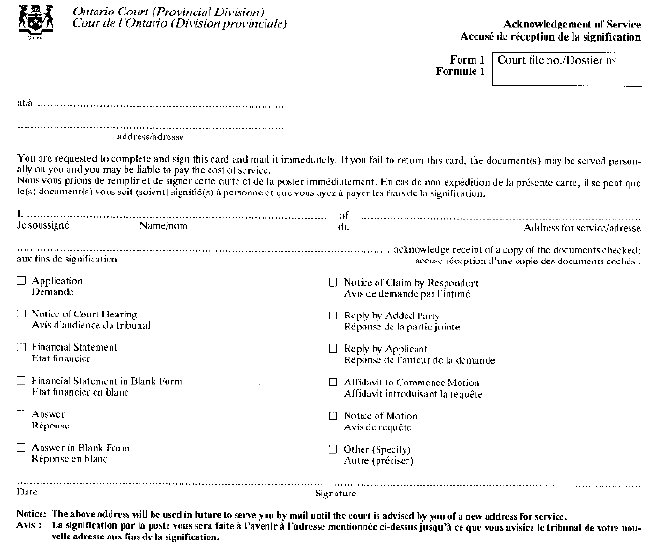
R.R.O. 1990, Reg. 199, Form 1.
FORM 2
FORMULE 2
Courts of Justice Act
Loi sur les tribunaux judiciaires
ADVERTISEMENT
ANNONCE
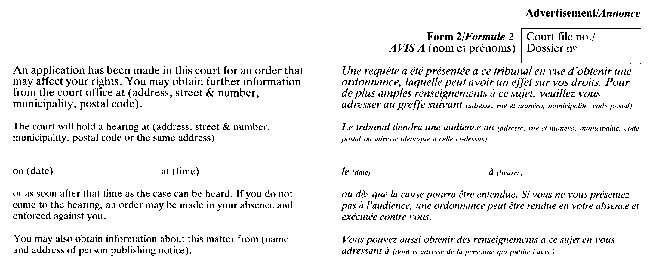
R.R.O. 1990, Reg. 199, Form 2.
FORM 3
Courts of Justice Act
WARRANT FOR ARREST
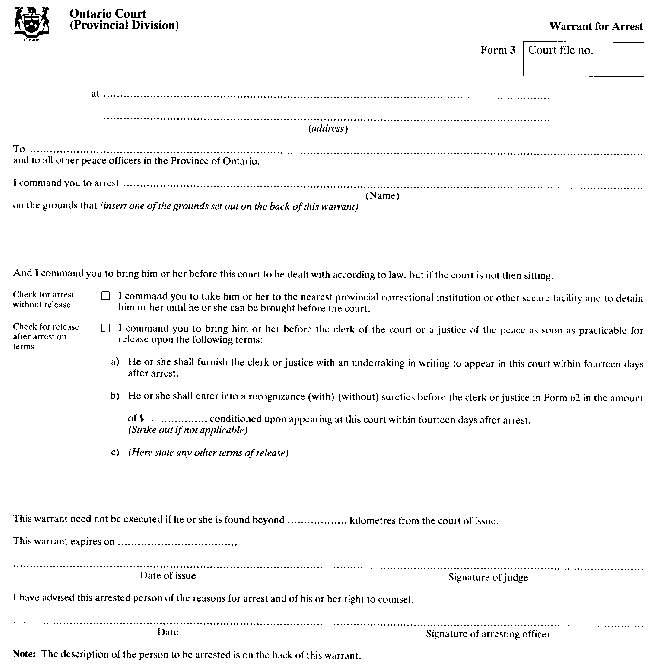
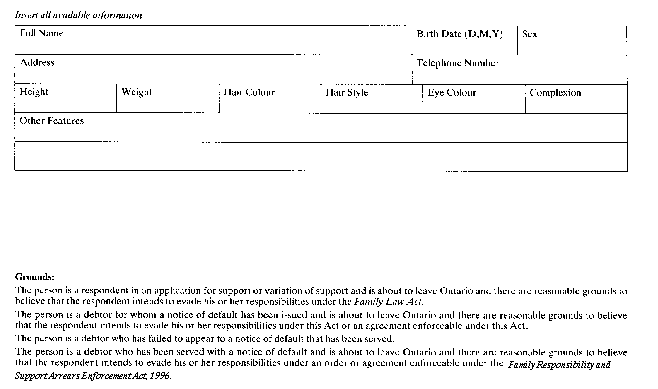
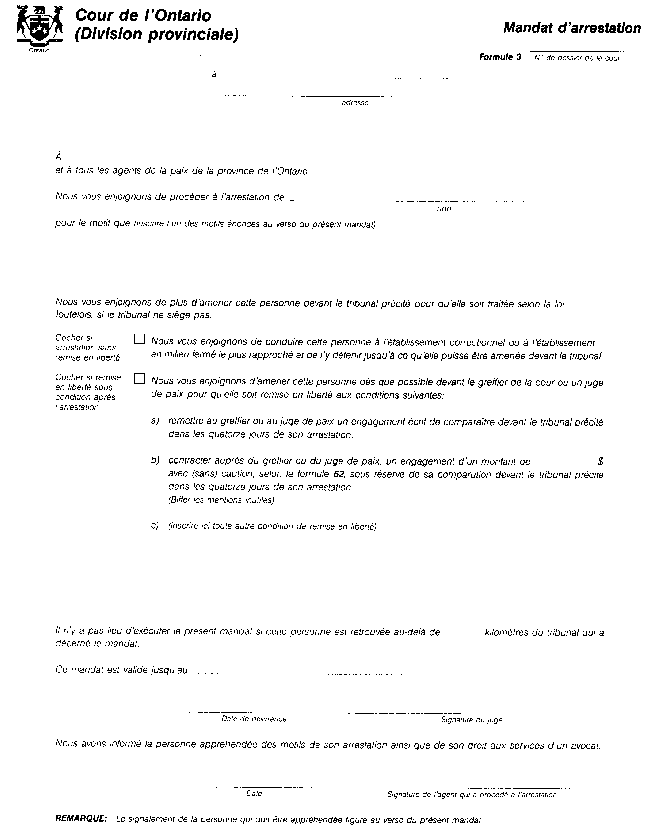
FORMULE 3
Loi sur les tribunaux judiciaires
MANDAT D’ARRESTATION
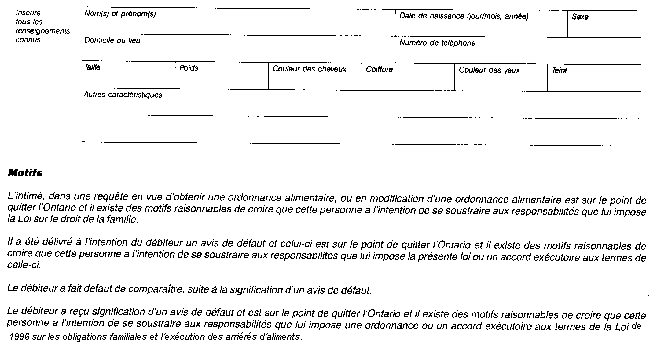
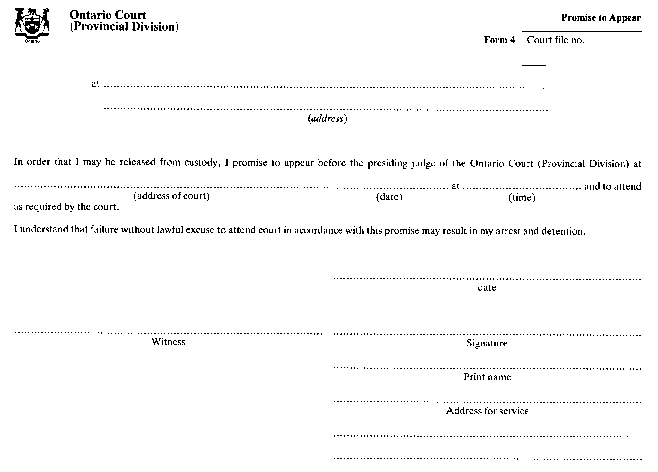
R.R.O. 1990, Reg. 199, Form 3; O. Reg. 293/98, s. 9.
FORM 4
Courts of Justice Act
PROMISE TO APPEAR
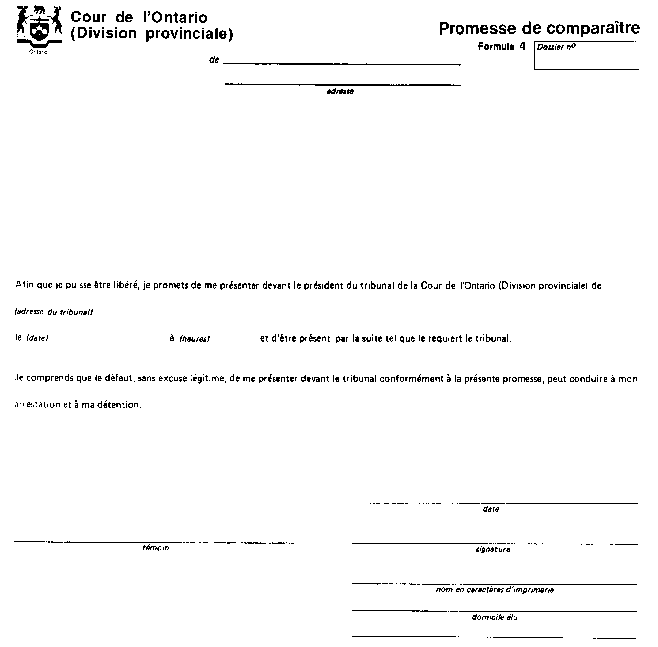
FORMULE 4
Loi sur les tribunaux judiciaires
PROMESSE DE COMPARAÎTRE
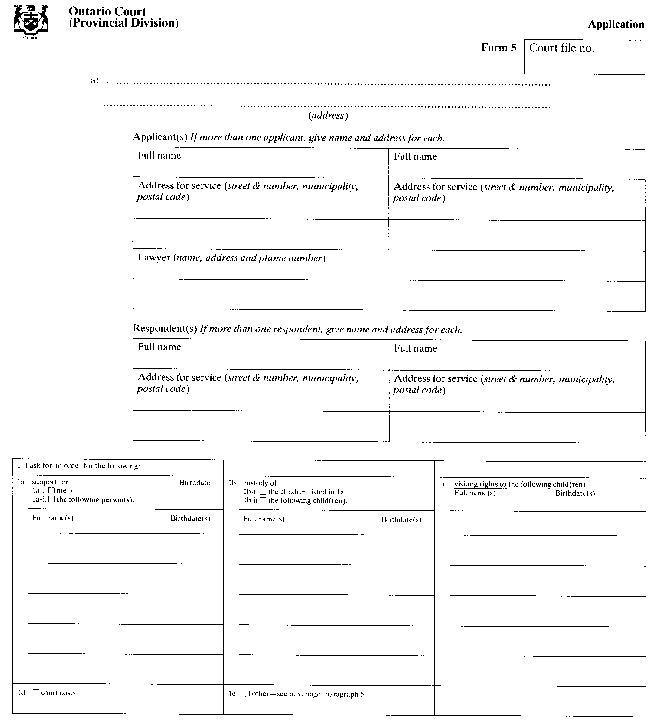
R.R.O. 1990, Reg. 199, Form 4.
FORM 5
Courts of Justice Act
APPLICATION
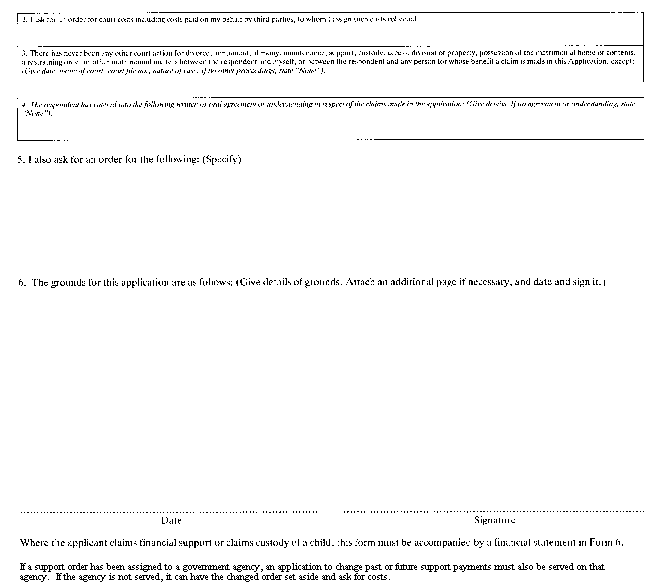
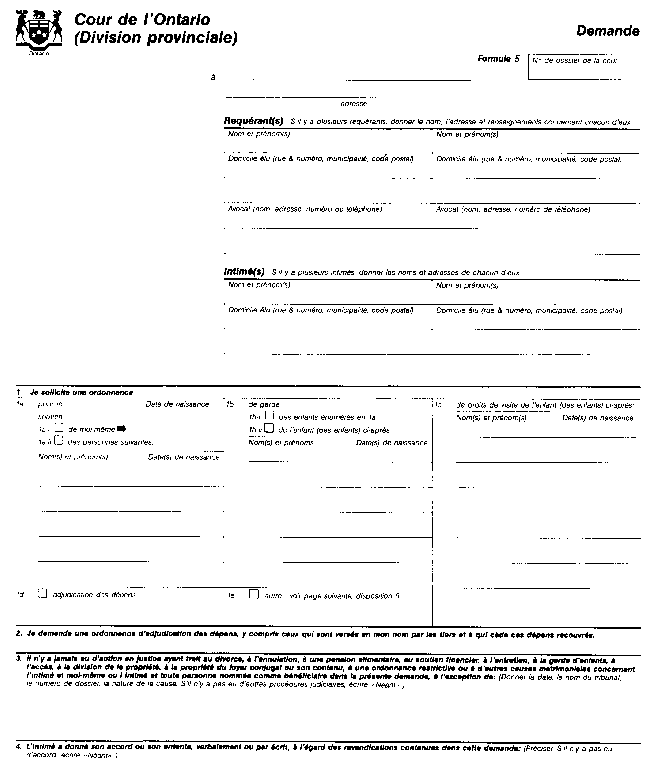
FORMULE 5
Loi sur les tribunaux judiciaires
DEMANDE
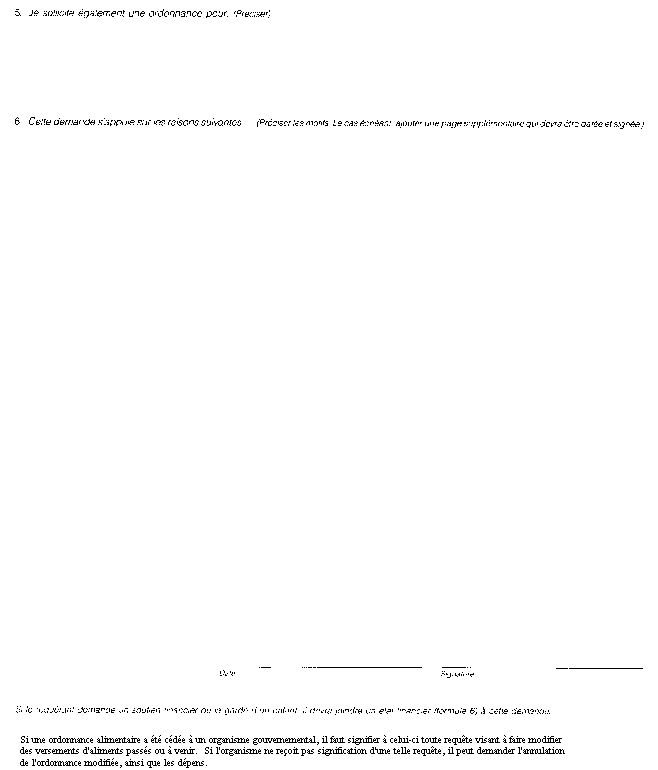
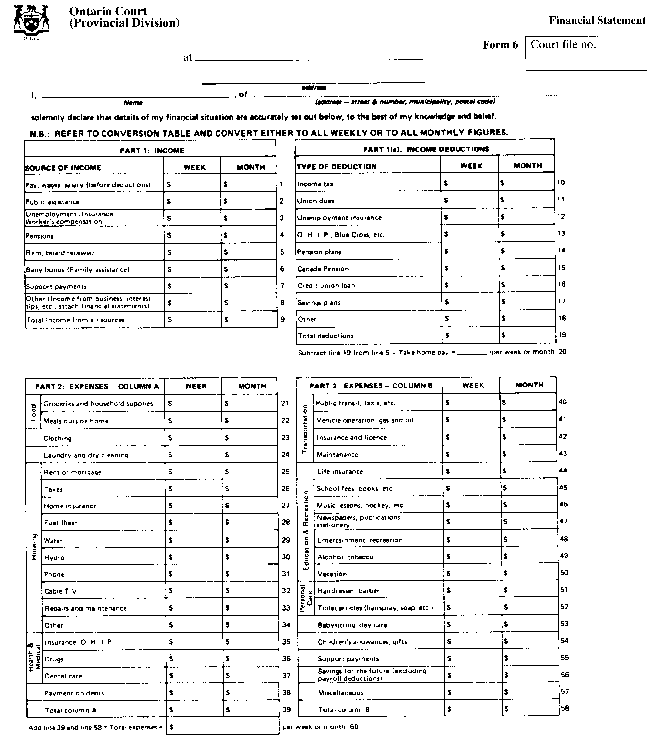
R.R.O. 1990, Reg. 199, Form 5; O. Reg. 428/97, s. 2 (1, 2).
FORM 6
Courts of Justice Act
FINANCIAL STATEMENT
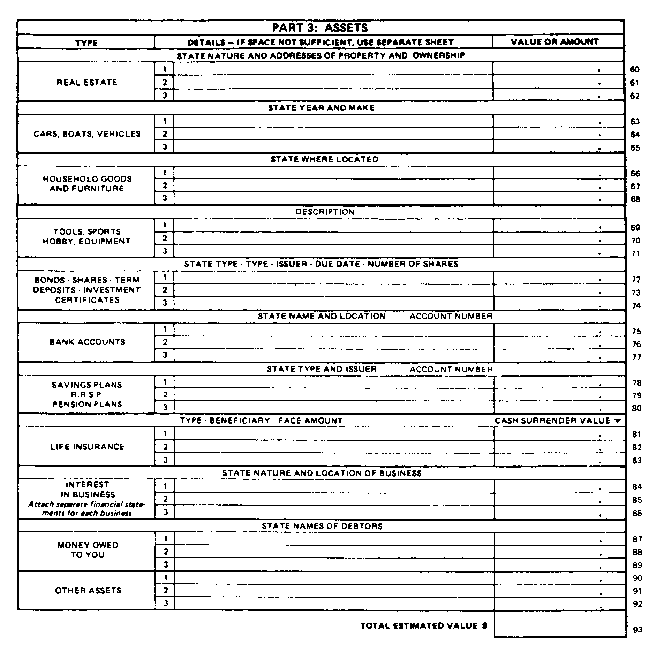
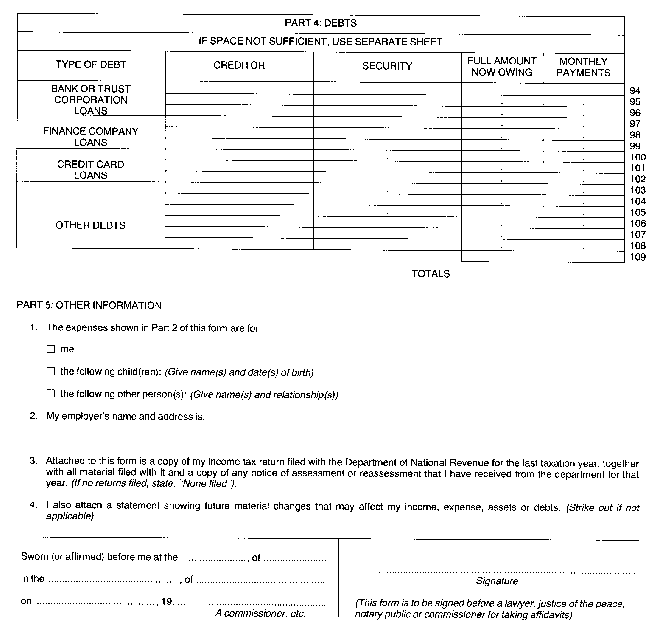
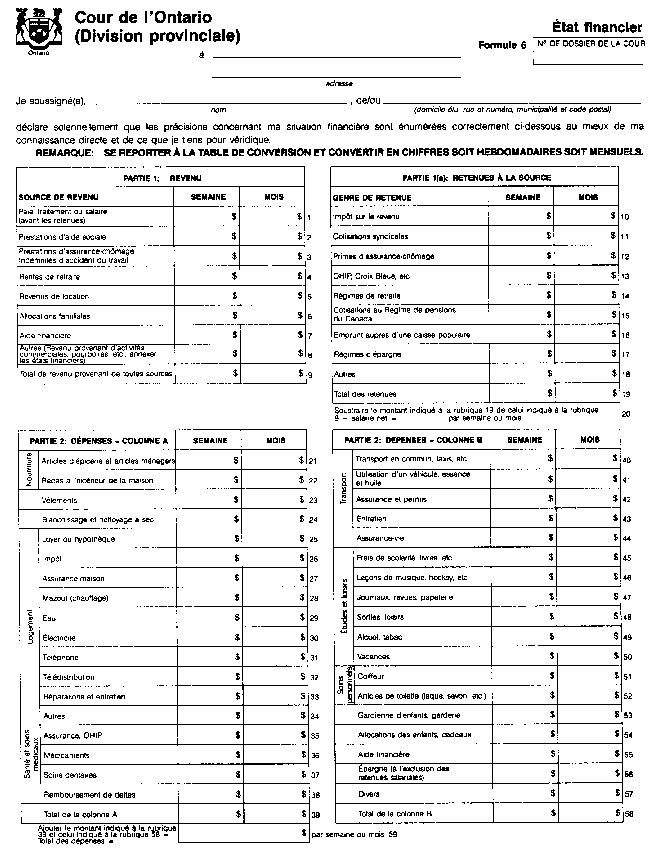
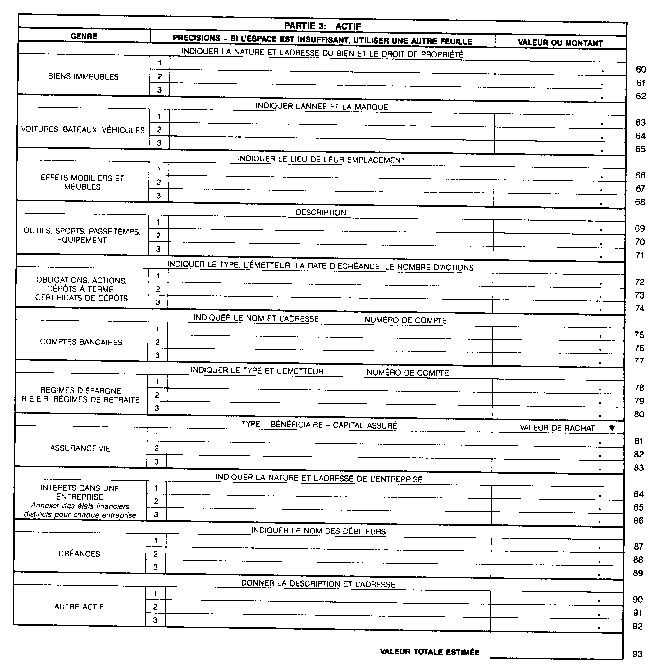
FORMULE 6
Loi sur les tribunaux judiciaires
ÉTAT FINANCIER
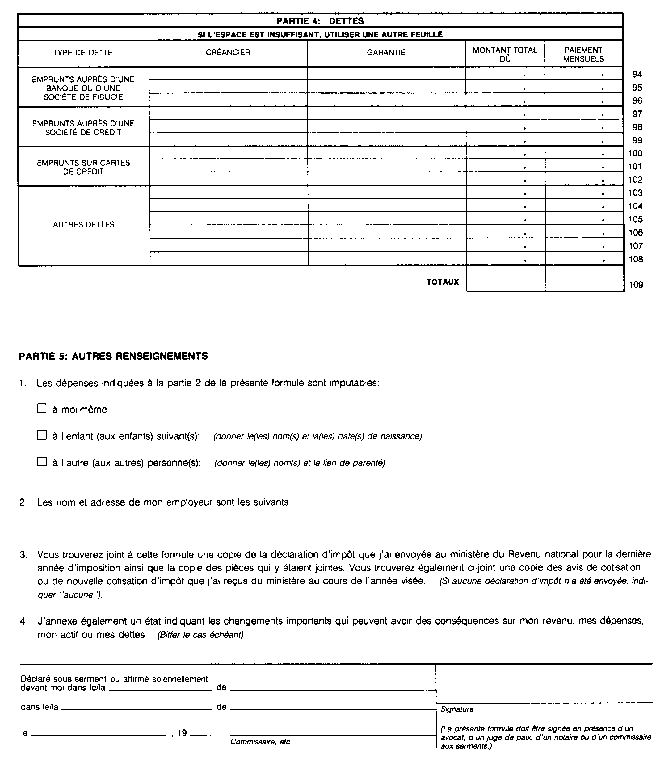
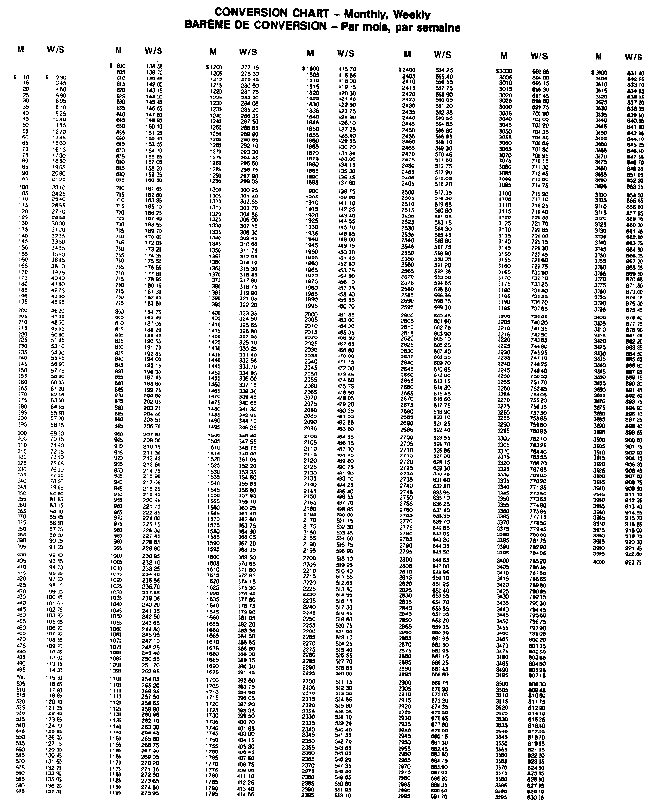
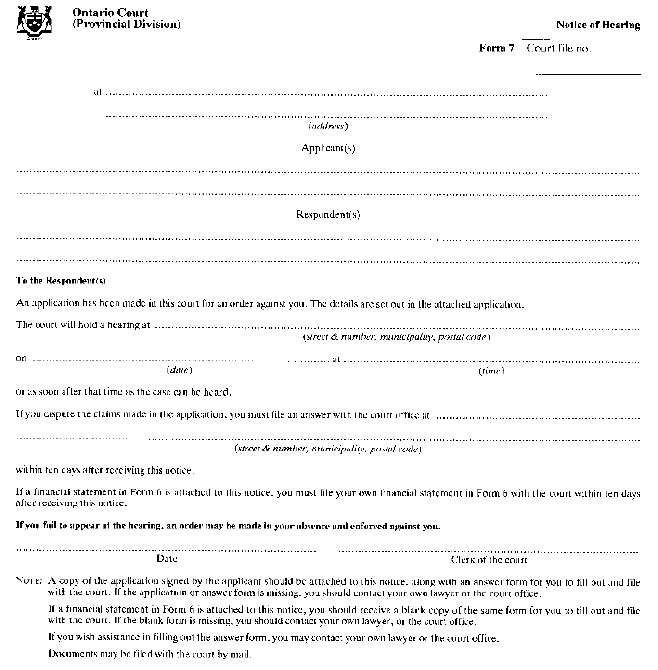
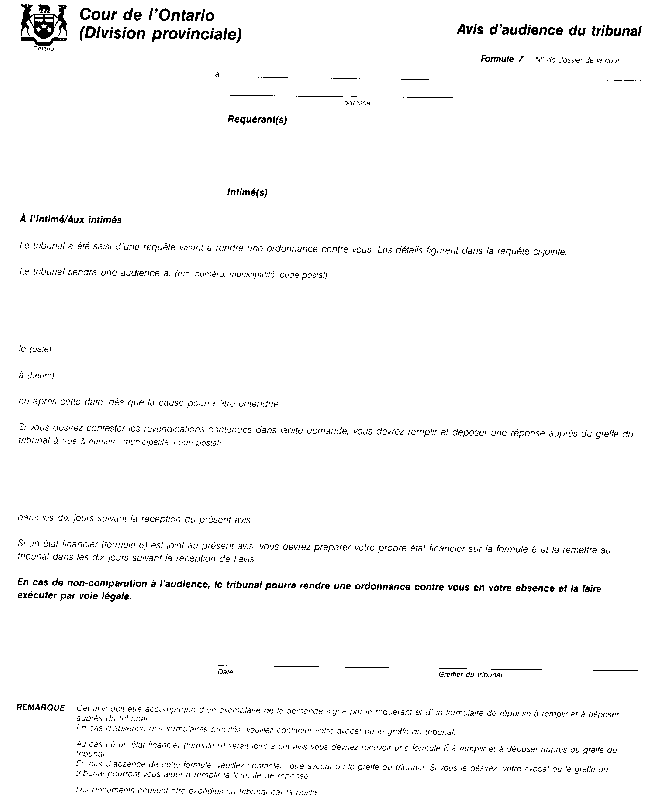
R.R.O. 1990, Reg. 199, Form 6.
FORM 7
Courts of Justice Act
NOTICE OF HEARING
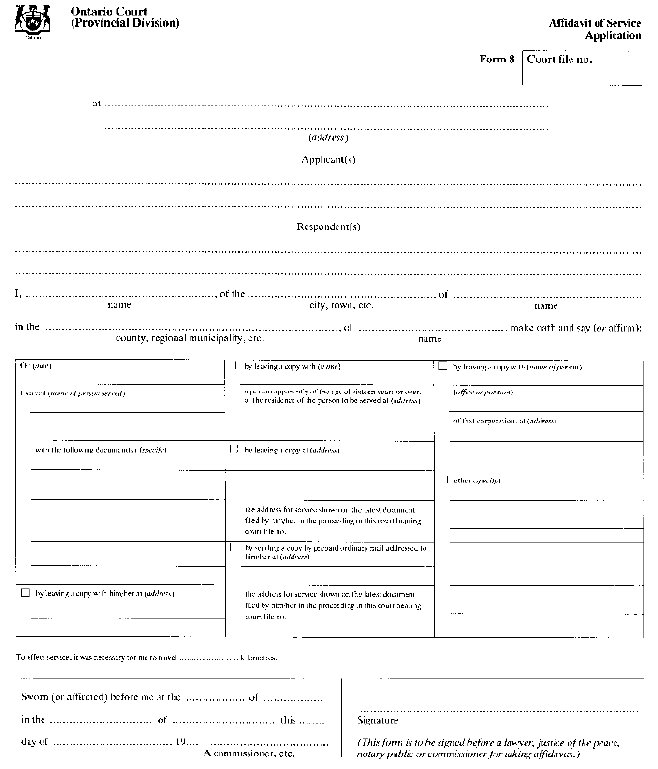
FORMULE 7
Loi sur les tribunaux judiciaires
AVIS D’AUDIENCE DU TRIBUNAL
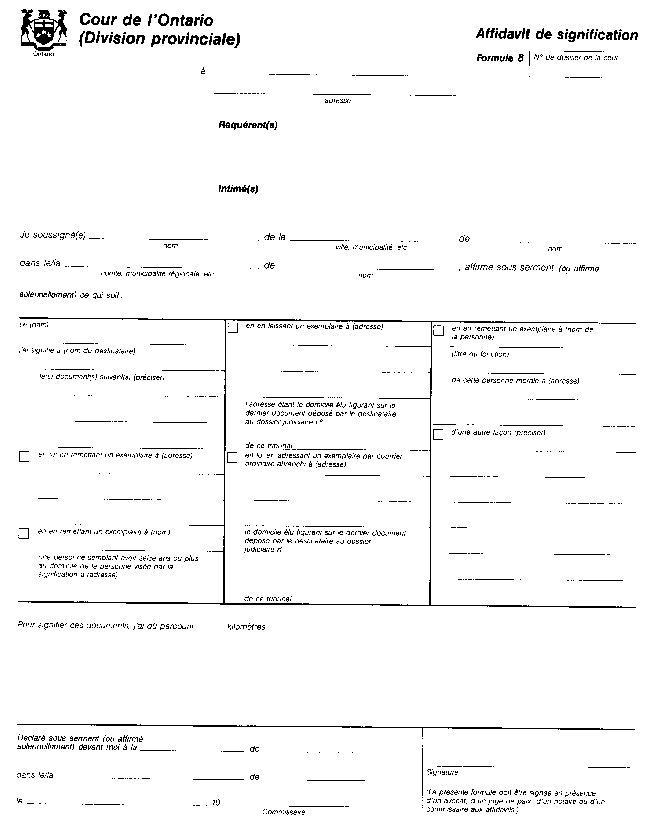
R.R.O. 1990, Reg. 199, Form 7.
FORM 8
Courts of Justice Act
AFFIDAVIT OF SERVICE
APPLICATION
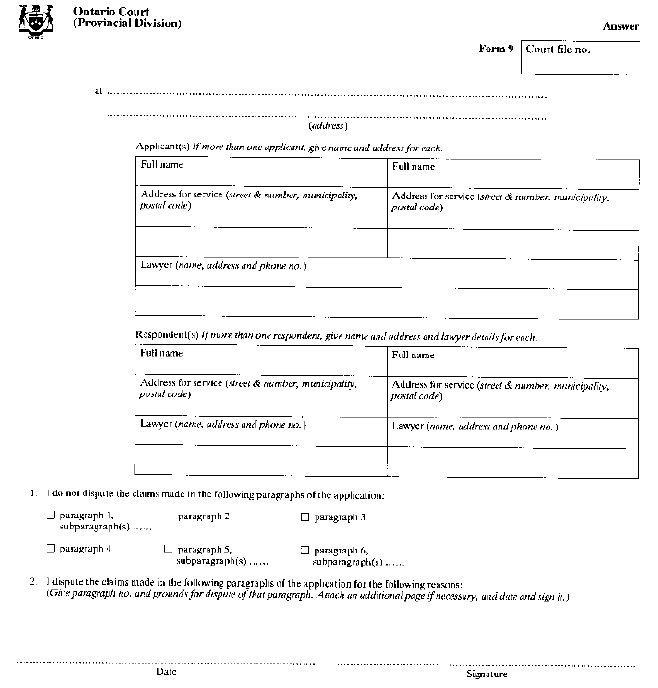
FORMULE 8
Loi sur les tribunaux judiciaires
AFFIDAVIT DE SIGNIFICATION
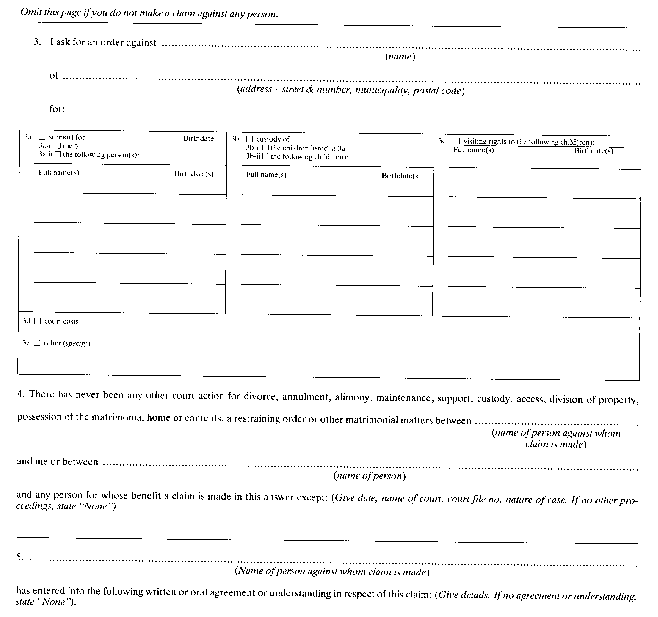
R.R.O. 1990, Reg. 199, Form 8.
FORM 9
Courts of Justice Act
ANSWER
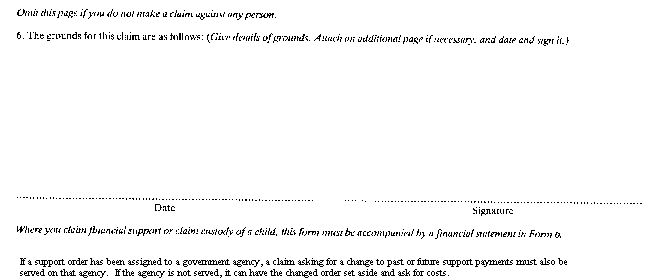
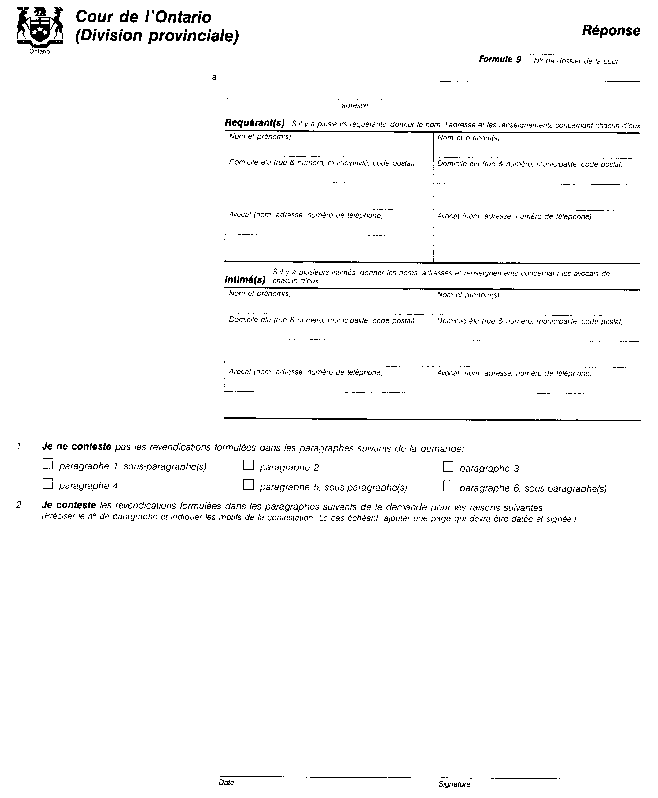
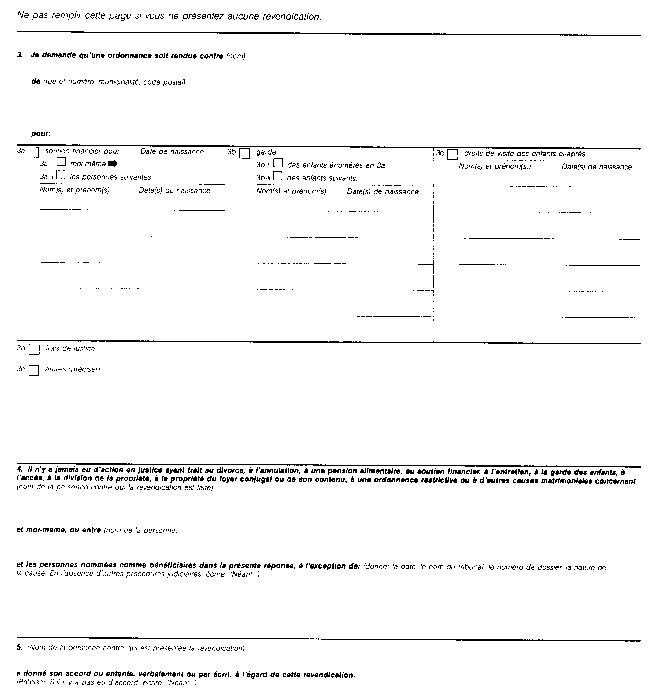
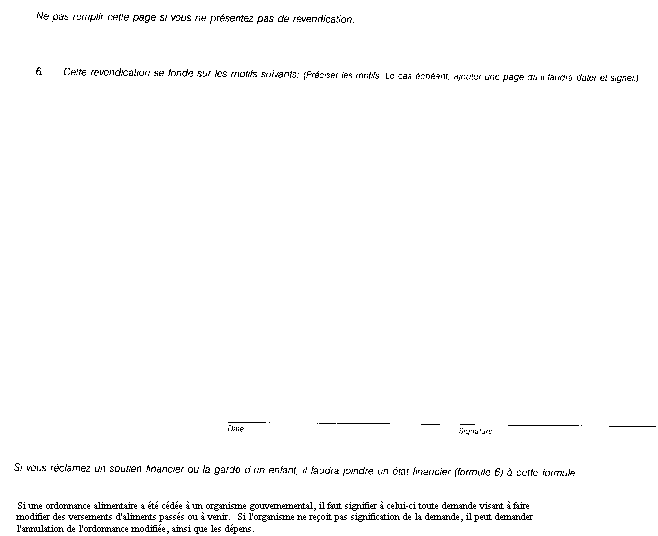
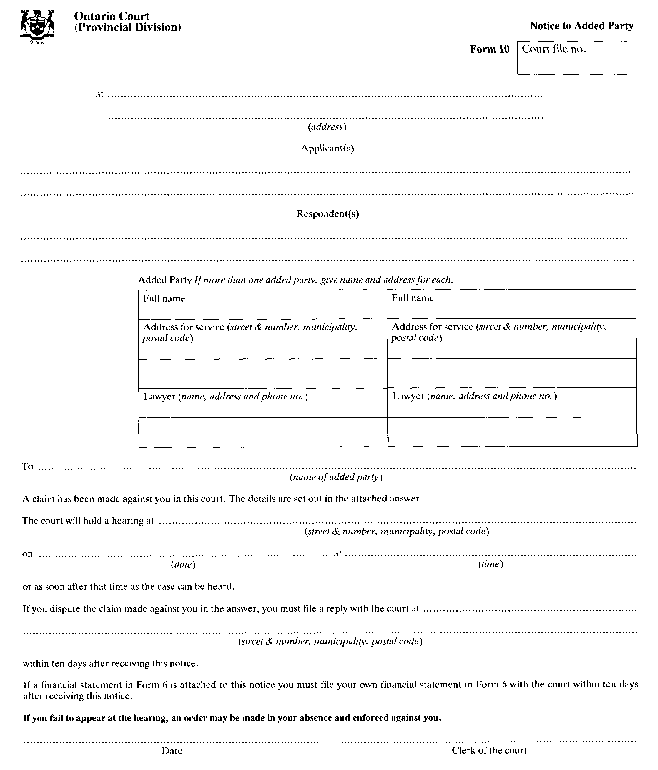
FORMULE 9
Loi sur les tribunaux judiciaires
RÉPONSE

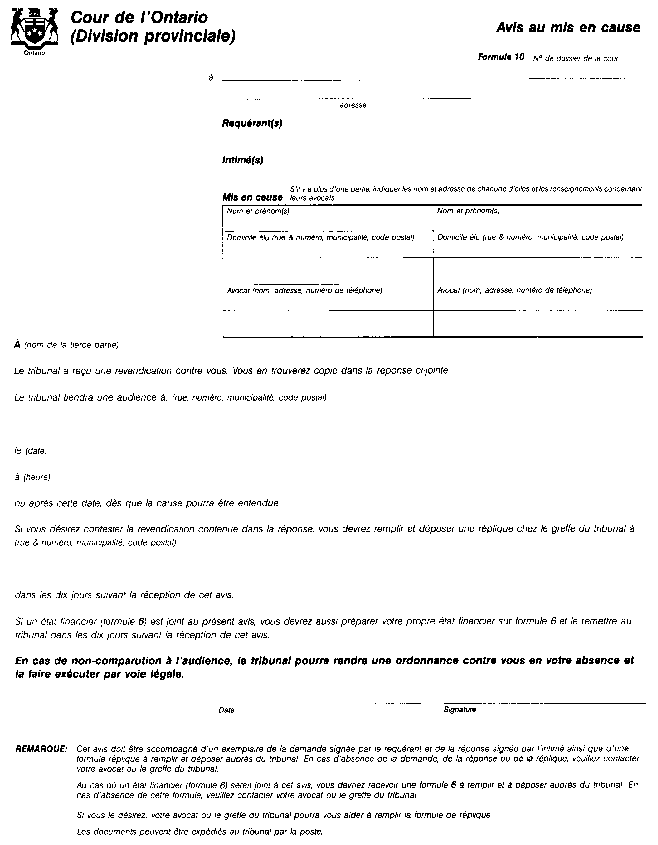
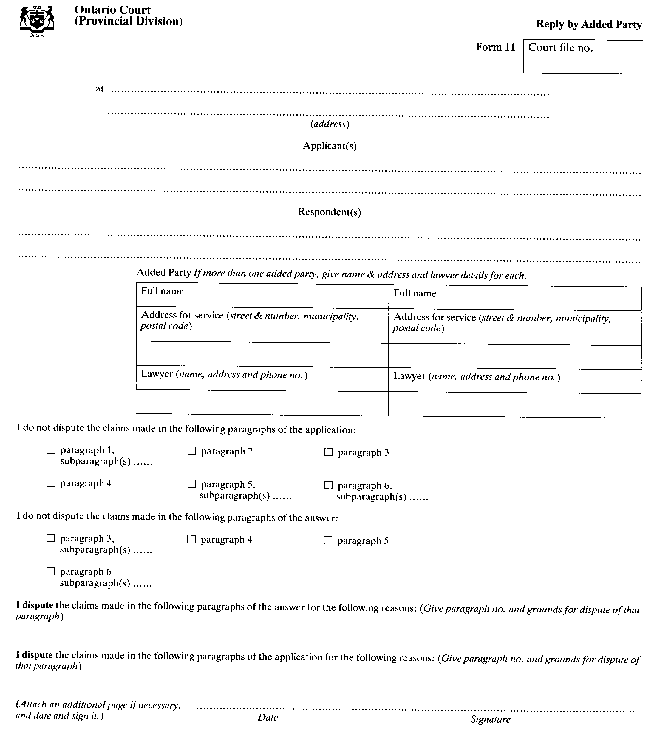
R.R.O. 1990, Reg. 199, Form 9; O. Reg. 428/97, s. 3 (1, 2).
FORM 10
Courts of Justice Act
NOTICE TO ADDED PARTY
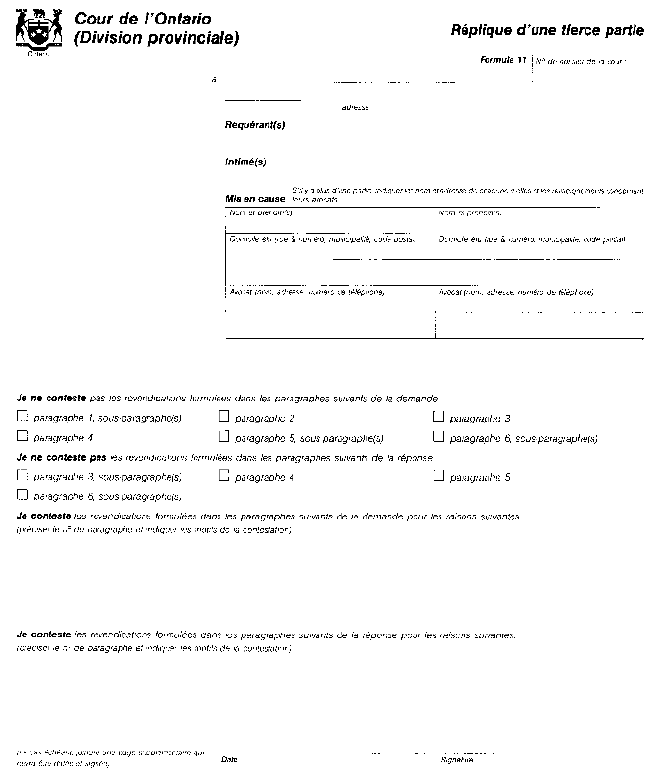
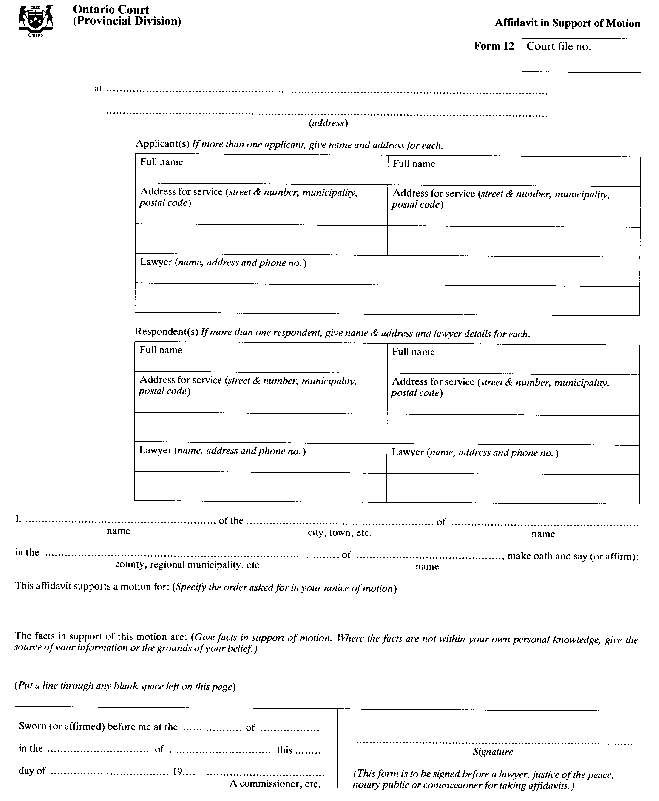
FORMULE 10
Loi sur les tribunaux judiciaires
AVIS AU MIS EN CAUSE
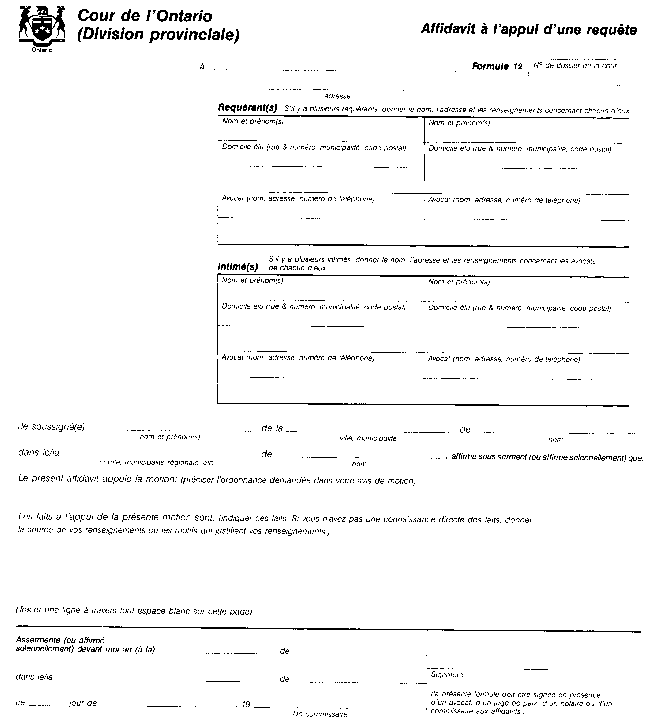
R.R.O. 1990, Reg. 199, Form 10.
FORM 11
Courts of Justice Act
REPLY BY ADDED PARTY
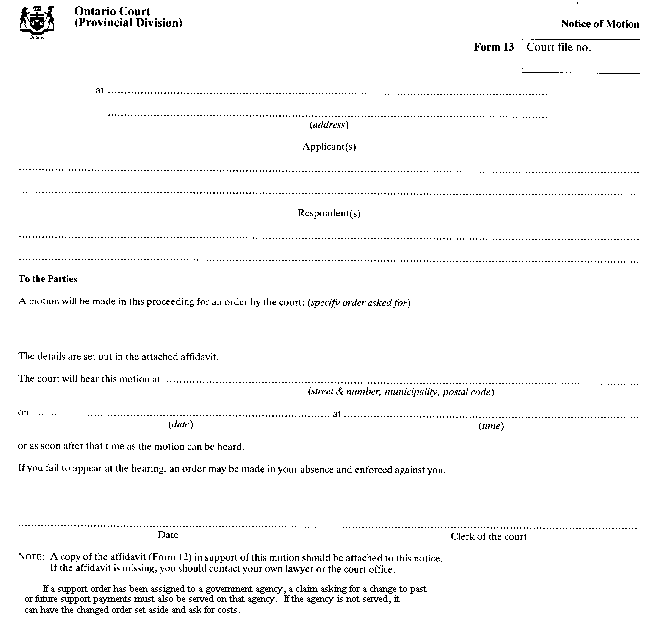
FORMULE 11
Loi sur les tribunaux judiciaires
RÉPLIQUE D’UNE TIERCE PARTIE
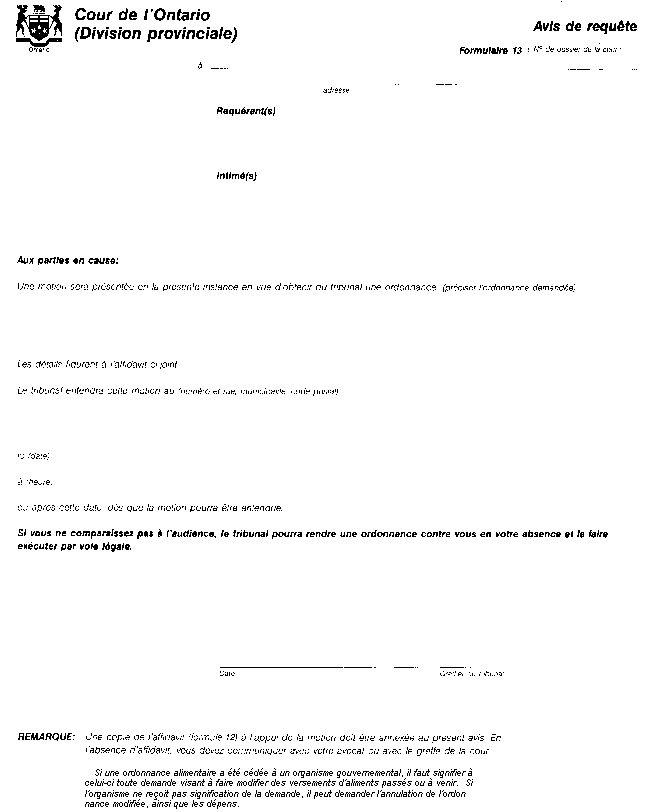
R.R.O. 1990, Reg. 199, Form 11.
FORM 12
Courts of Justice Act
AFFIDAVIT IN SUPPORT OF MOTION
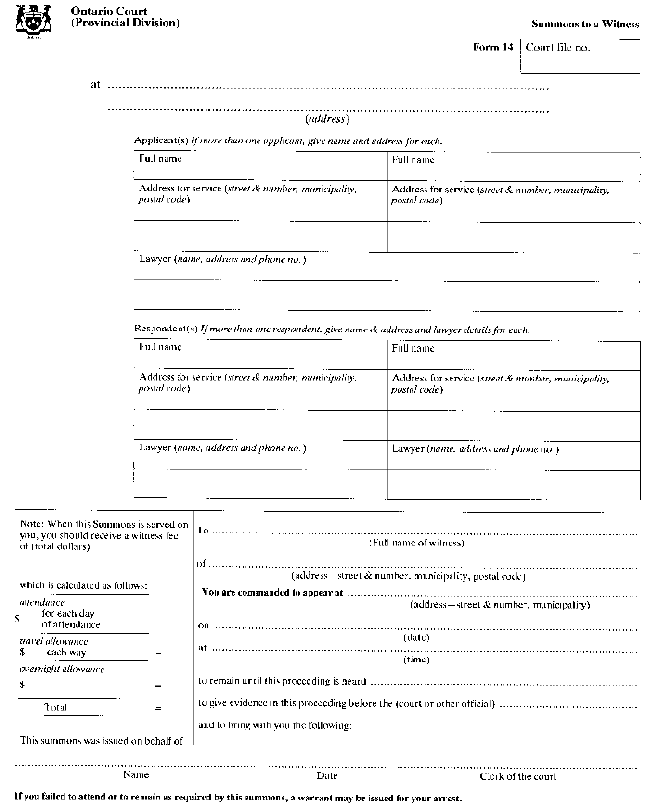
FORMULE 12
Loi sur les tribunaux judiciaires
AFFIDAVIT À L’APPUI D’UNE REQUÊTE
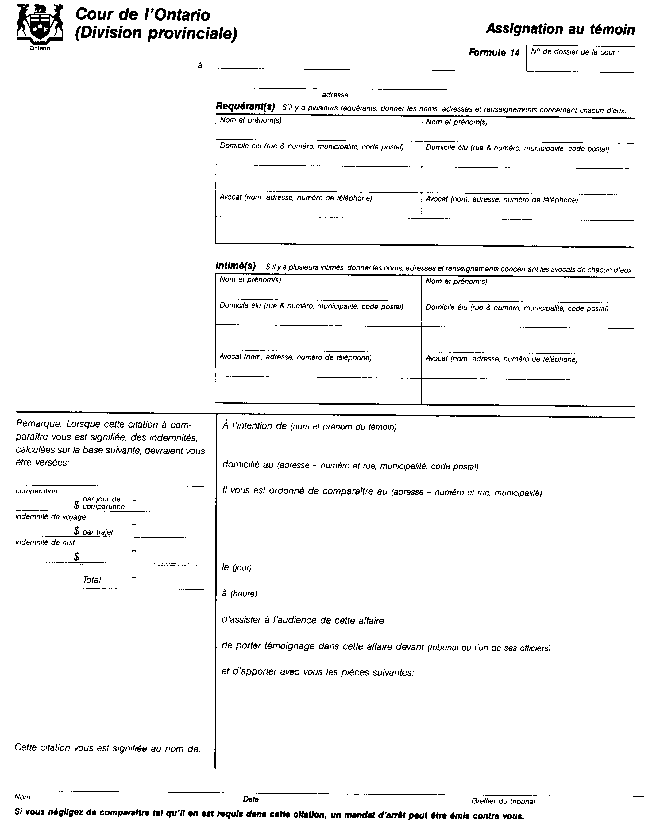
R.R.O. 1990, Reg. 199, Form 12.
FORM 13
Courts of Justice Act
NOTICE OF MOTION
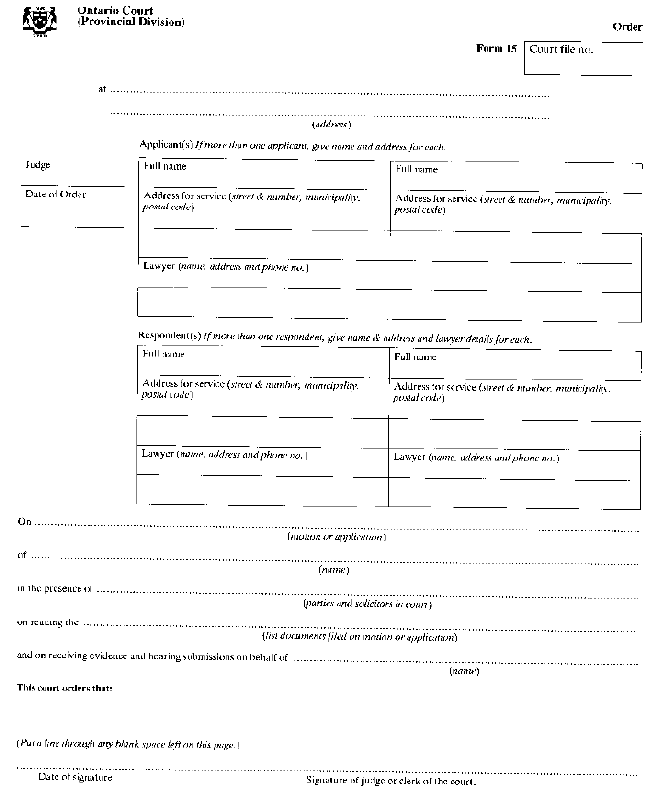
FORMULE 13
Loi sur les tribunaux judiciaires
AVIS DE REQUÊTE
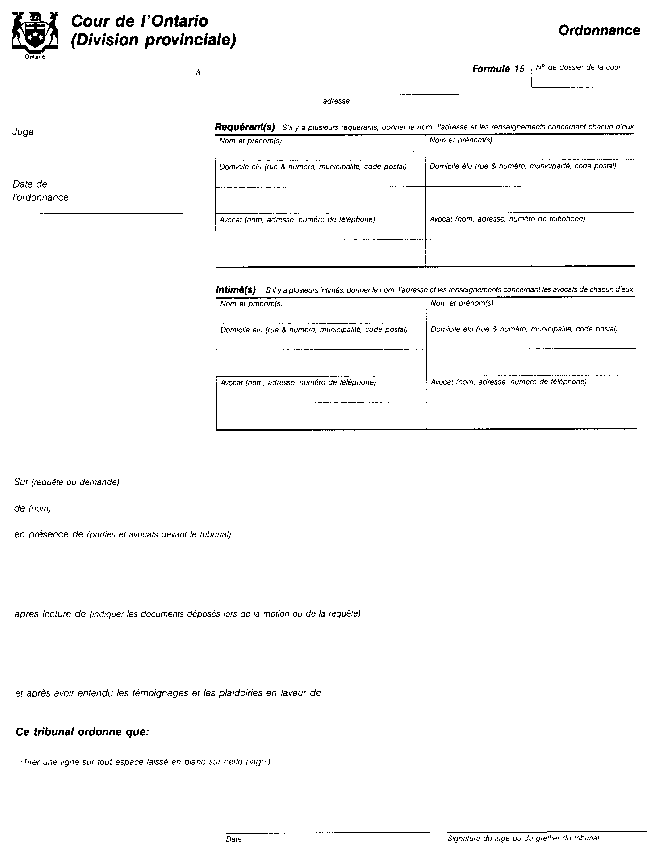
R.R.O. 1990, Reg. 199, Form 13; O. Reg. 216/98, s. 2.
FORM 14
Courts of Justice Act
SUMMONS TO A WITNESS
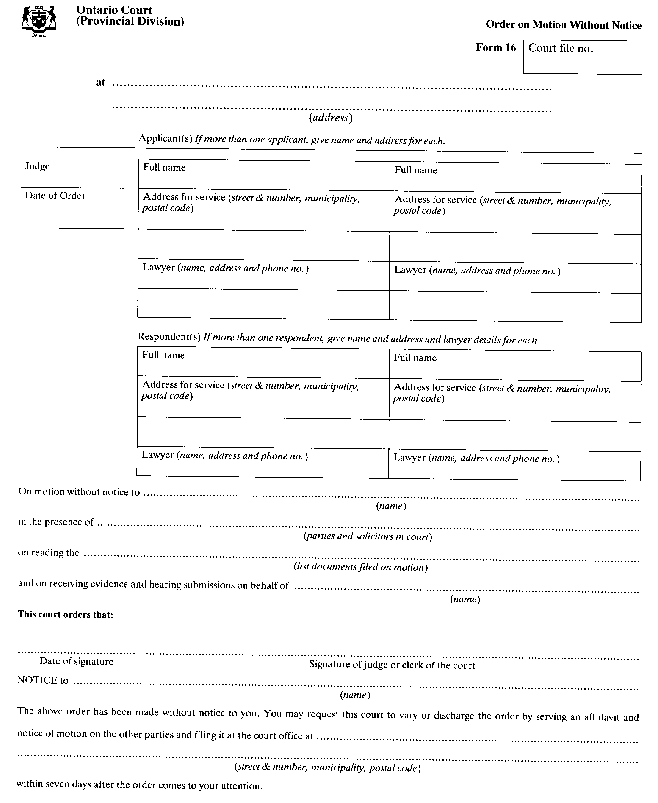
FORMULE 14
Loi sur les tribunaux judiciaires
ASSIGNATION AU TÉMOIN
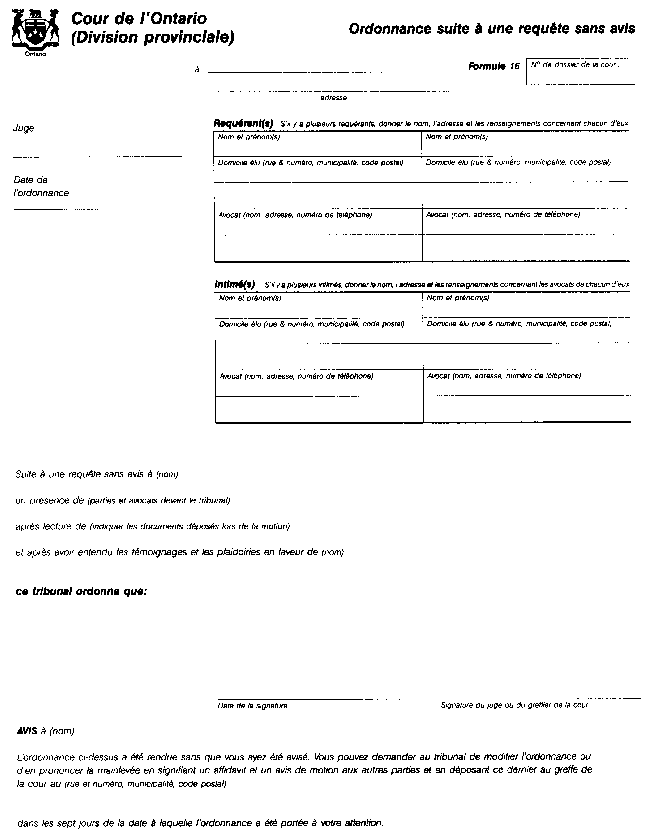
R.R.O. 1990, Reg. 199, Form 14.
FORM 15
Courts of Justice Act
ORDER
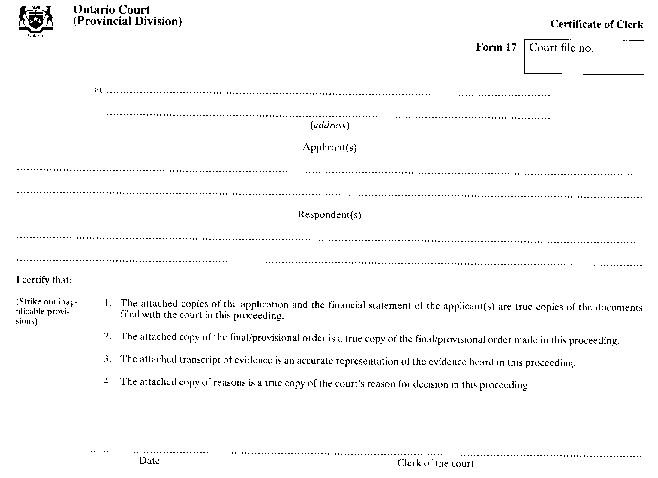
FORMULE 15
Loi sur les tribunaux judiciaires
ORDONNANCE
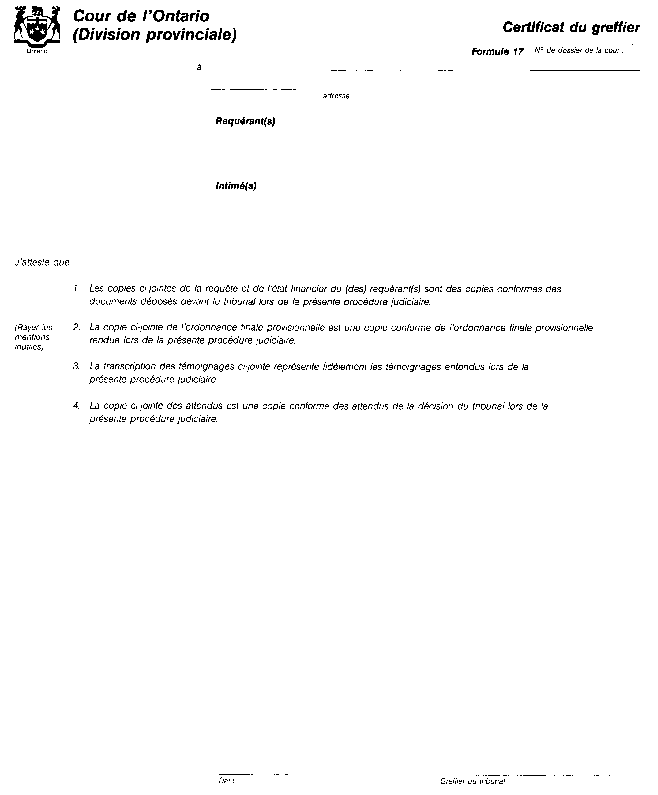
R.R.O. 1990, Reg. 199, Form 15.
FORM 15.1 REVOKED: O. REG. 293/98, S. 10.
FORM 16
Courts of Justice Act
ORDER ON MOTION WITHOUT NOTICE
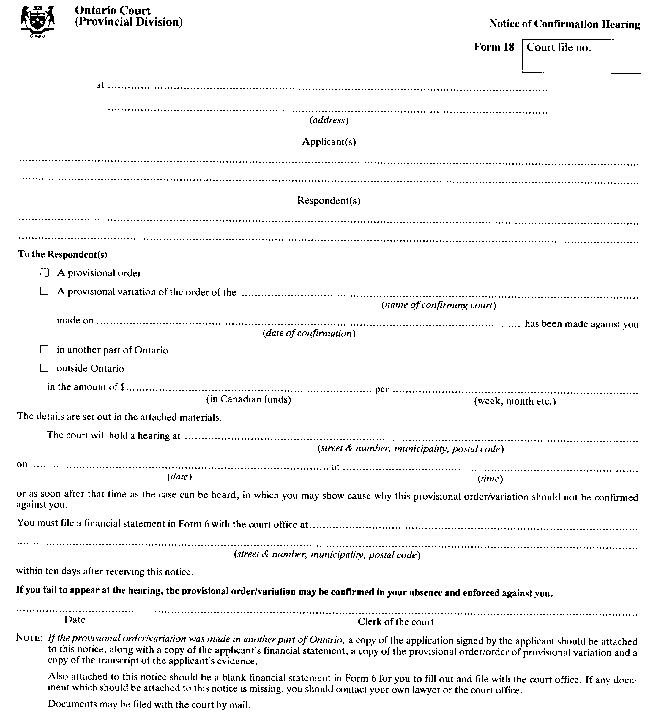
FORMULE 16
Loi sur les tribunaux judiciaires
ORDONNANCE SUITE À UNE REQUÊTE SANS AVIS
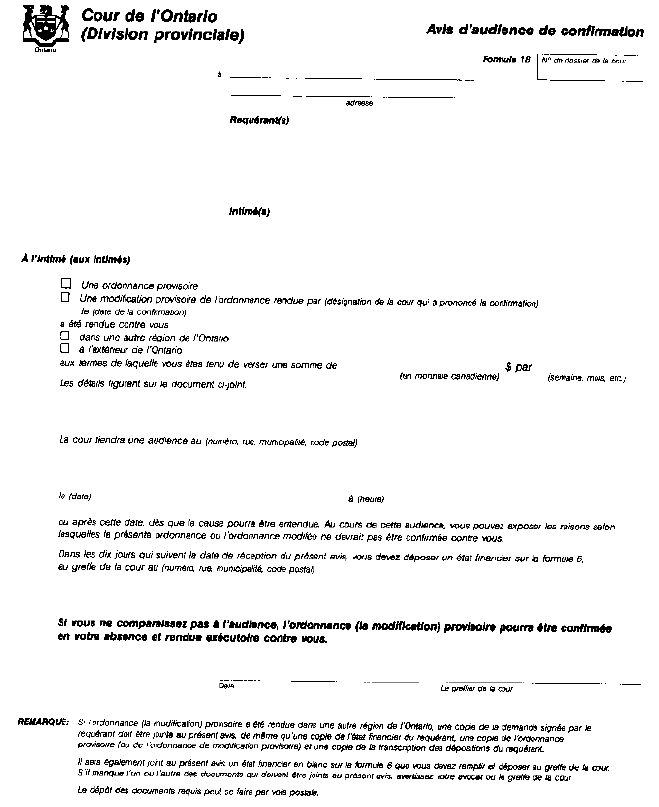
R.R.O. 1990, Reg. 199, Form 16.
FORM 17
Courts of Justice Act
CERTIFICATE OF CLERK
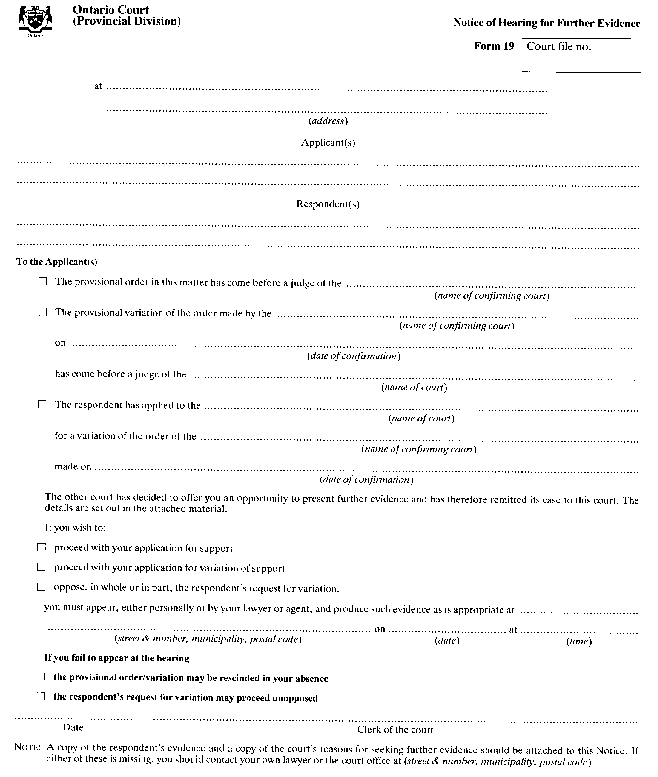
FORMULE 17
Loi sur les tribunaux judiciaires
CERTIFICAT DU GREFFIER
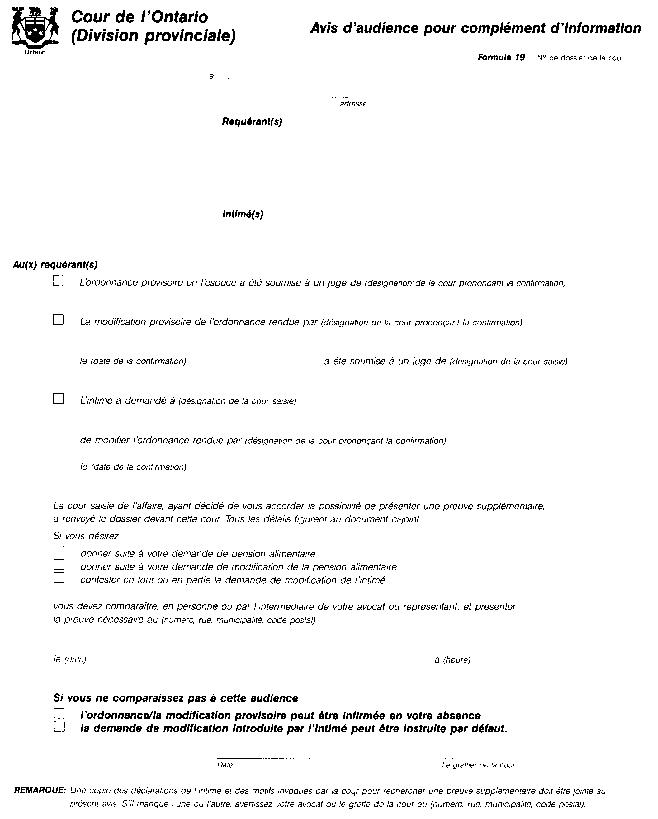
R.R.O. 1990, Reg. 199, Form 17.
FORM 18
Courts of Justice Act
NOTICE OF CONFIRMATION HEARING
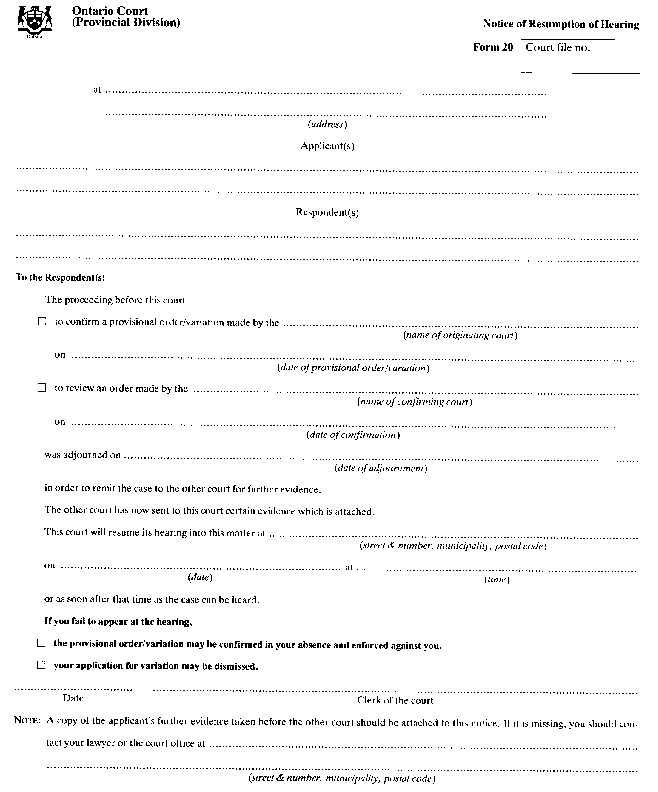
FORMULE 18
Loi sur les tribunaux judiciaires
AVIS D’AUDIENCE DE CONFIRMATION
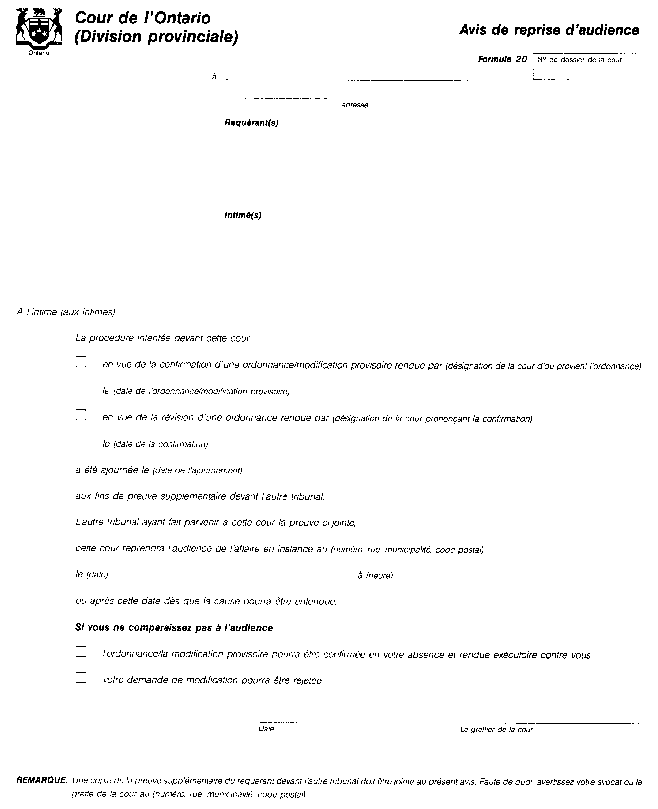
R.R.O. 1990, Reg. 199, Form 18.
FORM 19
Courts of Justice Act
NOTICE OF HEARING FOR FURTHER EVIDENCE
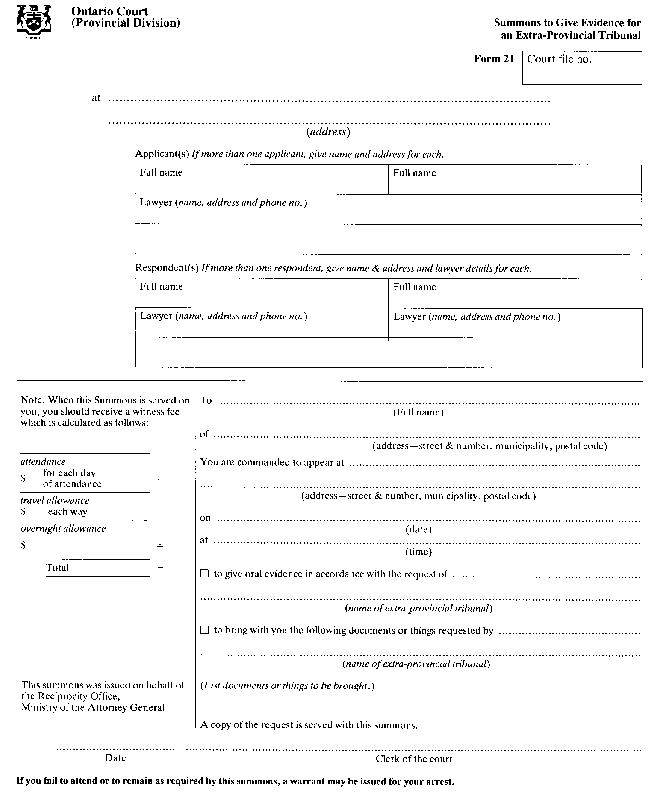
FORMULE 19
Loi sur les tribunaux judiciaires
AVIS D’AUDIENCE POUR COMPLÉMENT D’INFORMATION
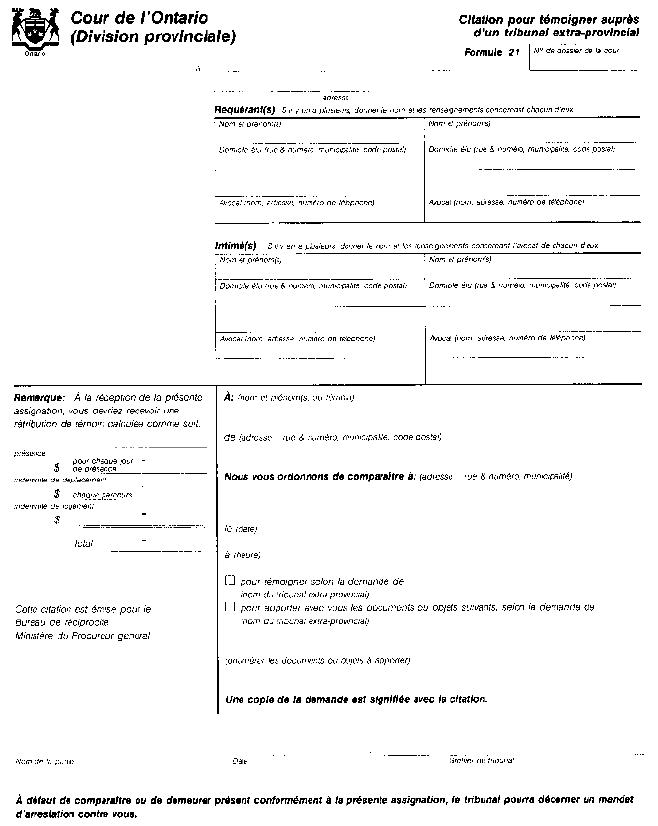
R.R.O. 1990, Reg. 199, Form 19.
FORM 20
Courts of Justice Act
NOTICE OF RESUMPTION OF HEARING
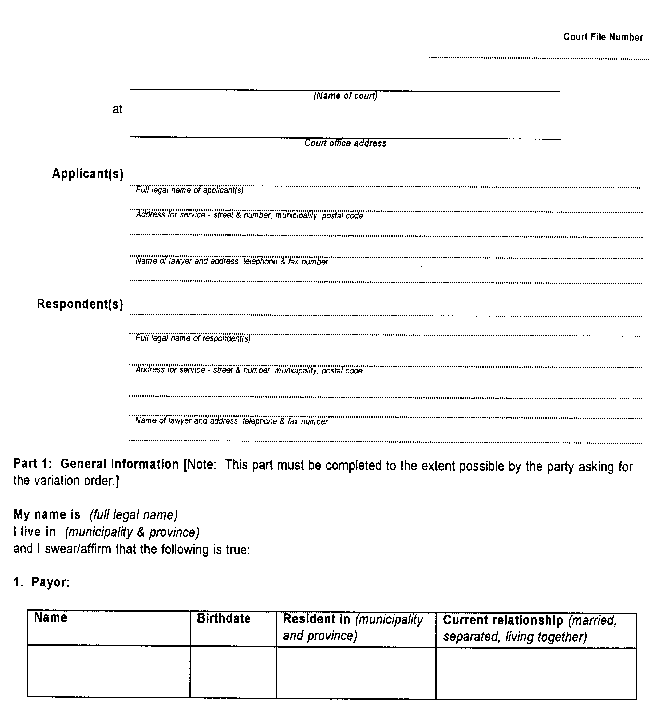
FORMULE 20
Loi sur les tribunaux judiciaires
AVIS DE REPRISE D’AUDIENCE
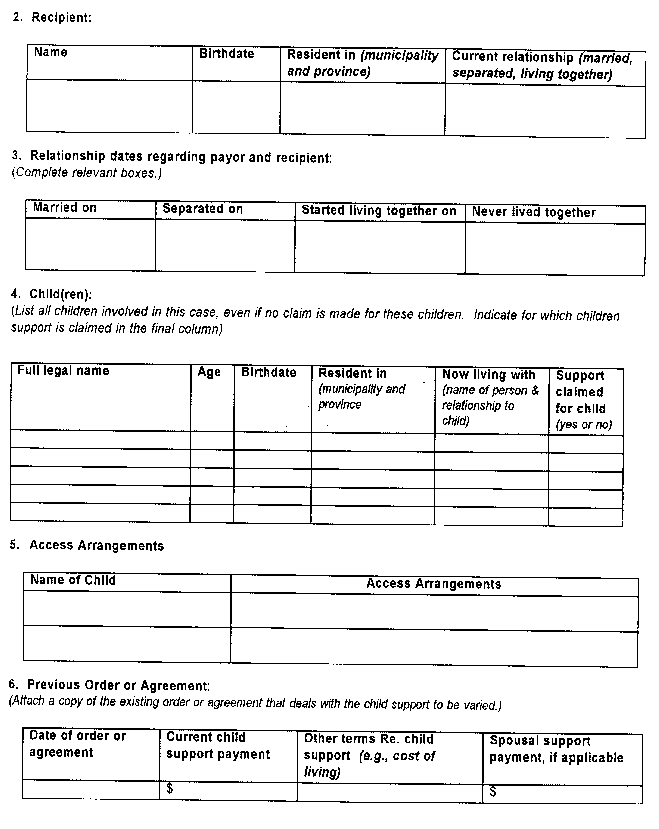
R.R.O. 1990, Reg. 199, Form 20.
FORM 21
Courts of Justice Act
SUMMONS TO GIVE EVIDENCE FOR
AN EXTRA-PROVINCIAL TRIBUNAL
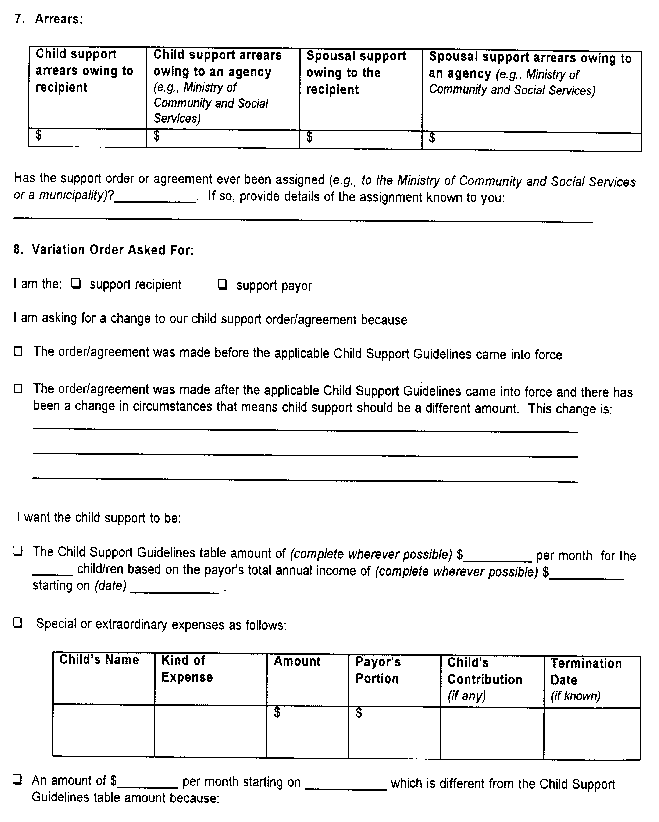
FORMULE 21
Loi sur les tribunaux judiciaires
CITATION POUR TÉMOIGNER AUPRÈS
D’UN TRIBUNAL EXTRA-PROVINCIAL
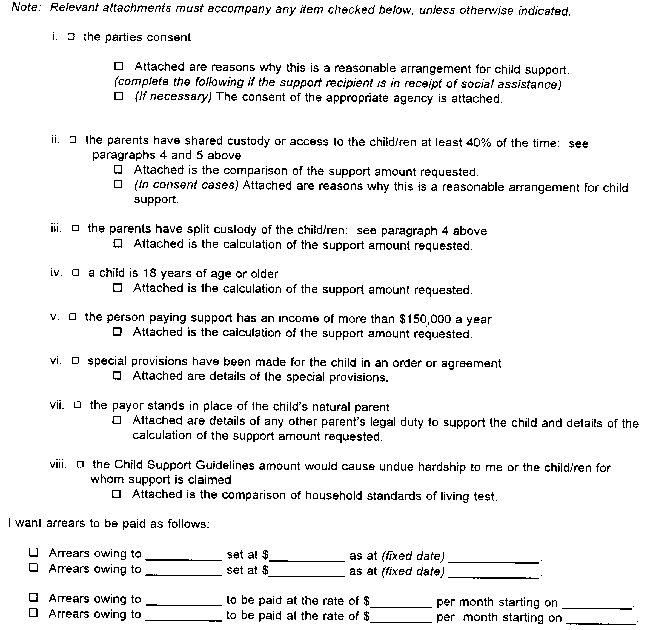
R.R.O. 1990, Reg. 199, Form 21.
FORM 21.1
Courts of Justice Act
VARIATION INFORMATION FORM

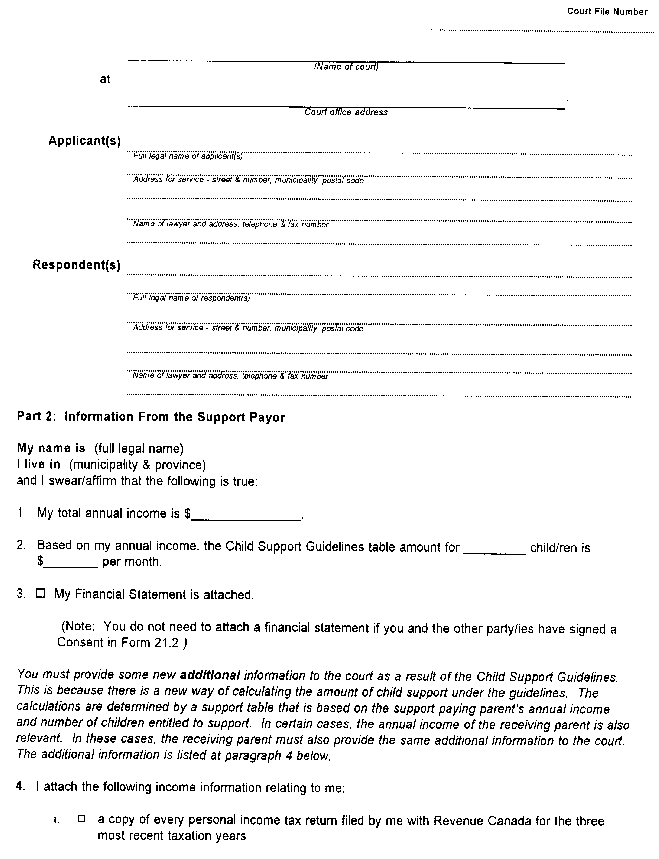
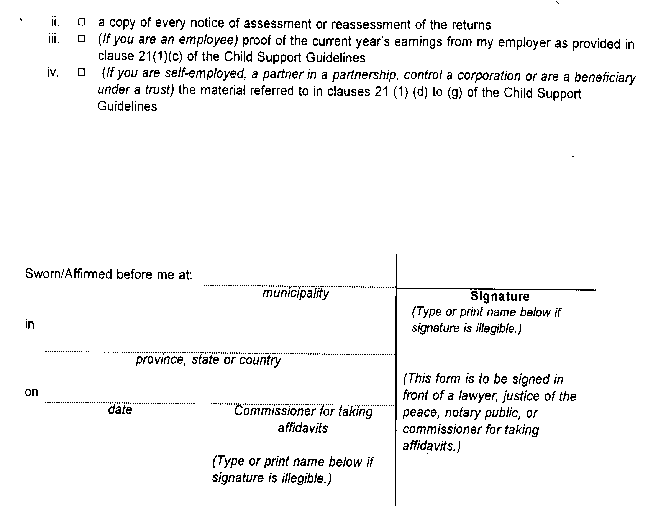
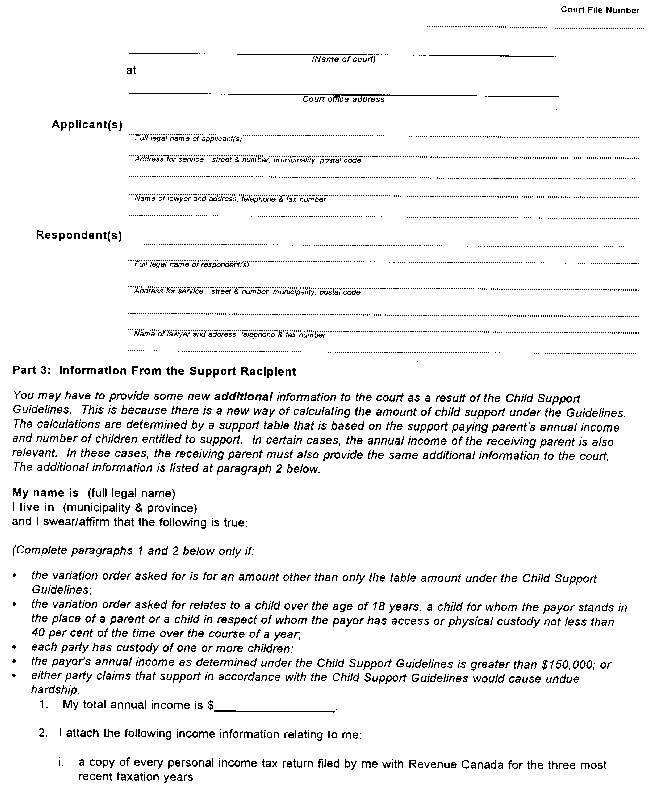
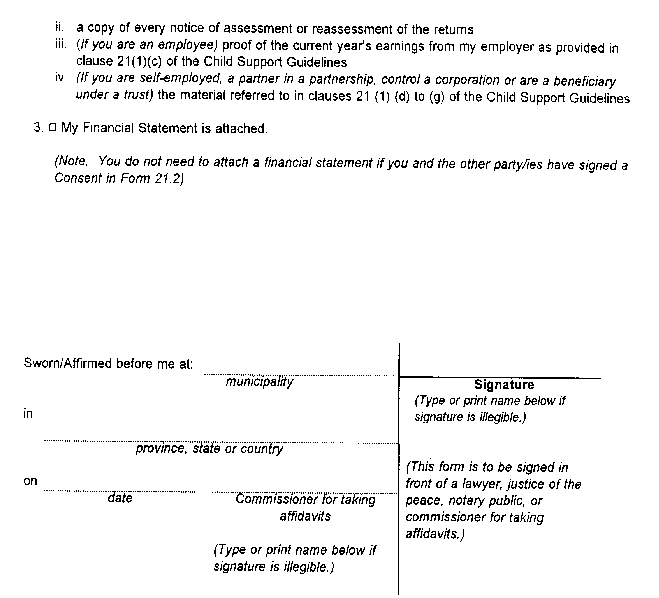
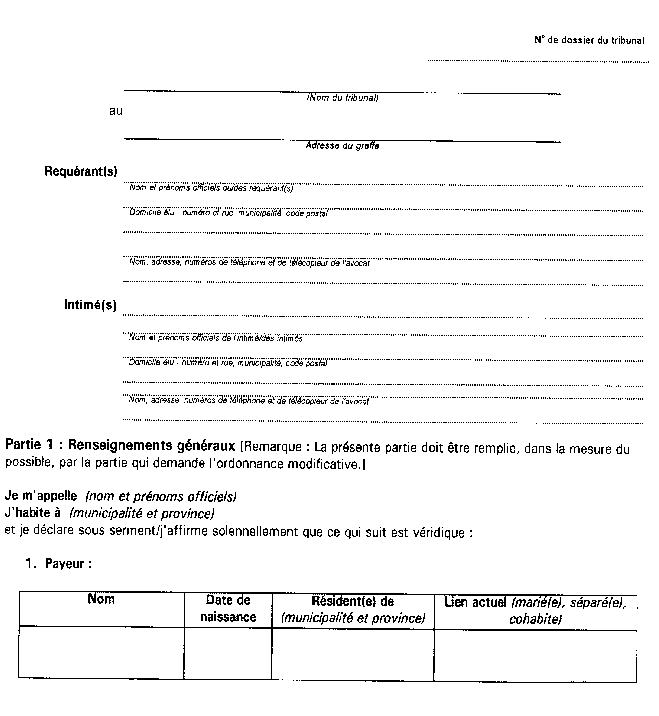
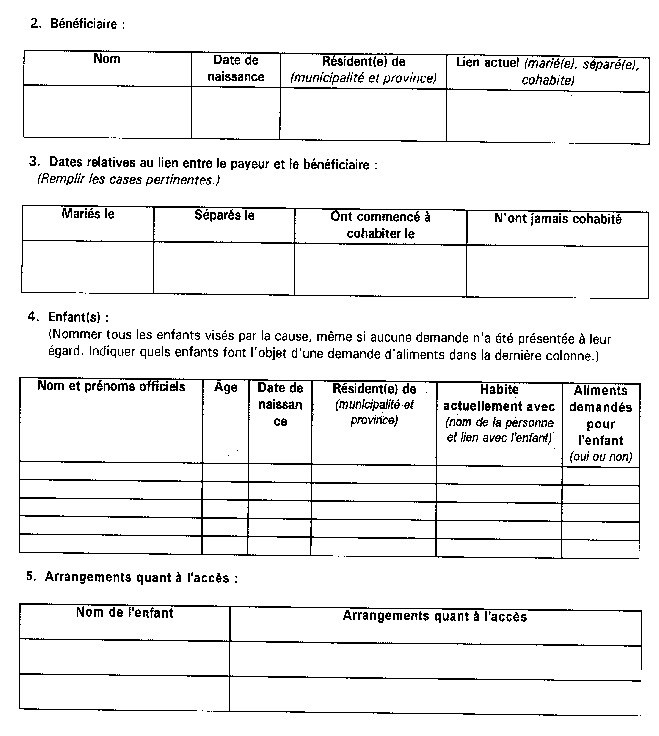
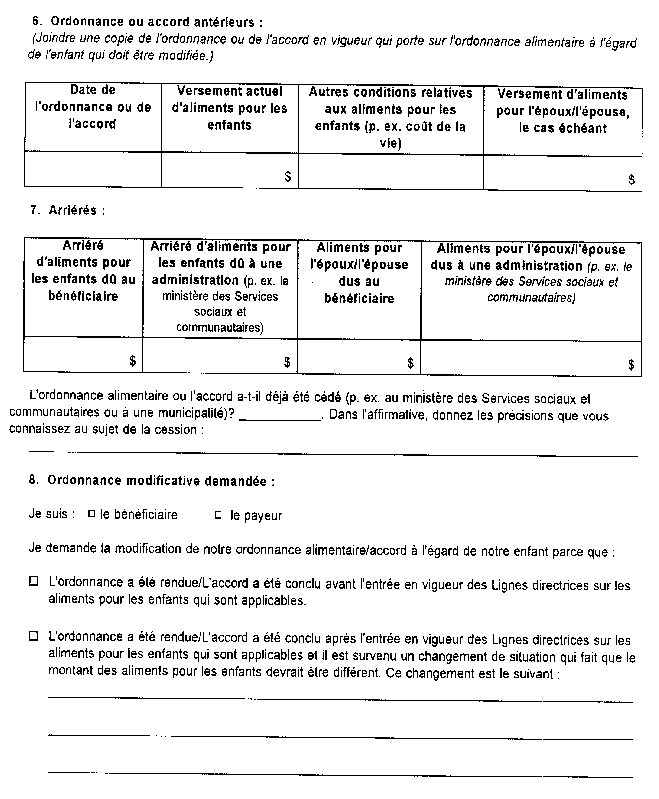
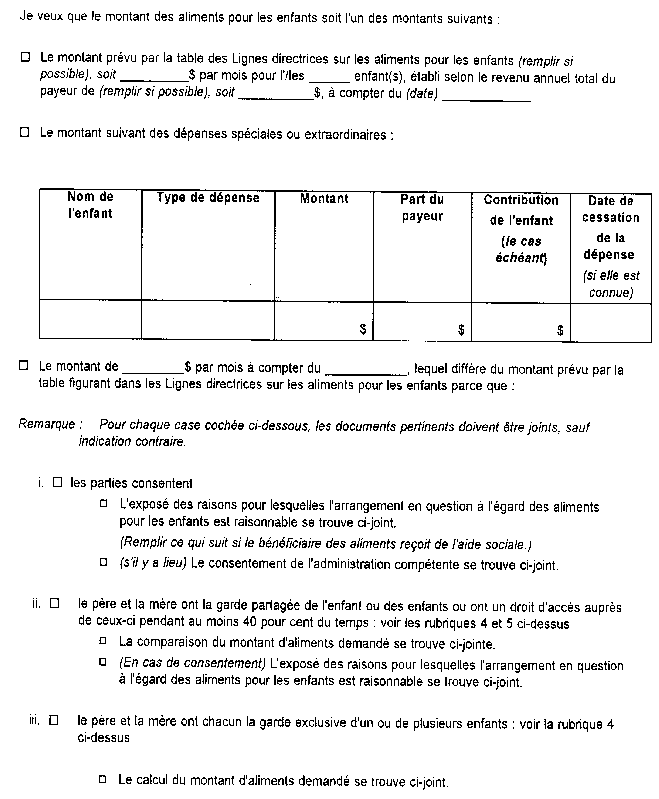
FORMULE 21.1
Loi sur les tribunaux judiciaires
FORMULE DE RENSEIGNEMENTS VISANT LA MODIFICATION
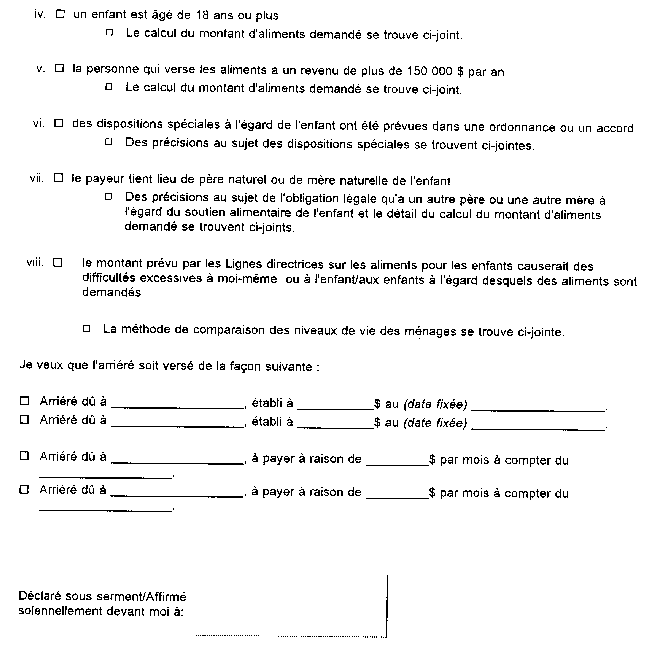
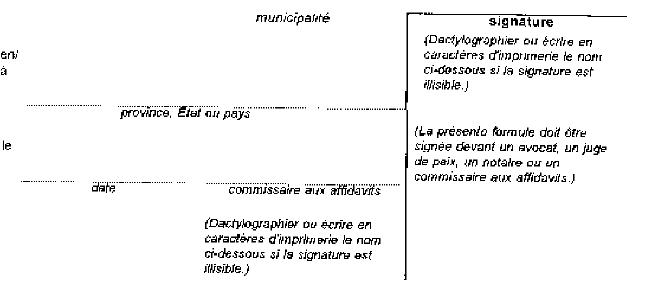
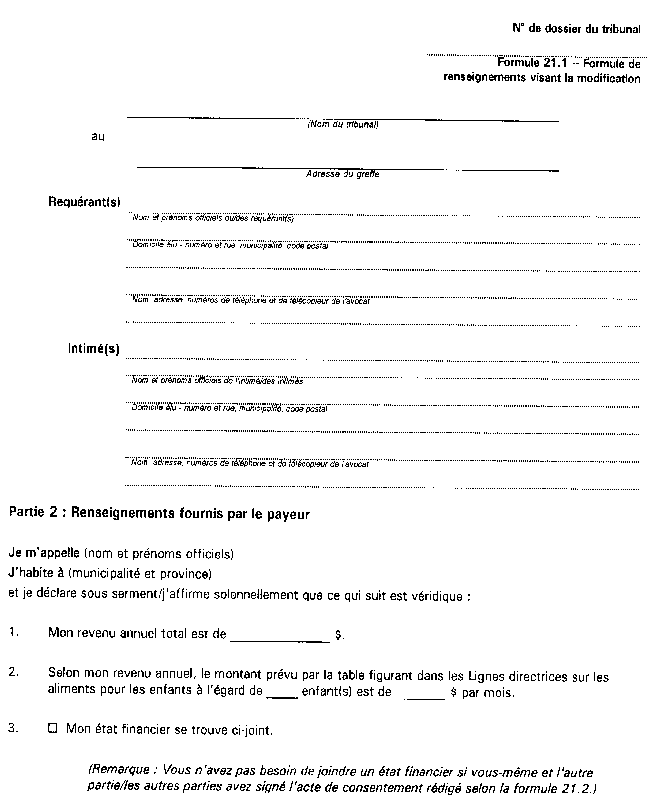
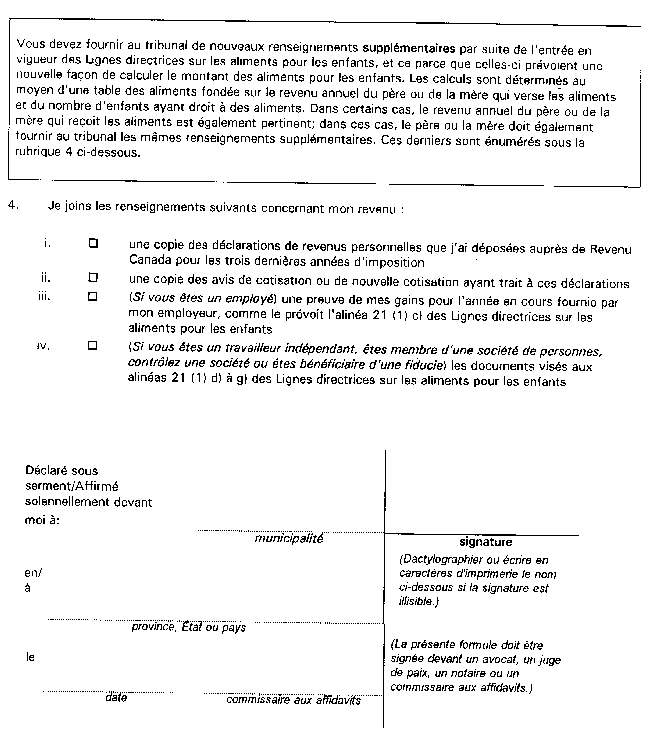

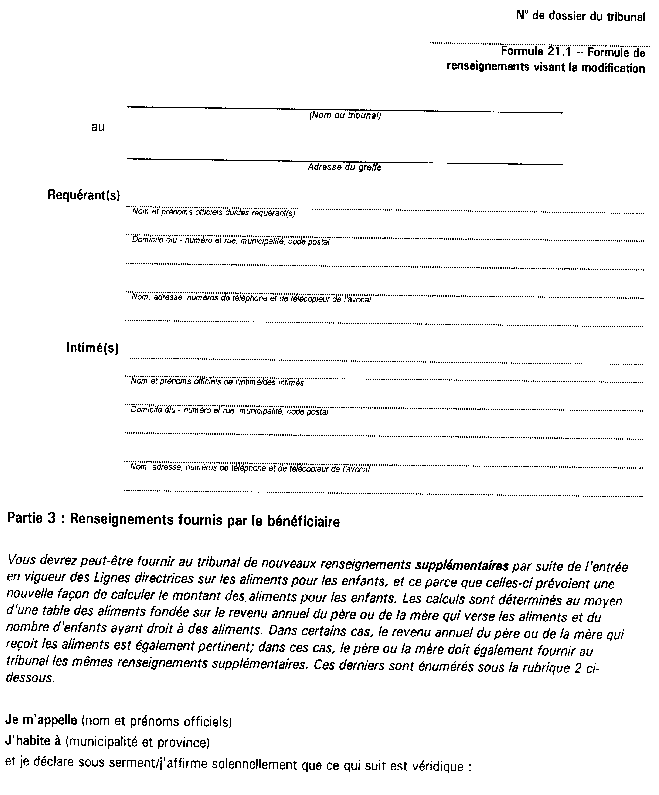
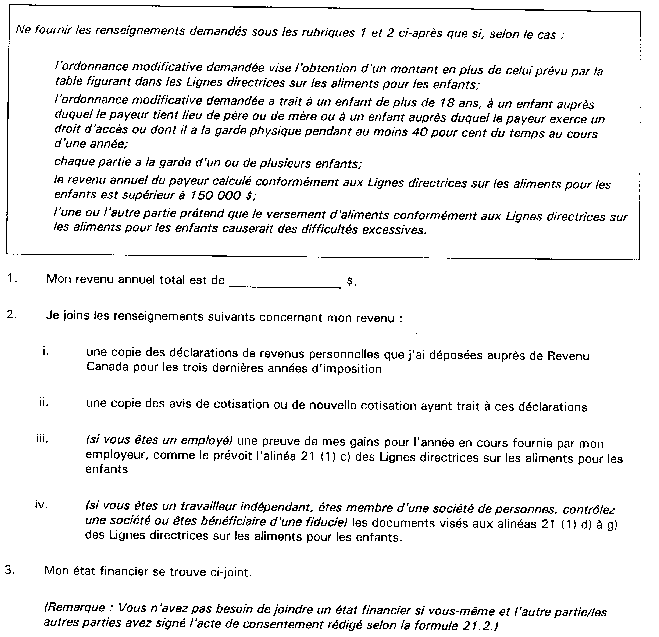

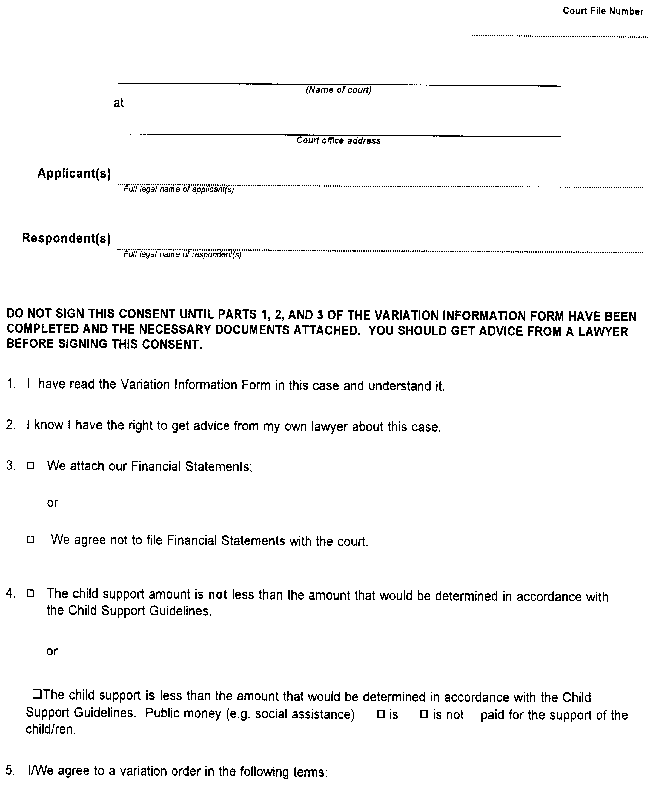

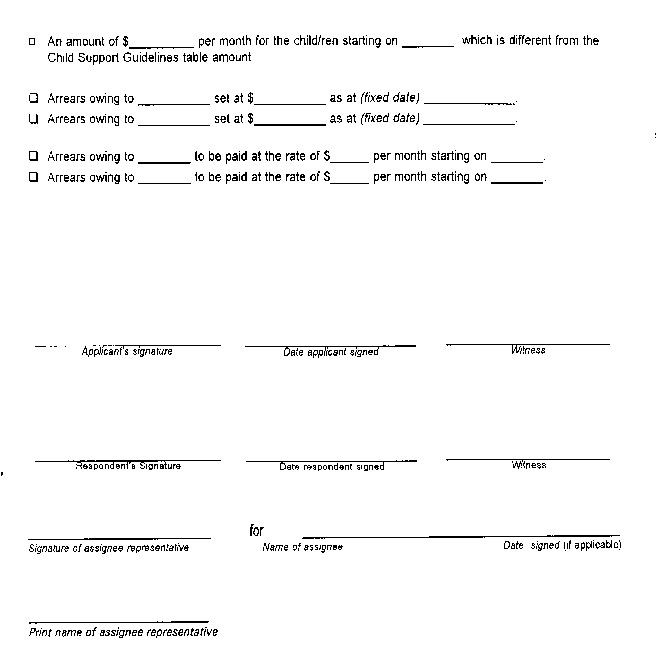
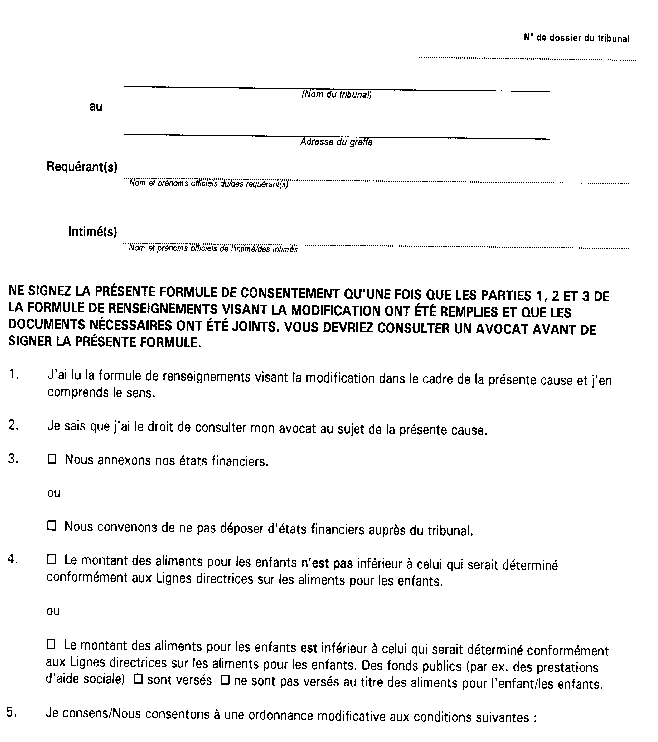
O. Reg. 216/98, s. 3.
FORM 21.2
Courts of Justice Act
VARIATION CONSENT FORM
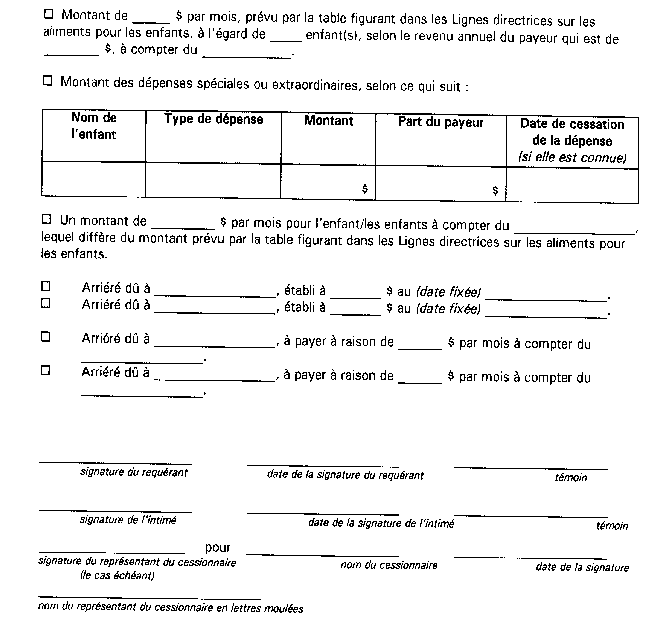
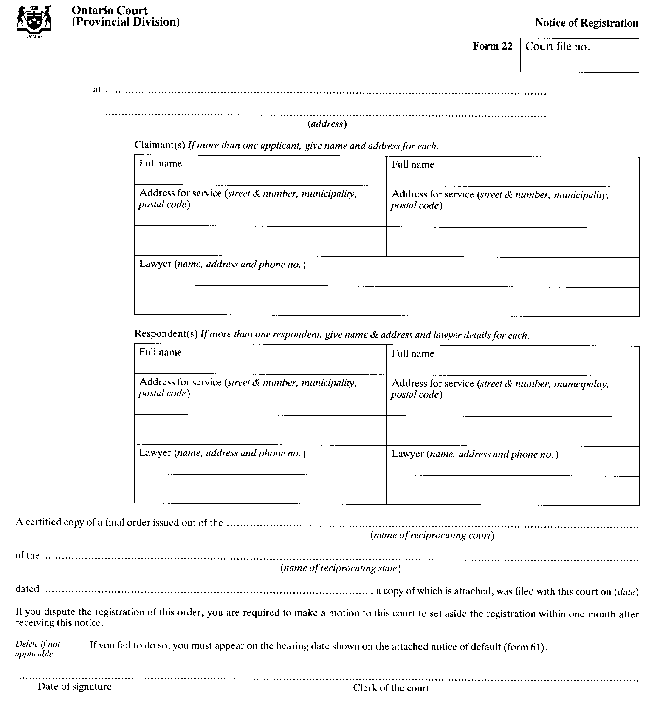
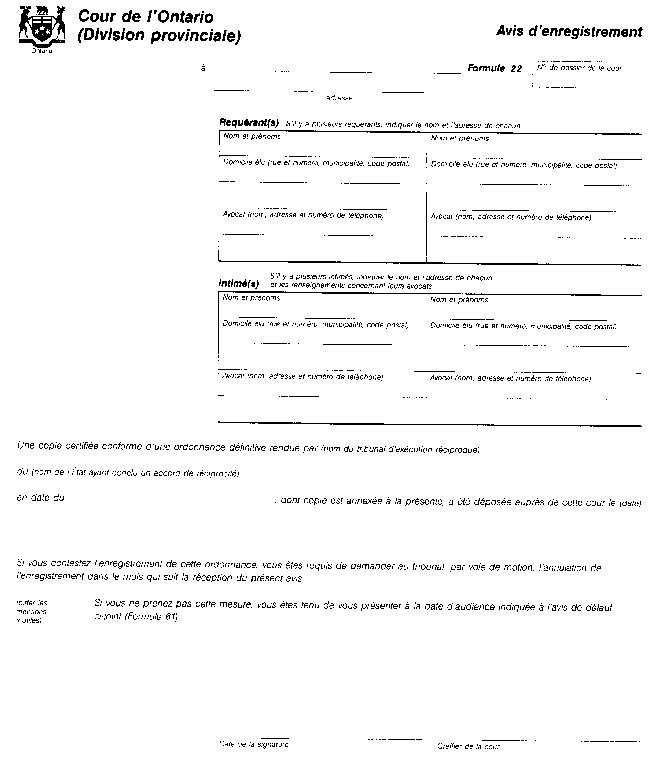
FORMULE 21.2
Loi sur les tribunaux judiciaires
FORMULE DE CONSENTEMENT
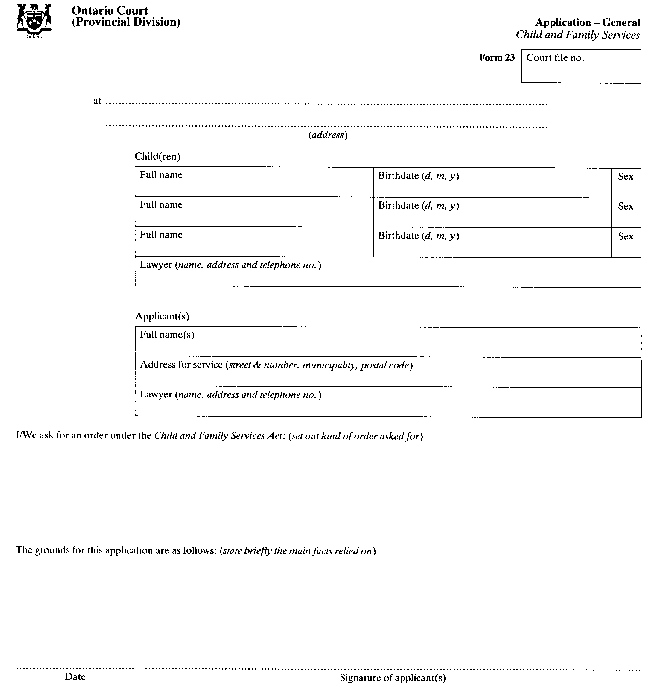
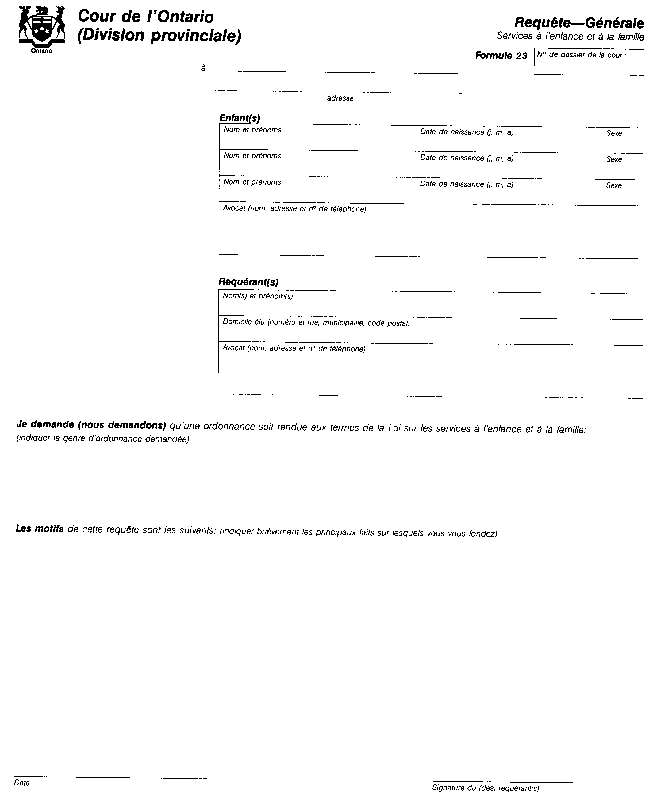
O. Reg. 216/98, s. 3.
FORM 22
Courts of Justice Act
NOTICE OF REGISTRATION
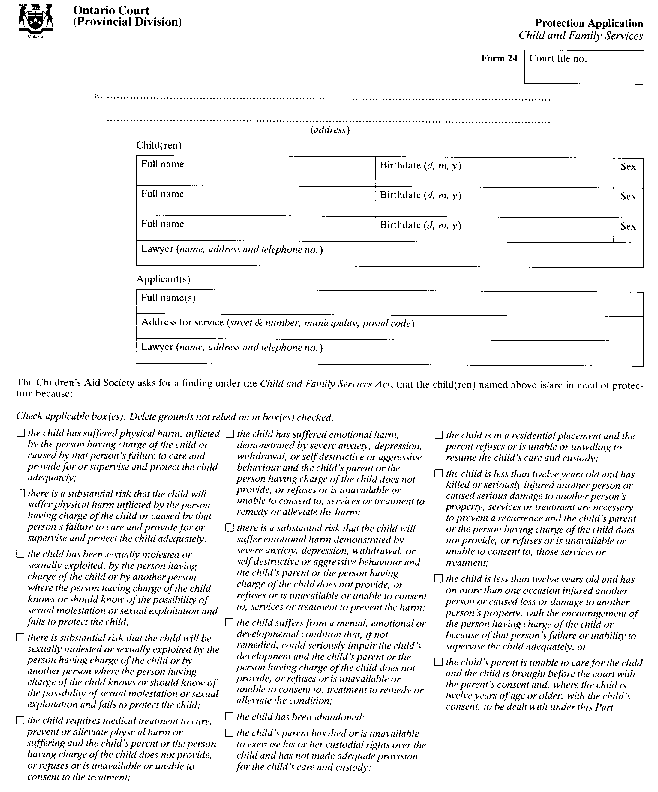
FORMULE 22
Loi sur les tribunaux judiciaires
AVIS D’ENREGISTREMENT
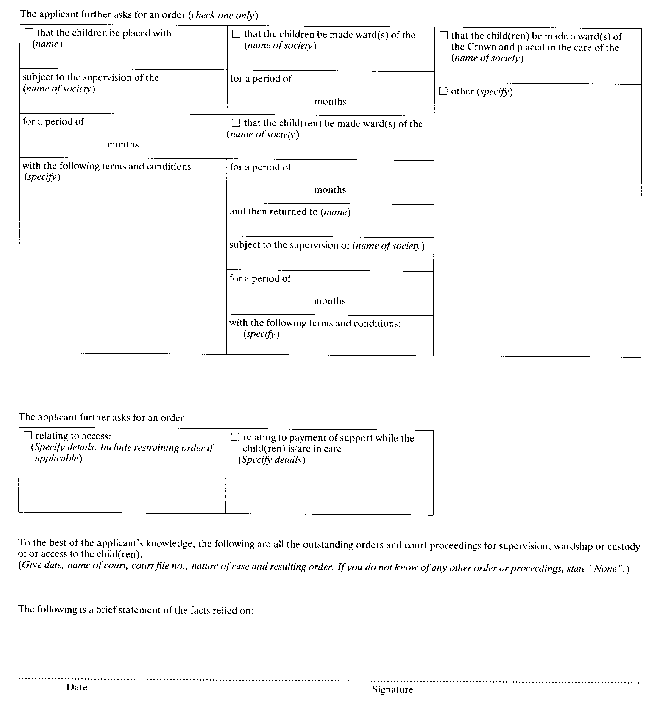
R.R.O. 1990, Reg. 199, Form 22.
FORM 23
Courts of Justice Act
APPLICATION — GENERAL
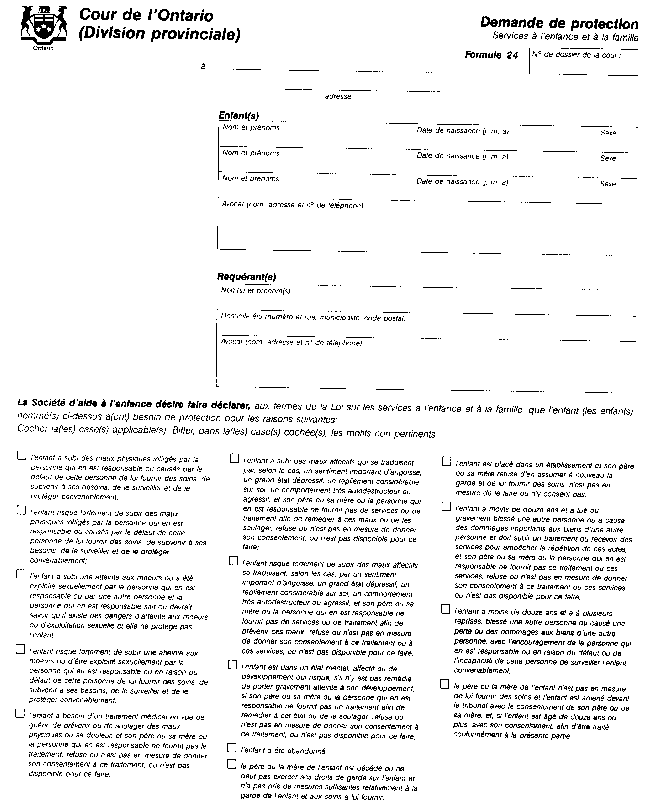
FORMULE 23
Loi sur les tribunaux judiciaires
REQUÊTE — GÉNÉRALE
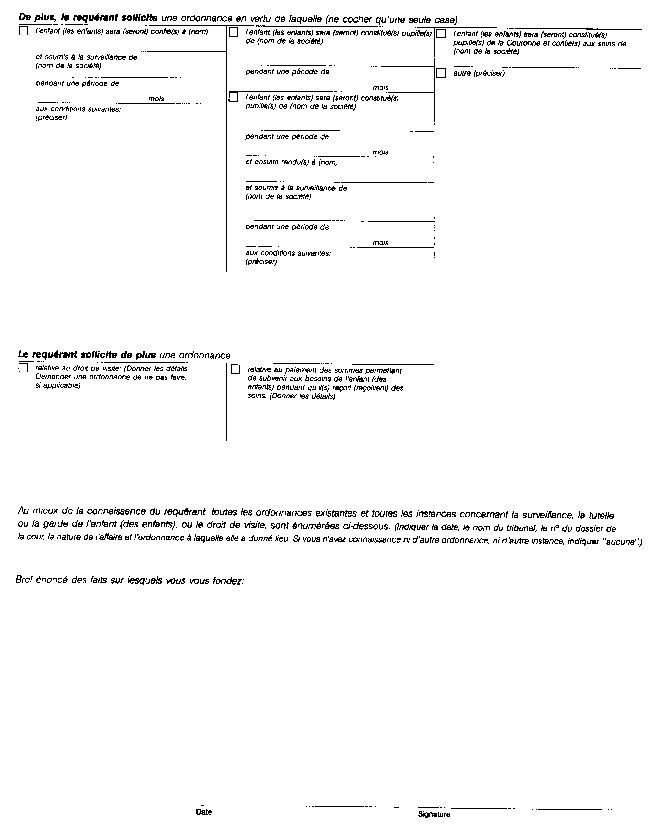
R.R.O. 1990, Reg. 199, Form 23.
FORM 24
Courts of Justice Act
PROTECTION APPLICATION
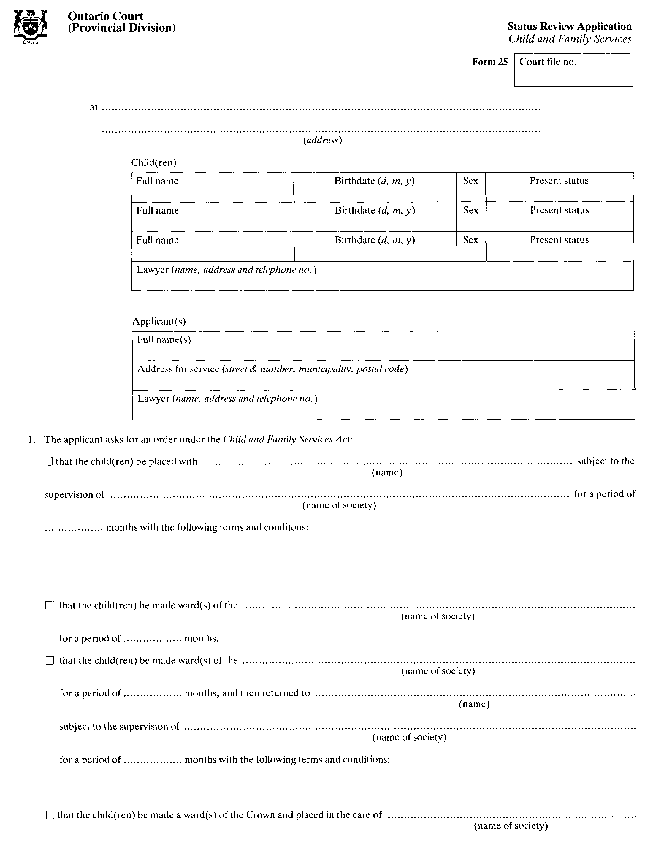
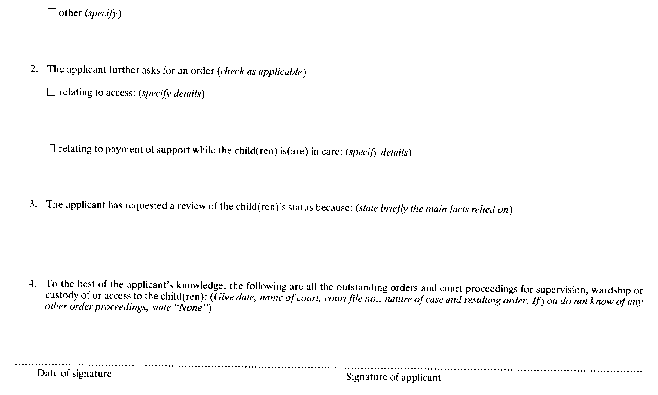
FORMULE 24
Loi sur les tribunaux judiciaires
DEMANDE DE PROTECTION
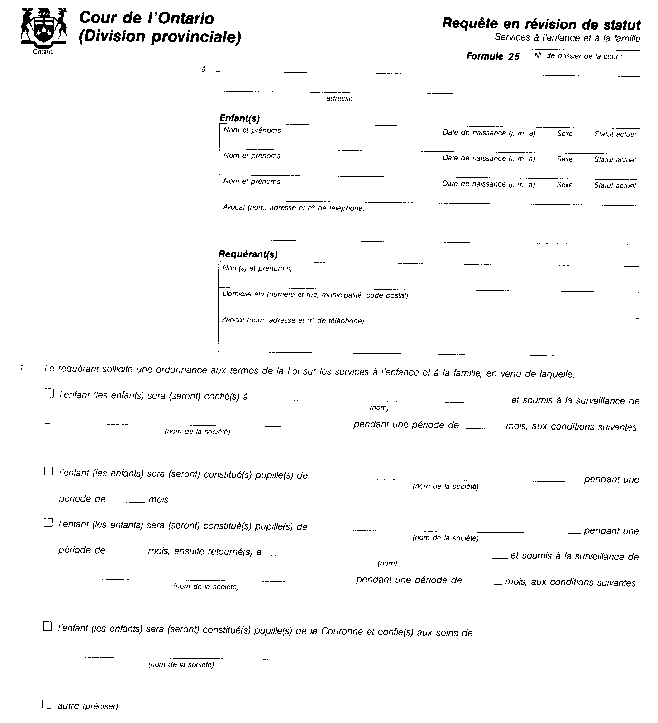
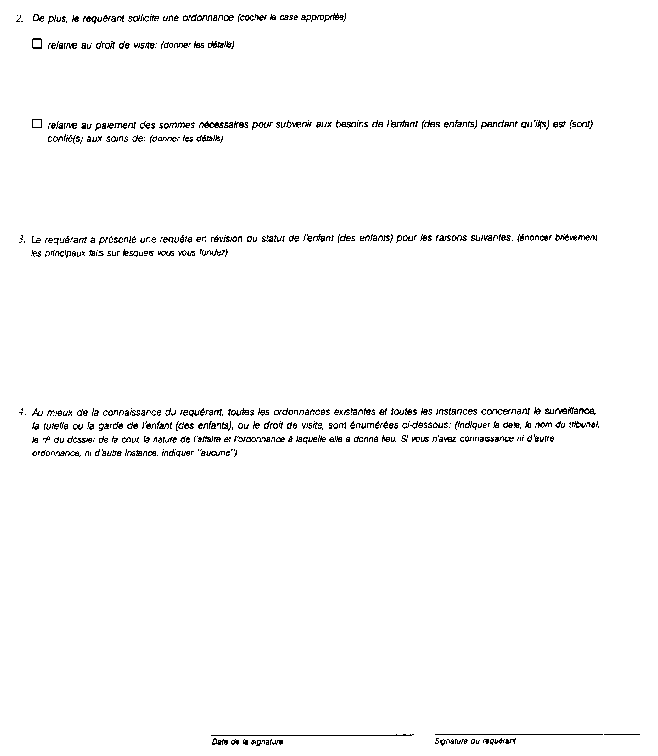
R.R.O. 1990, Reg. 199, Form 24.
FORM 25
Courts of Justice Act
STATUS REVIEW APPLICATION
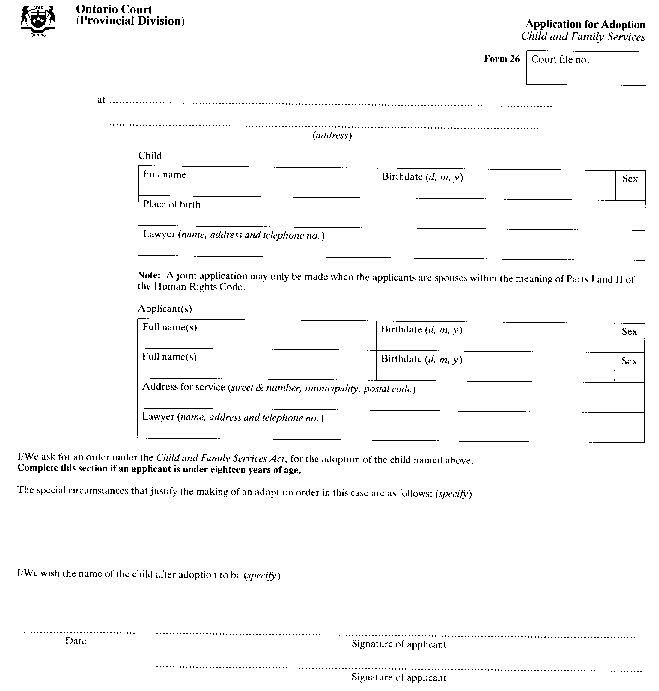
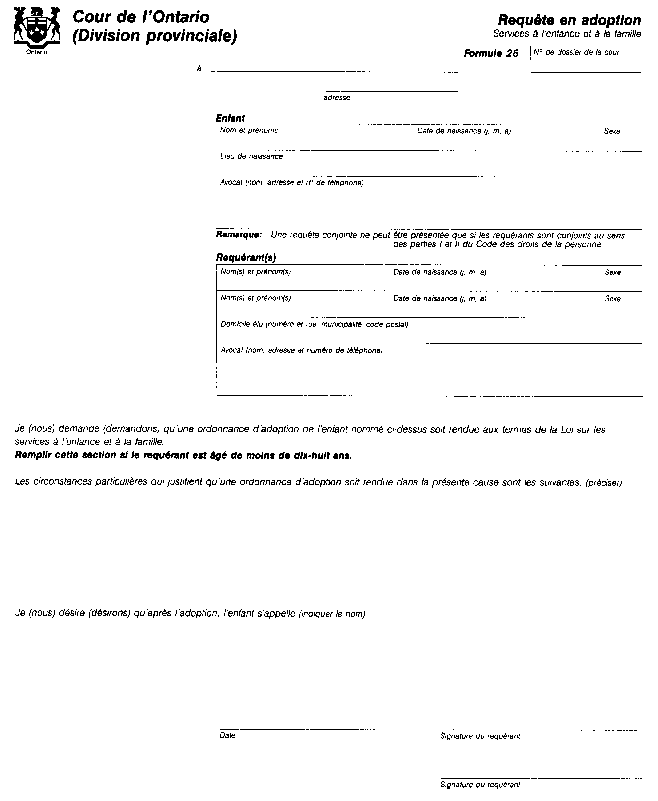
FORMULE 25
Loi sur les tribunaux judiciaires
REQUÊTE EN RÉVISION DE STATUT
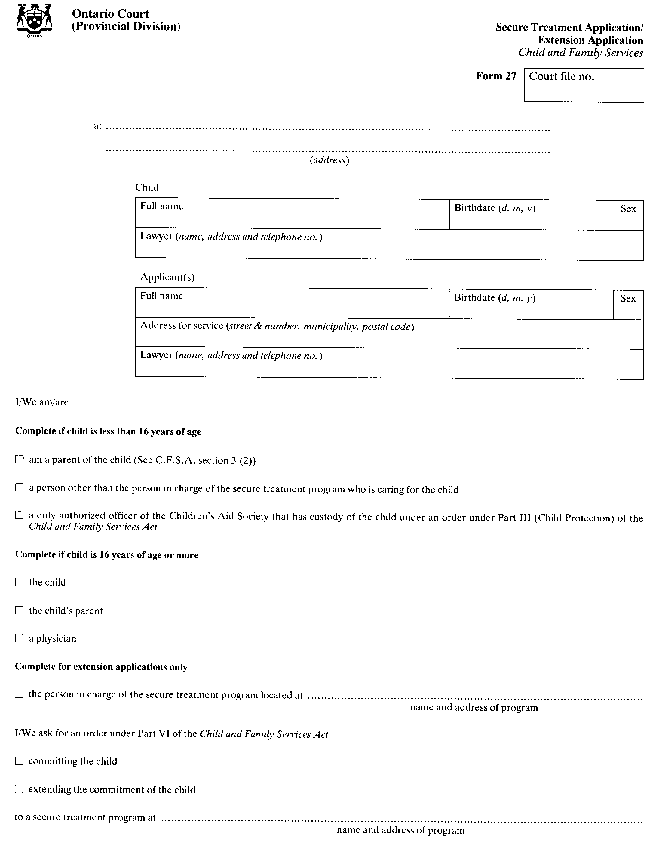
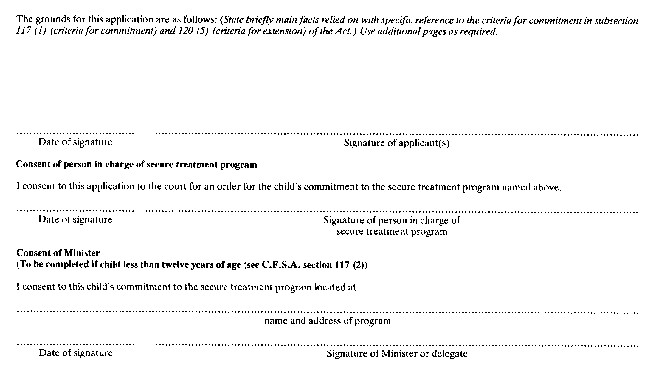
R.R.O. 1990, Reg. 199, Form 25.
FORM 26
Courts of Justice Act
APPLICATION FOR ADOPTION
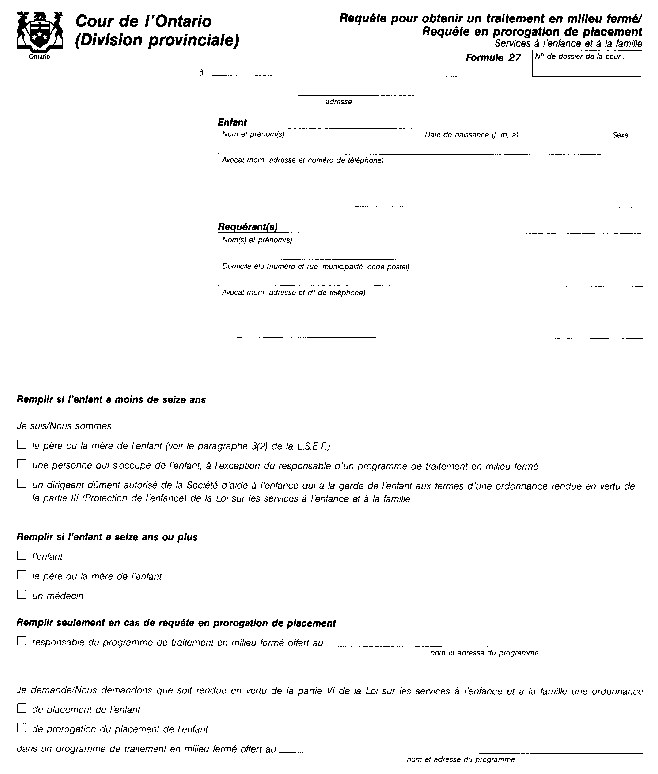
FORMULE 26
Loi sur les tribunaux judiciaires
REQUÊTE EN ADOPTION
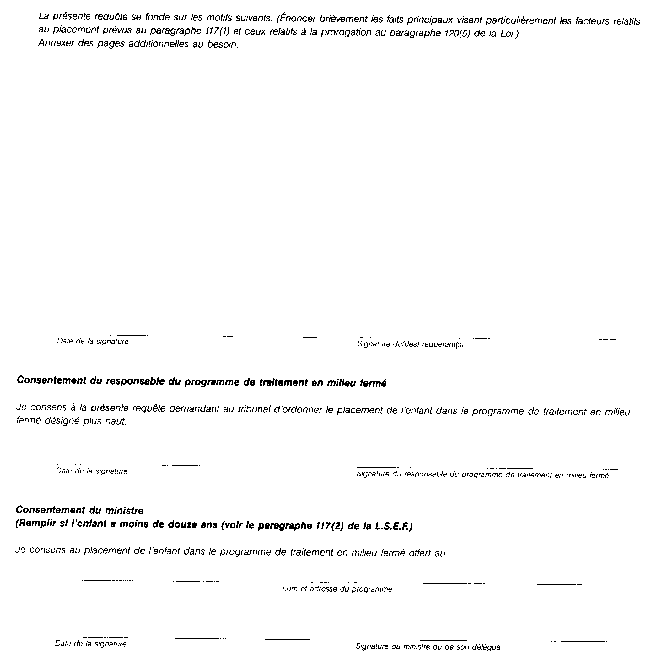
R.R.O. 1990, Reg. 199, Form 26.
FORM 27
Courts of Justice Act
SECURE TREATMENT APPLICATION/
EXTENSION APPLICATION
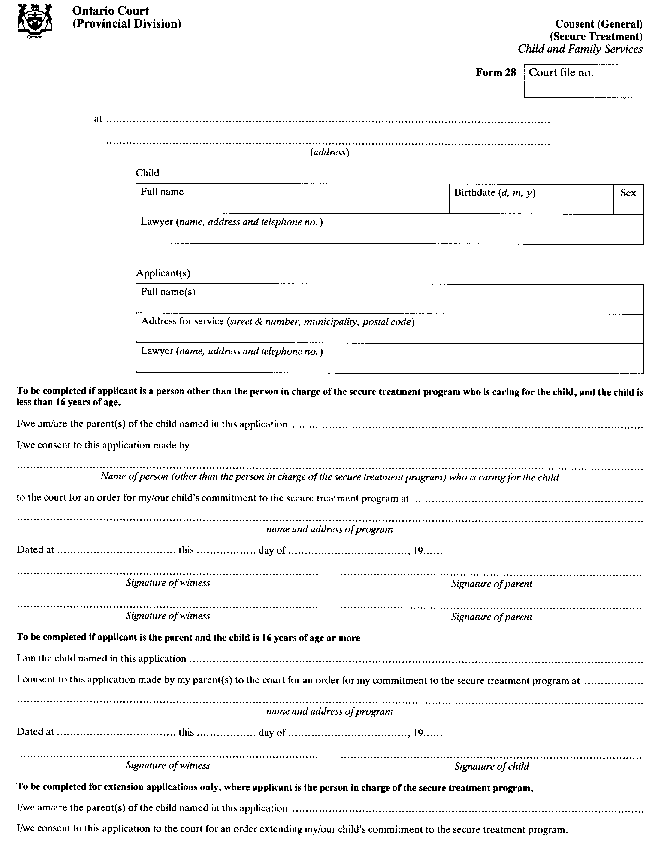
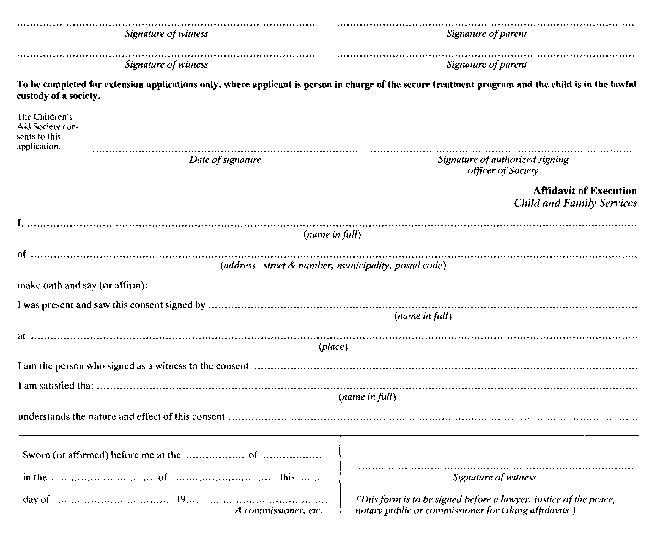
FORMULE 27
Loi sur les tribunaux judiciaires
REQUÊTE POUR OBTENIR UN TRAITEMENT EN MILIEU FERMÉ/
REQUÊTE EN PROROGATION DE PLACEMENT
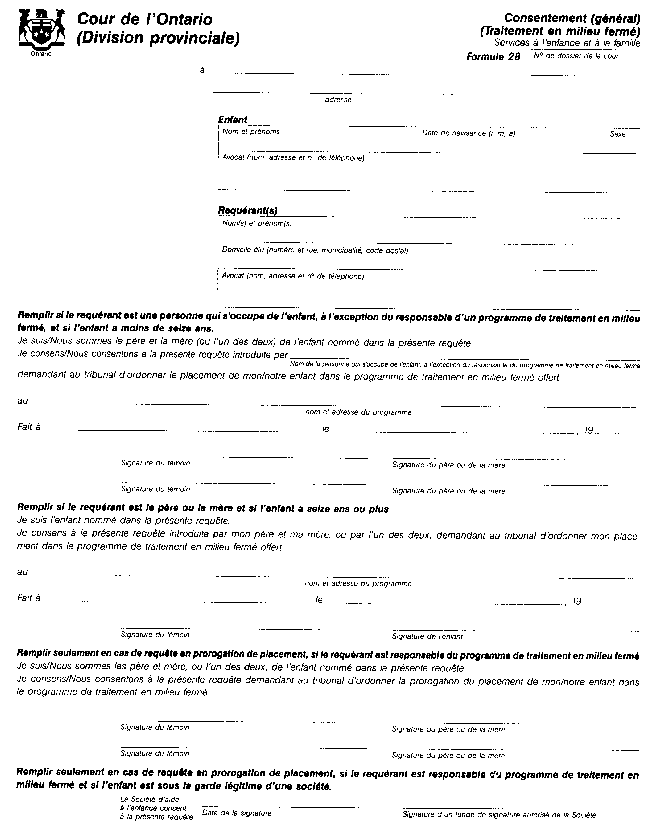
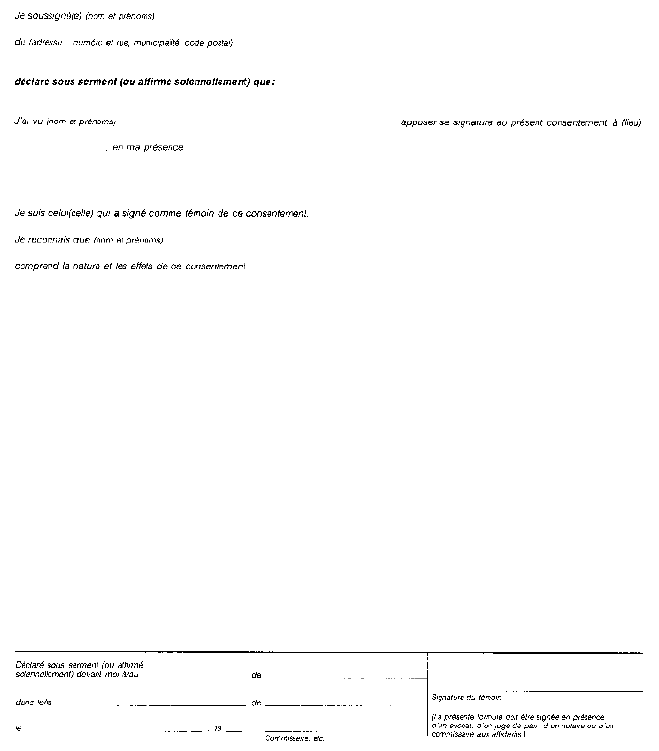
R.R.O. 1990, Reg. 199, Form 27.
FORM 28
Courts of Justice Act
CONSENT (GENERAL)
(SECURE TREATMENT)
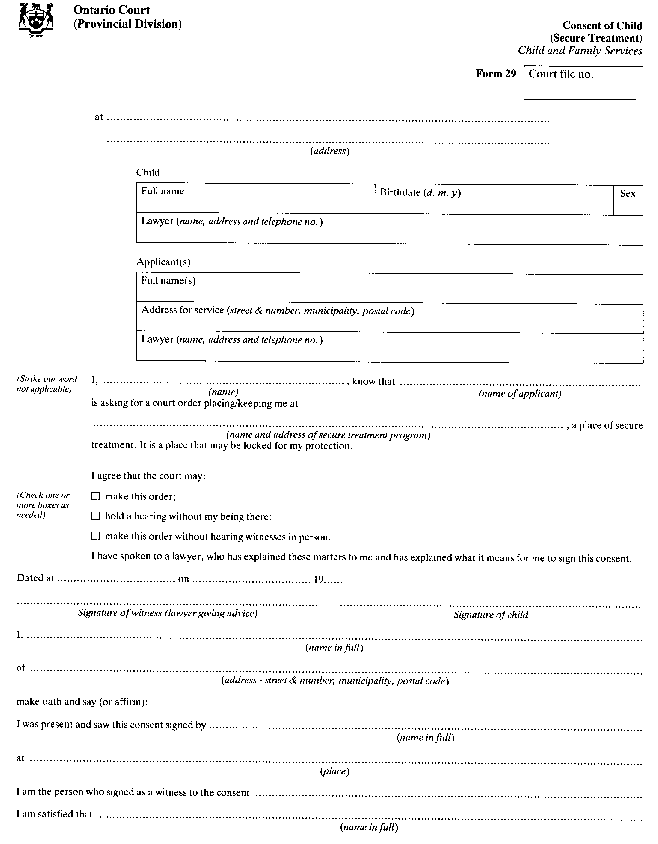

FORMULE 28
Loi sur les tribunaux judiciaires
CONSENTEMENT (GÉNÉRAL)
(TRAITEMENT EN MILIEU FERMÉ)
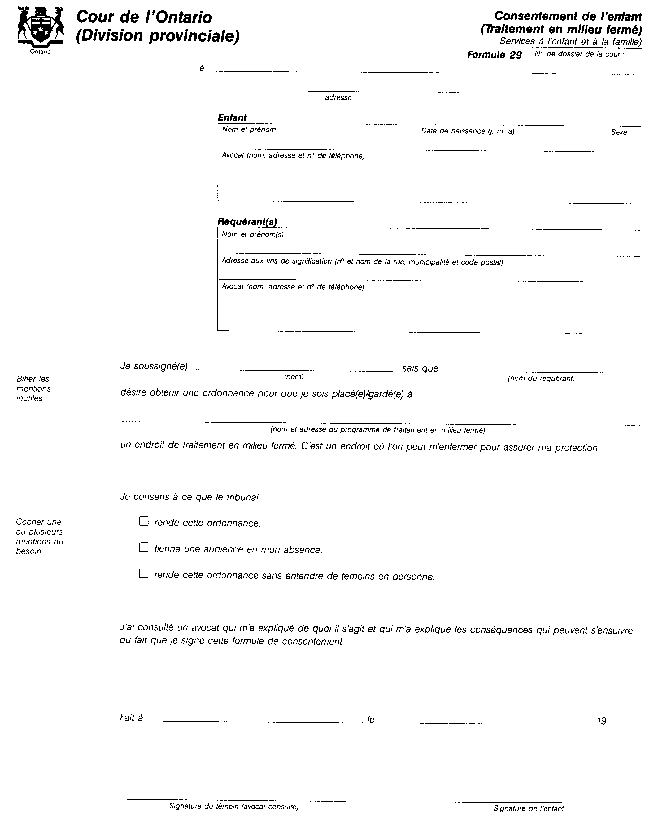
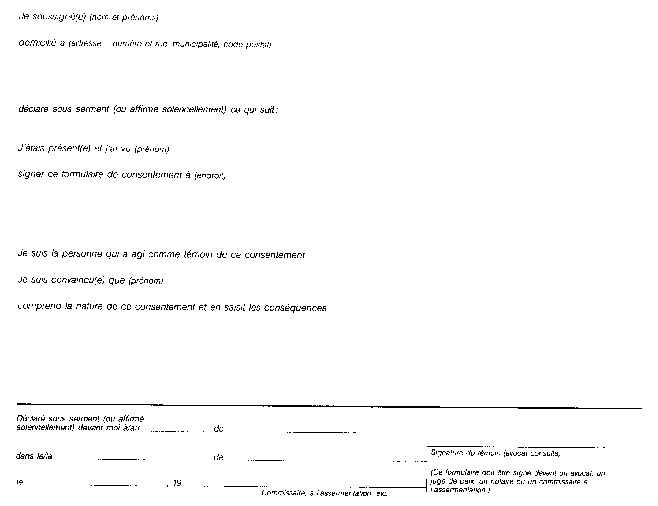
R.R.O. 1990, Reg. 199, Form 28.
FORM 29
Courts of Justice Act
CONSENT OF CHILD
(SECURE TREATMENT)
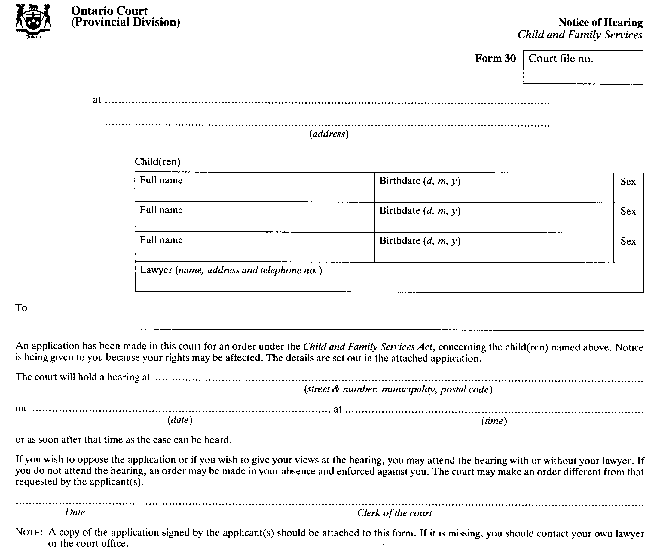
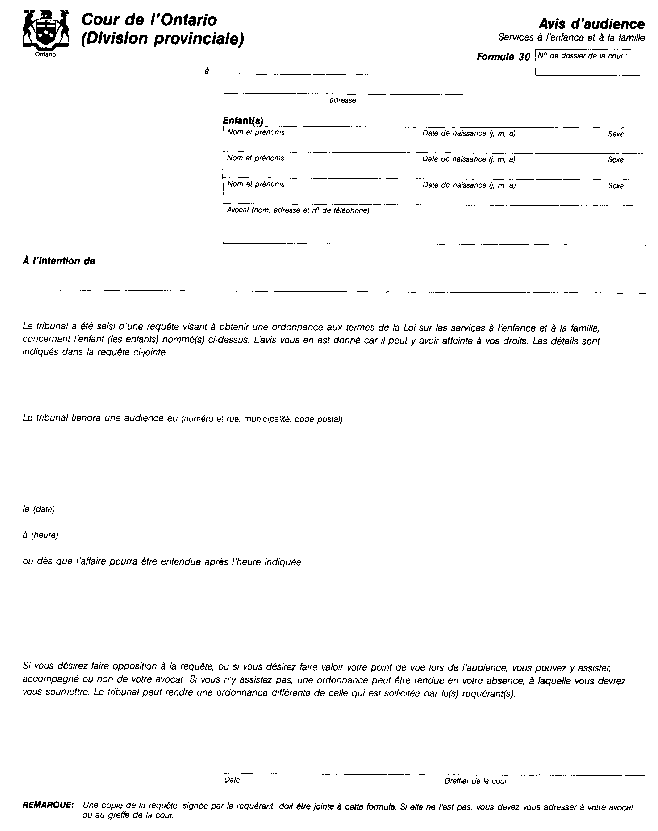
FORMULE 29
Loi sur les tribunaux judiciaires
CONSENTEMENT DE L’ENFANT
(TRAITEMENT EN MILIEU FERMÉ)
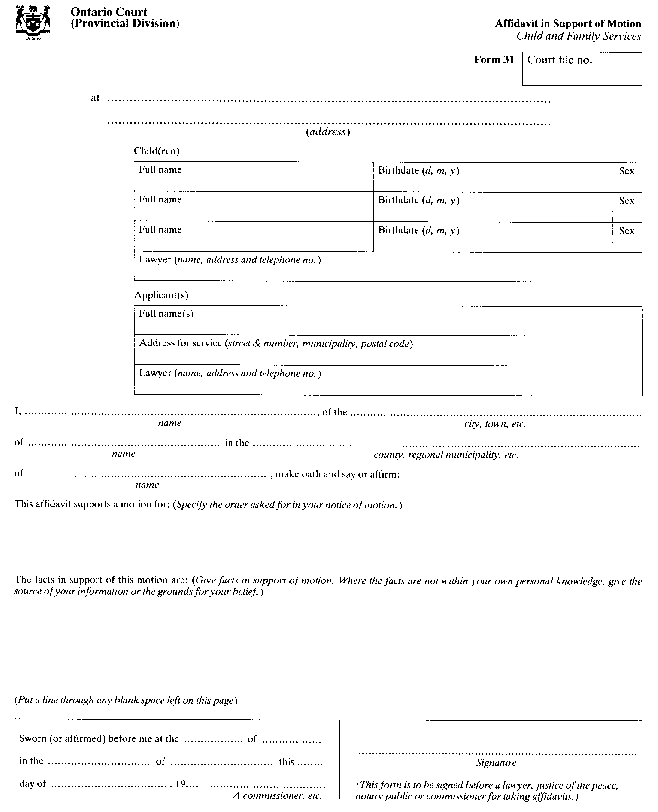
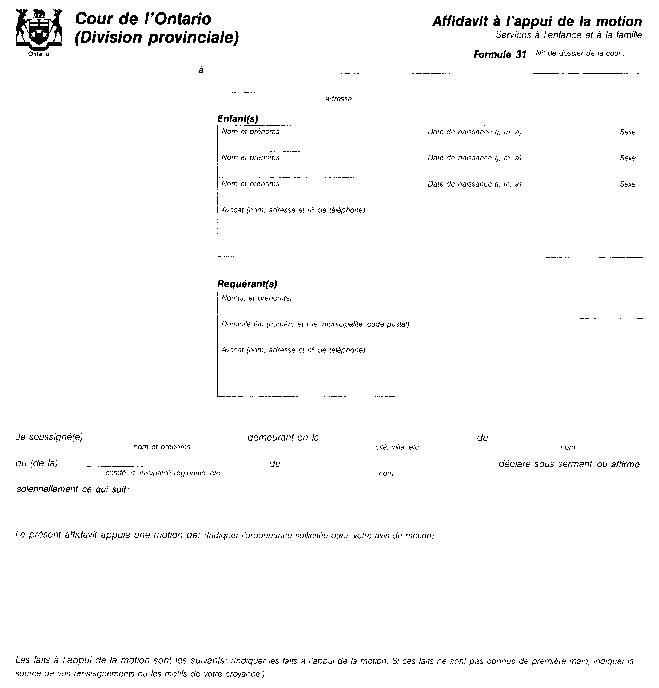
R.R.O. 1990, Reg. 199, Form 29.
FORM 30
Courts of Justice Act
NOTICE OF HEARING

FORMULE 30
Loi sur les tribunaux judiciaires
AVIS D’AUDIENCE
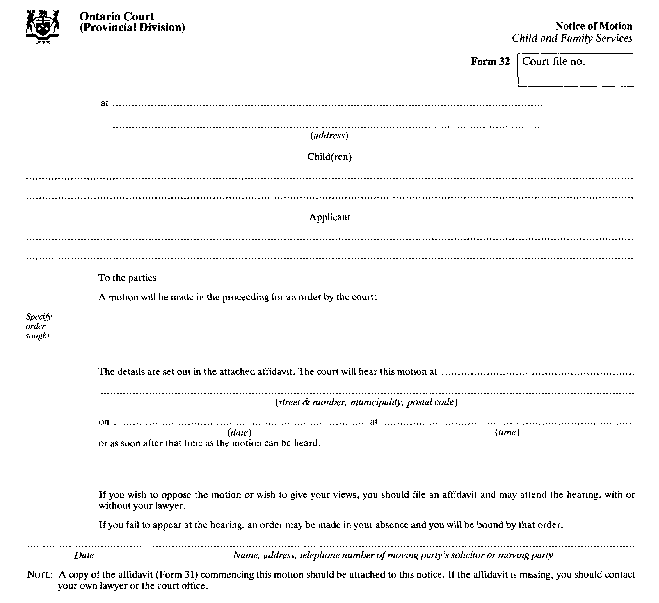
R.R.O. 1990, Reg. 199, Form 30.
FORM 31
Courts of Justice Act
AFFIDAVIT IN SUPPORT OF MOTION
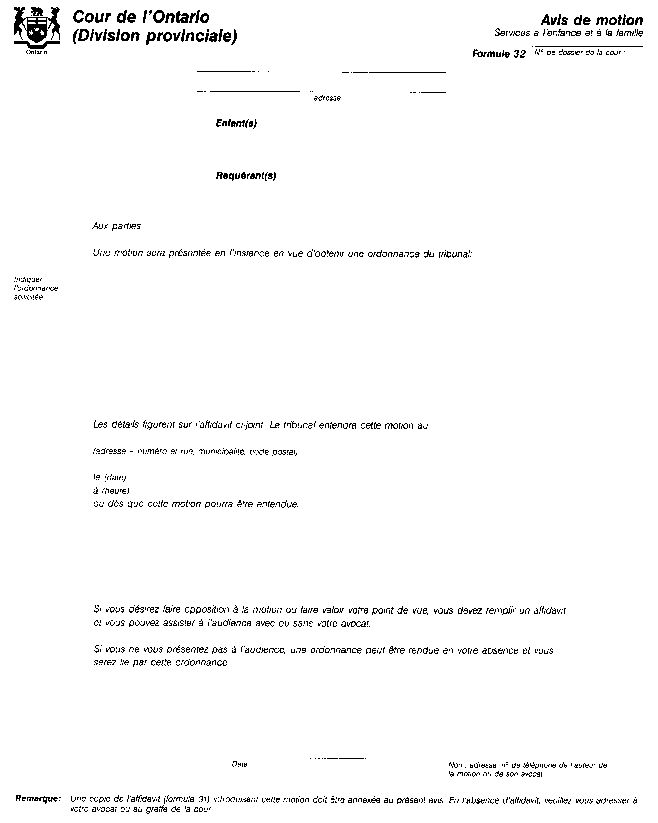
FORMULE 31
Loi sur les tribunaux judiciaires
AFFIDAVIT À L’APPUI DE LA MOTION
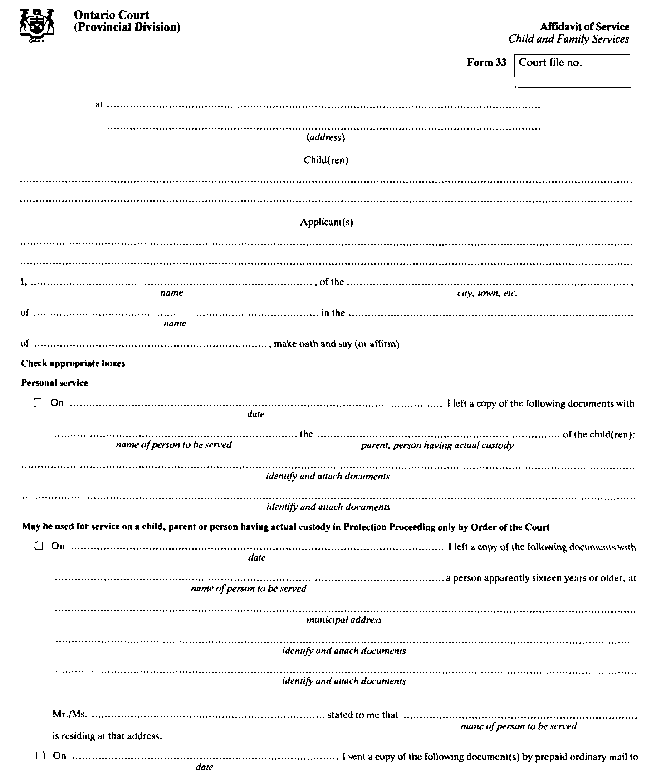
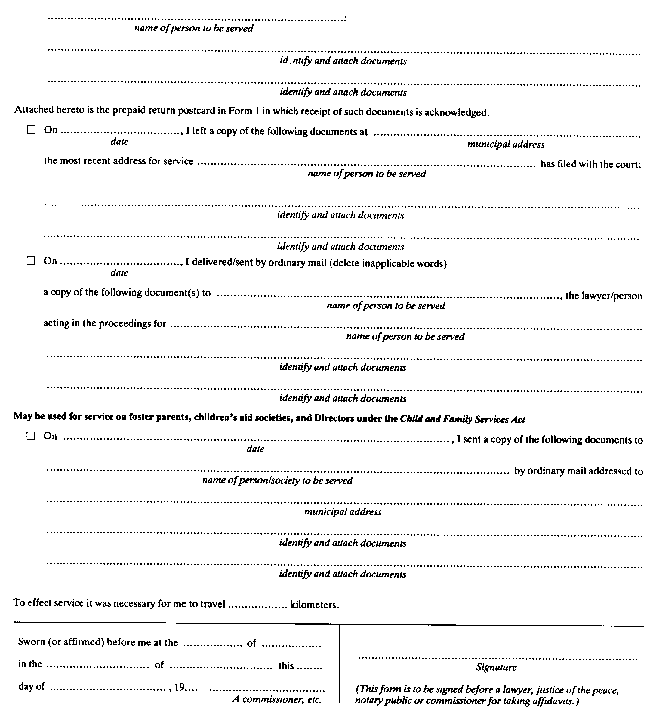
R.R.O. 1990, Reg. 199, Form 31.
FORM 32
Courts of Justice Act
NOTICE OF MOTION
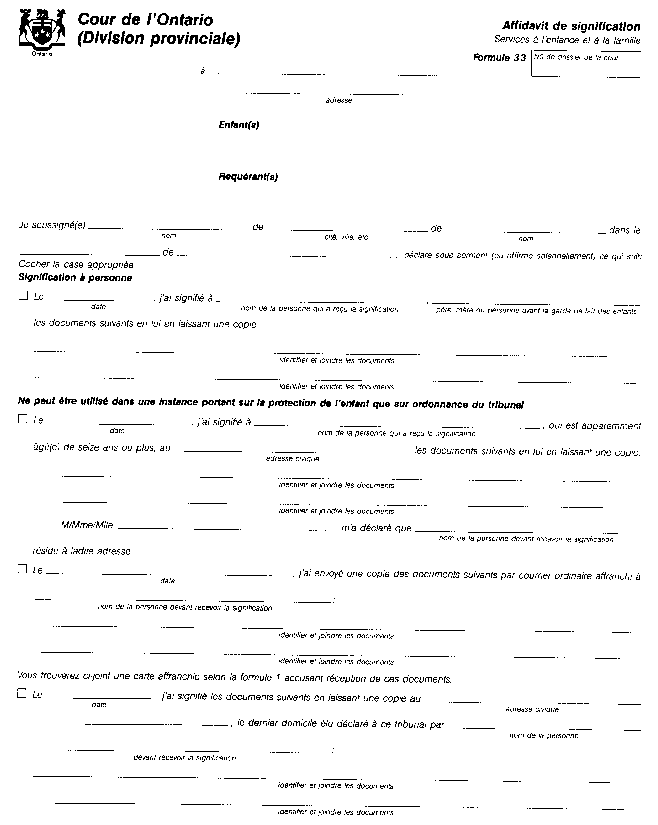
FORMULE 32
Loi sur les tribunaux judiciaires
AVIS DE MOTION
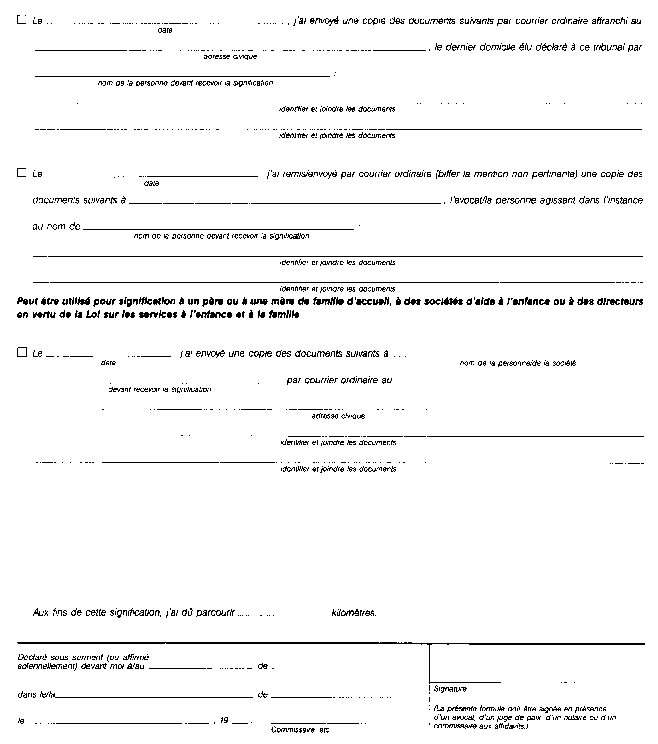
R.R.O. 1990, Reg. 199, Form 32.
FORM 33
Courts of Justice Act
AFFIDAVIT OF SERVICE
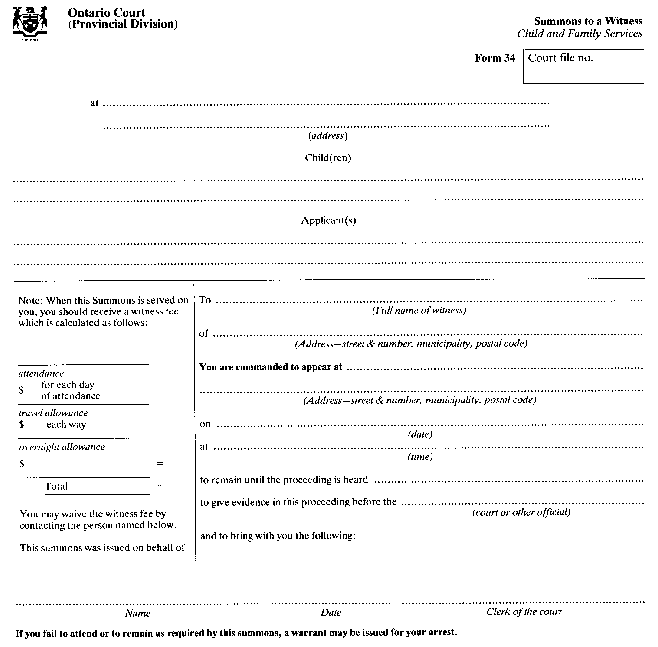
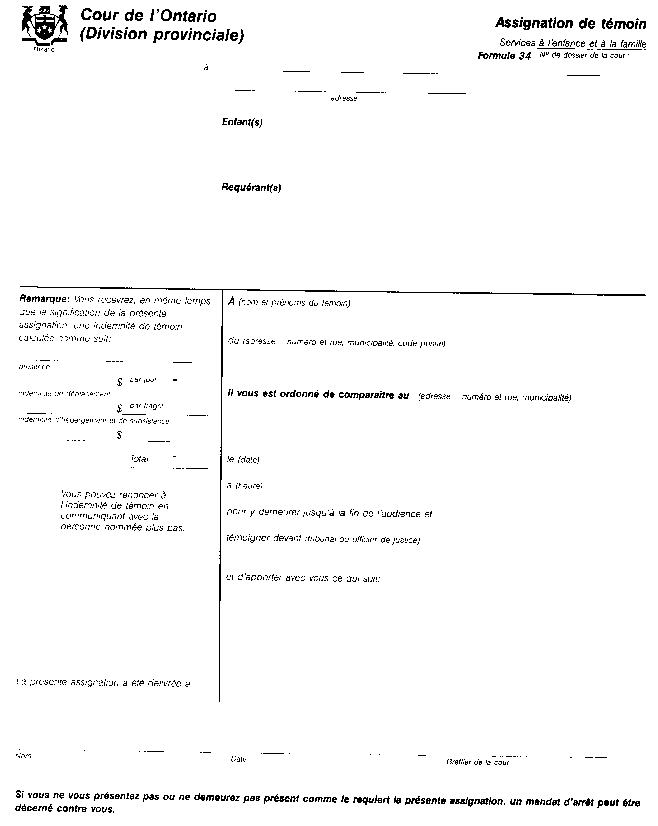
FORMULE 33
Loi sur les tribunaux judiciaires
AFFIDAVIT DE SIGNIFICATION
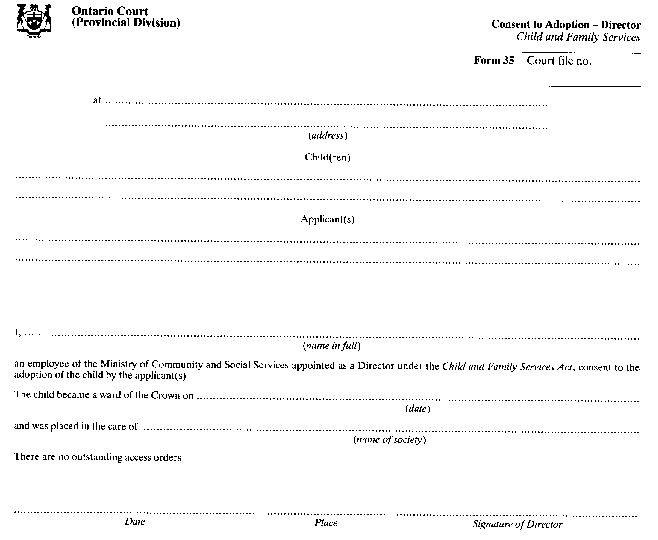
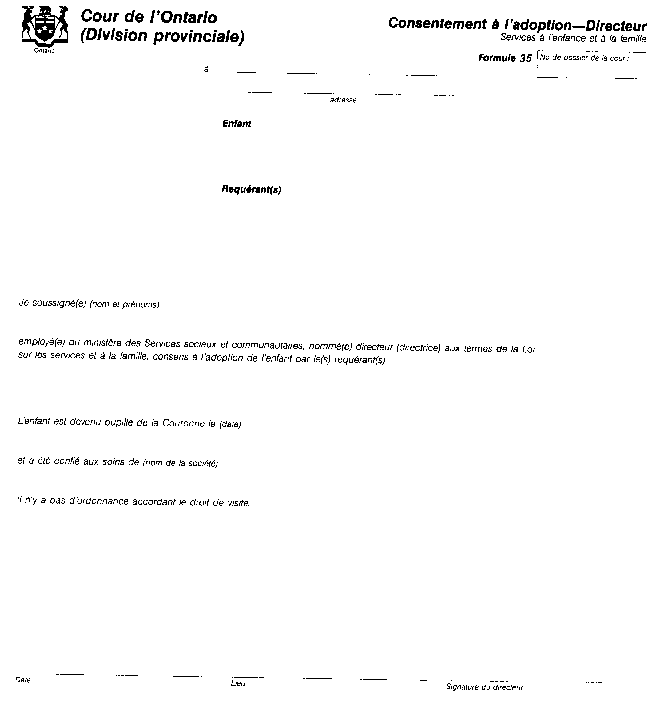
R.R.O. 1990, Reg. 199, Form 33.
FORM 34
Courts of Justice Act
SUMMONS TO A WITNESS
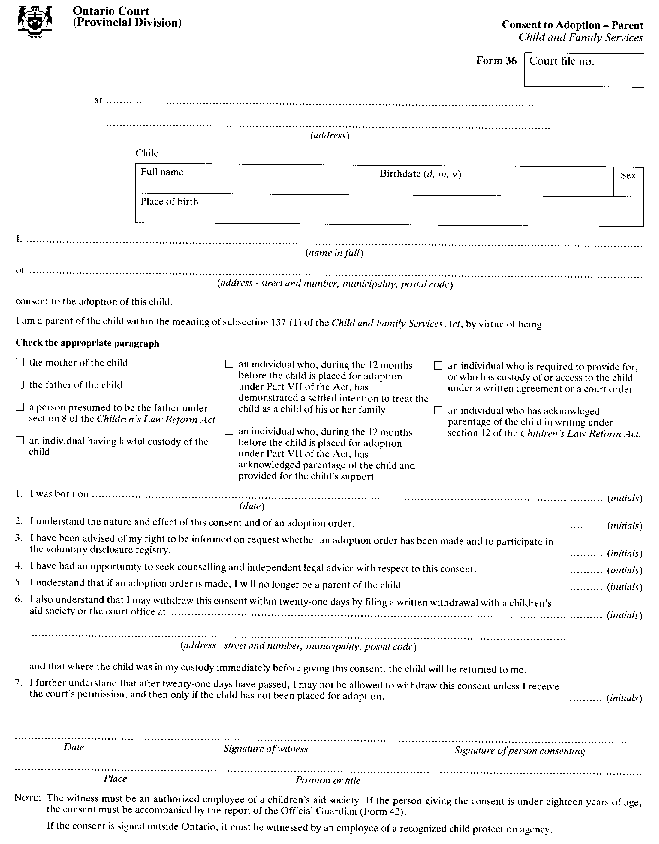
FORMULE 34
Loi sur les tribunaux judiciaires
ASSIGNATION DE TÉMOIN
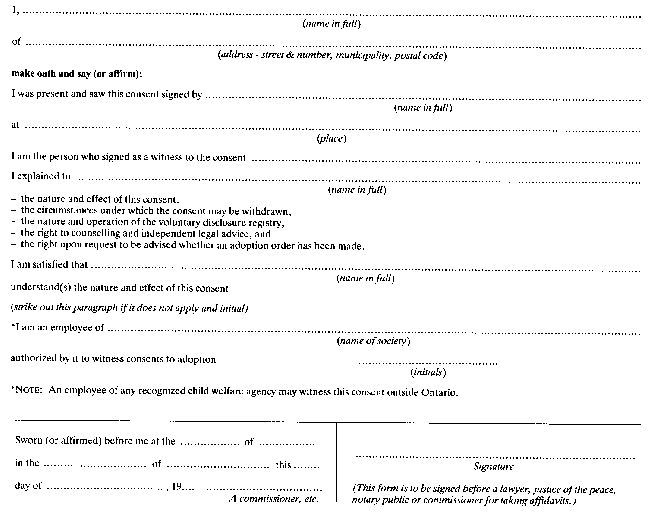
R.R.O. 1990, Reg. 199, Form 34.
FORM 35
Courts of Justice Act
CONSENT TO ADOPTION — DIRECTOR
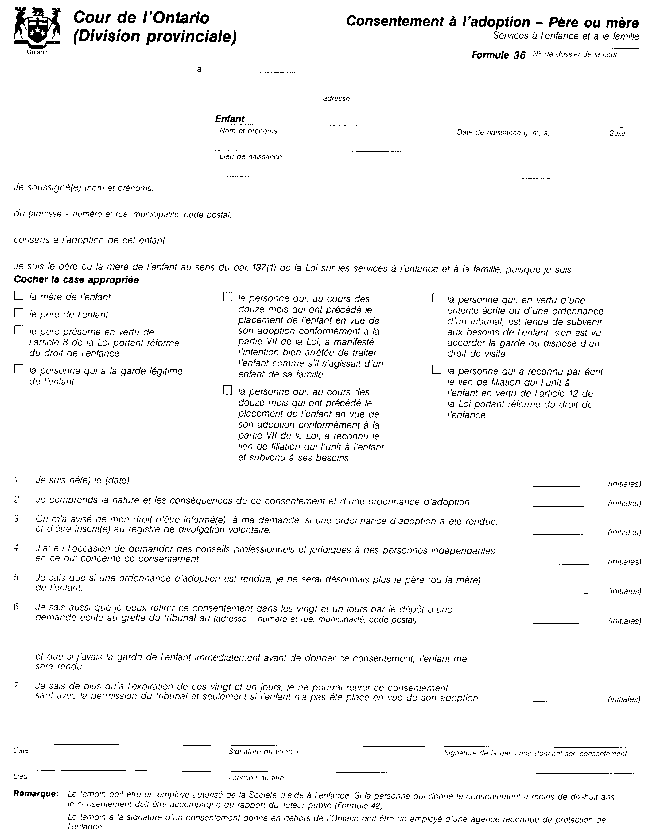
FORMULE 35
Loi sur les tribunaux judiciaires
CONSENTEMENT À L’ADOPTION — DIRECTEUR
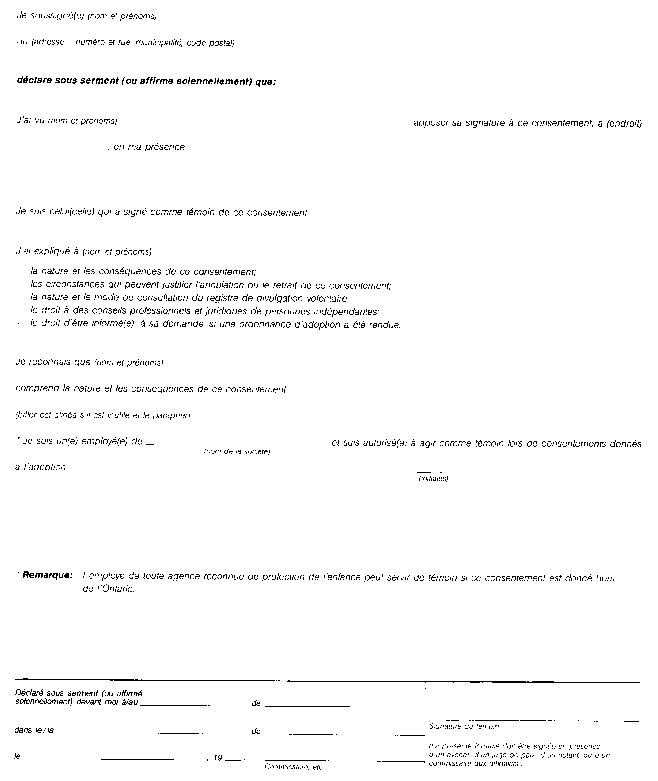
R.R.O. 1990, Reg. 199, Form 35.
FORM 36
Courts of Justice Act
CONSENT TO ADOPTION — PARENT
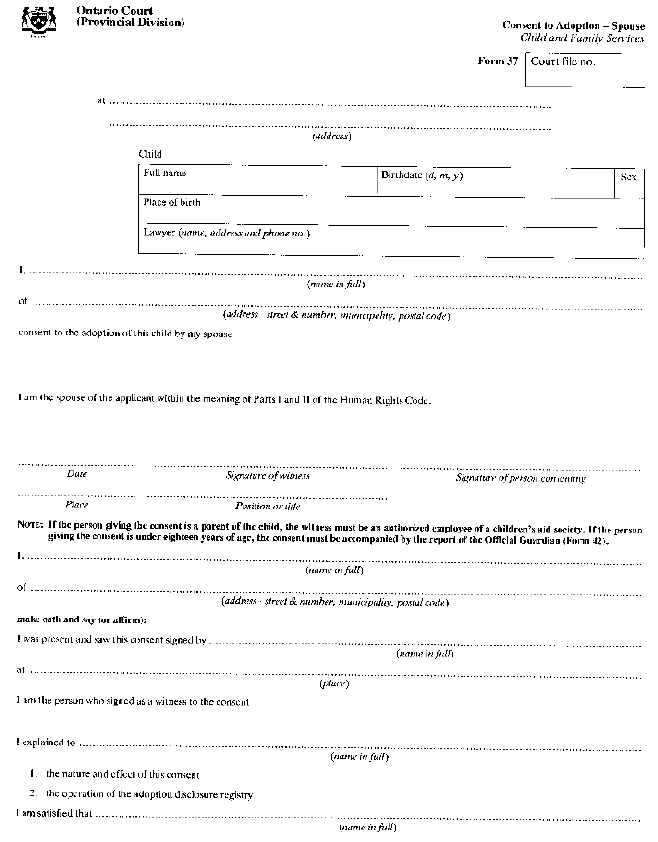
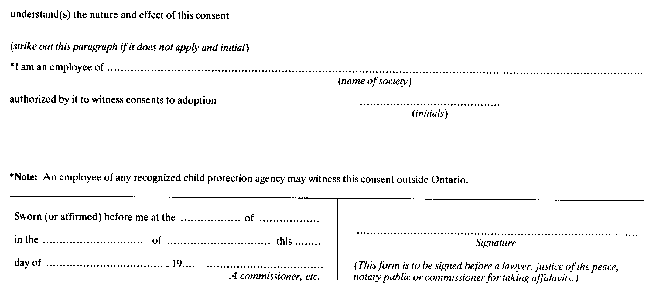
FORMULE 36
Loi sur les tribunaux judiciaires
CONSENTEMENT À L’ADOPTION — PÈRE OU MÈRE
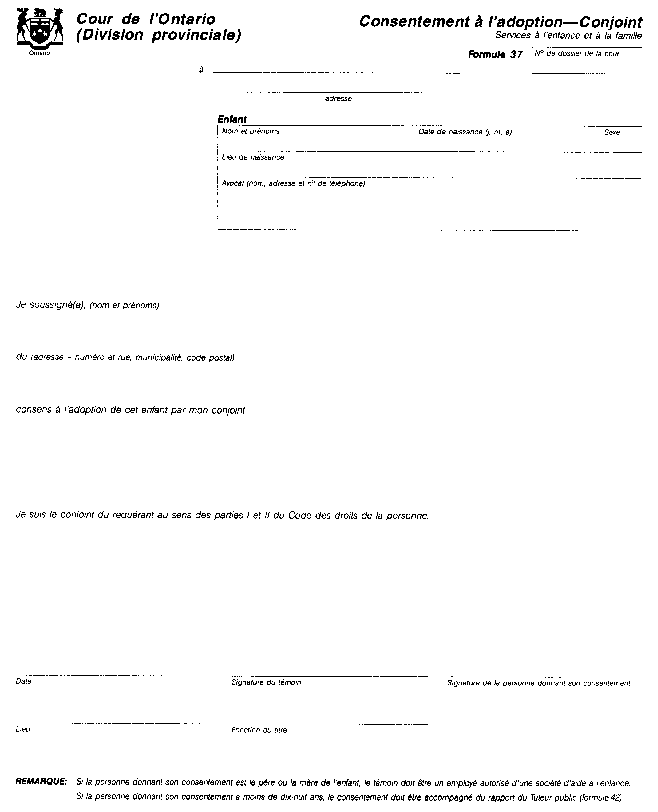
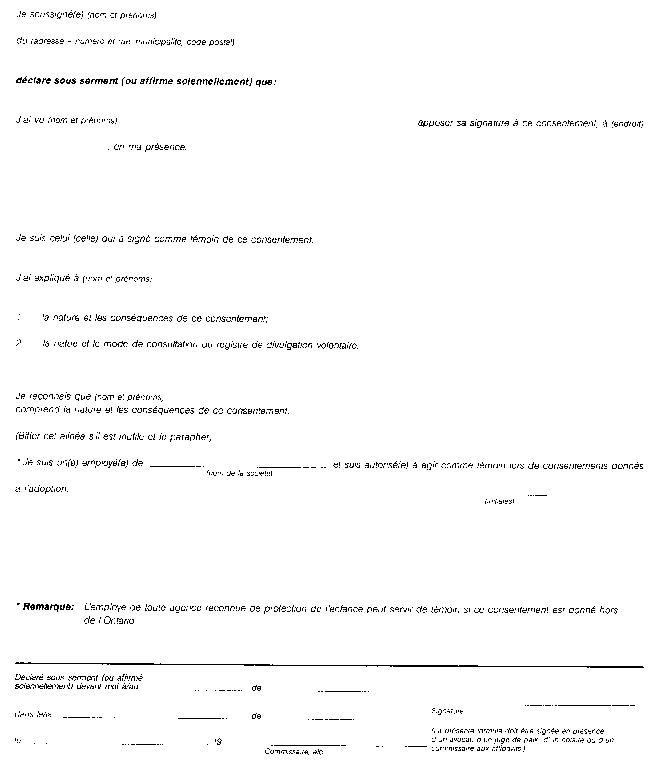
R.R.O. 1990, Reg. 199, Form 36.
FORM 37
Courts of Justice Act
CONSENT TO ADOPTION — SPOUSE
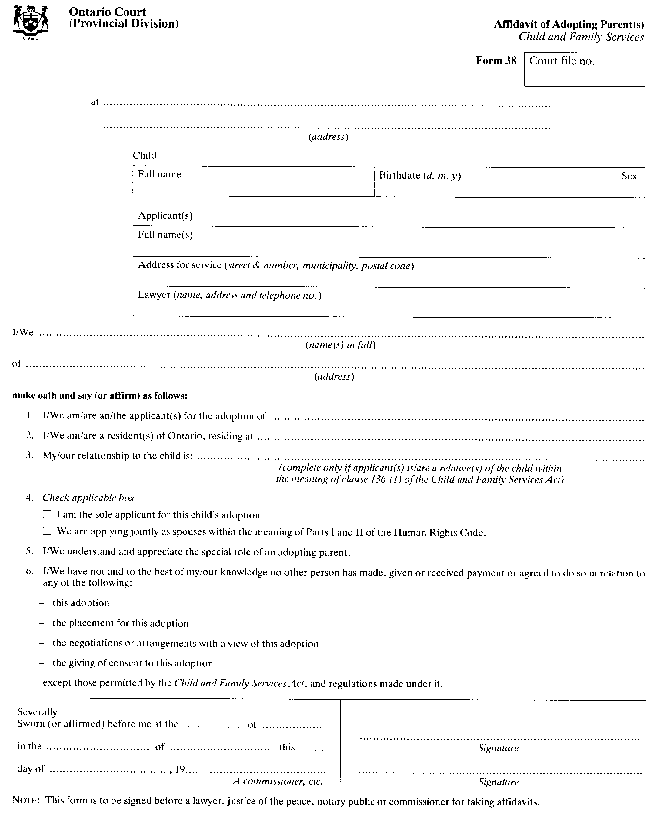
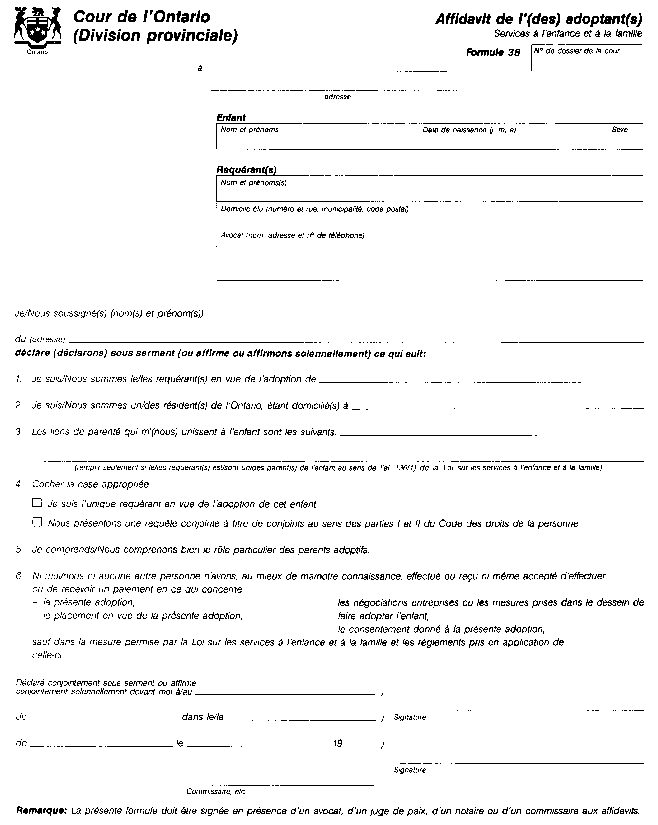
FORMULE 37
Loi sur les tribunaux judiciaires
CONSENTEMENT À L’ADOPTION — CONJOINT
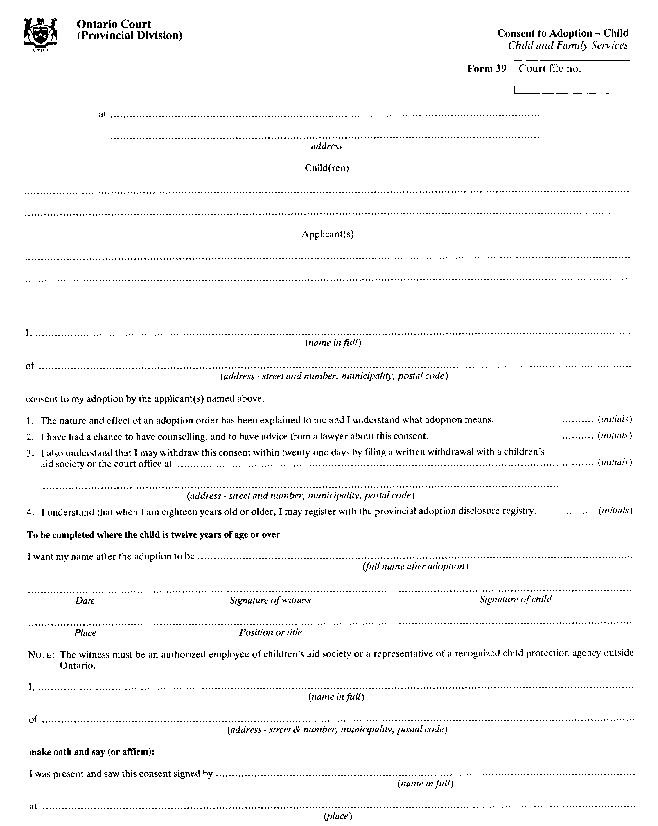
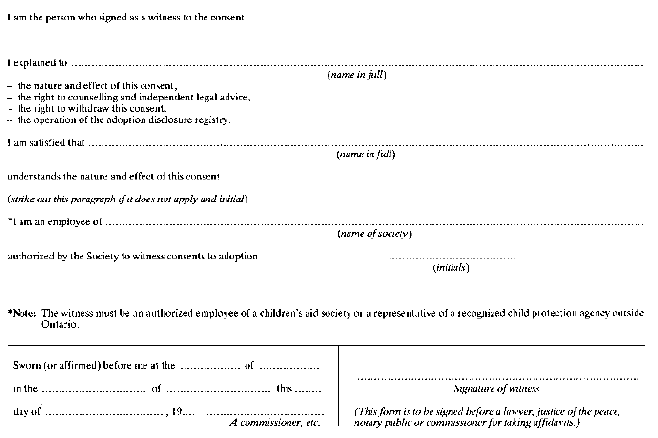
R.R.O. 1990, Reg. 199, Form 37.
FORM 38
Courts of Justice Act
AFFIDAVIT OF ADOPTING PARENT(S)
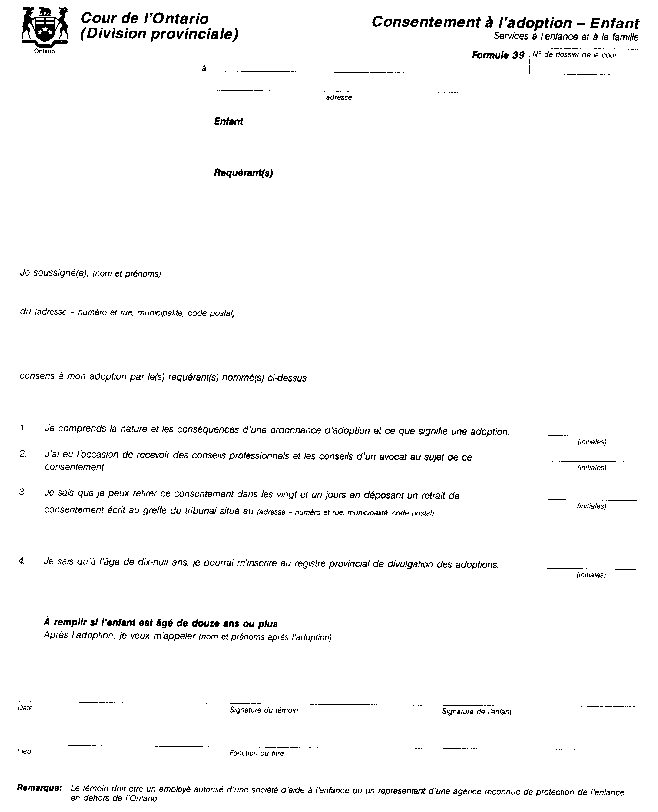
FORMULE 38
Loi sur les tribunaux judiciaires
AFFIDAVIT DE L’(DES) ADOPTANT(S)
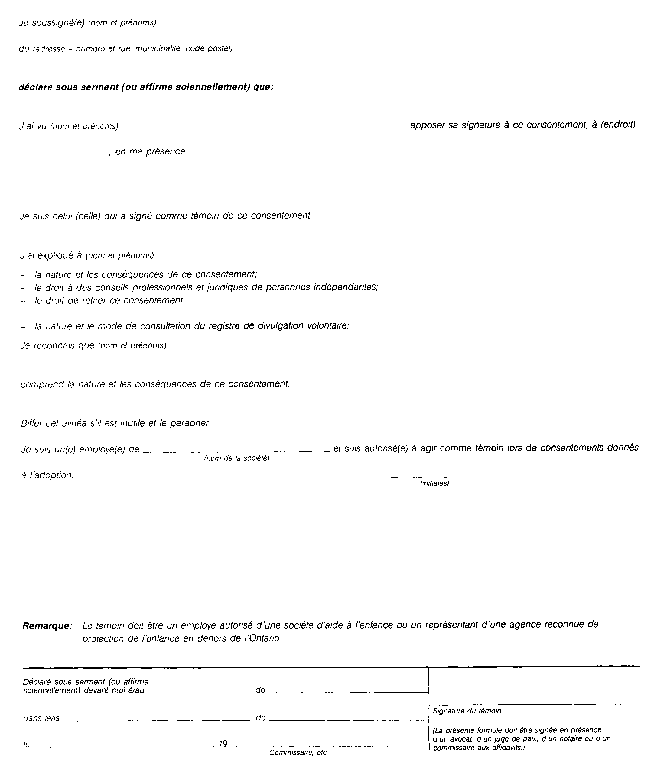
R.R.O. 1990, Reg. 199, Form 38.
FORM 39
Courts of Justice Act
CONSENT TO ADOPTION — CHILD
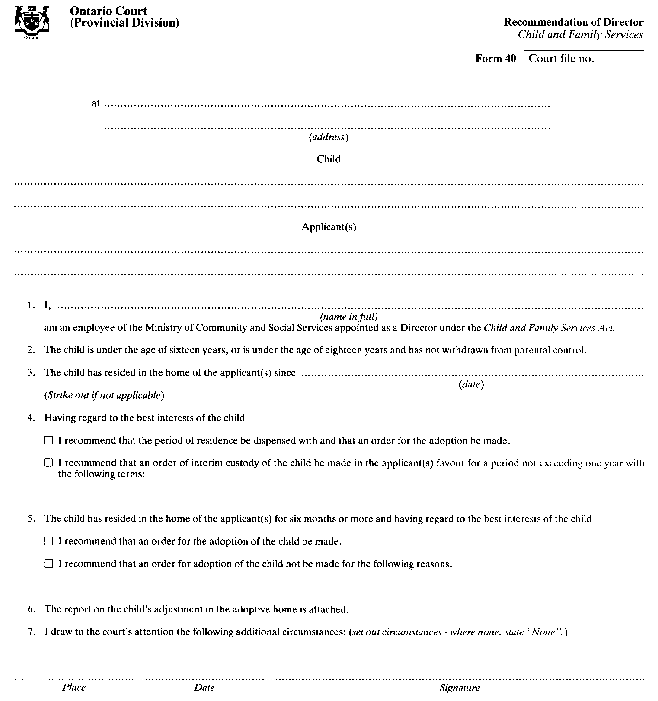
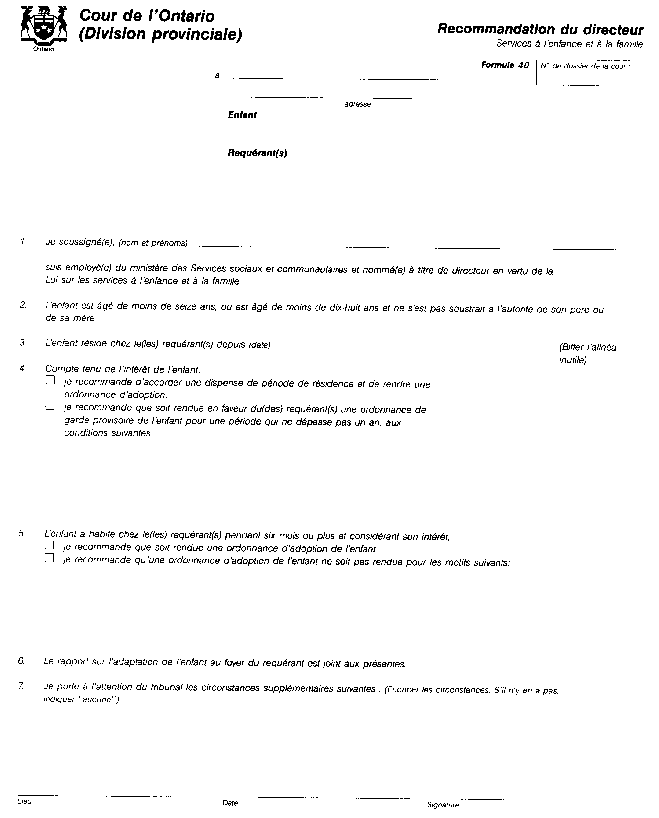
FORMULE 39
Loi sur les tribunaux judiciaires
CONSENTEMENT À L’ADOPTION — ENFANT
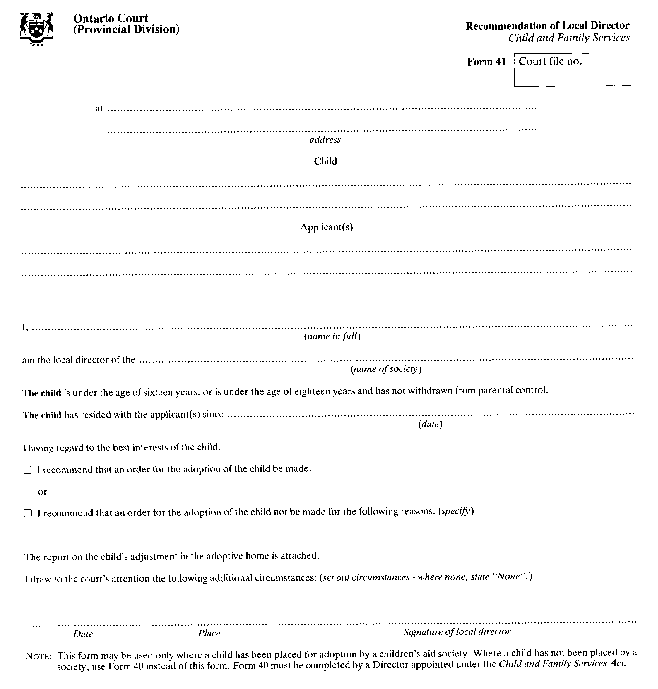
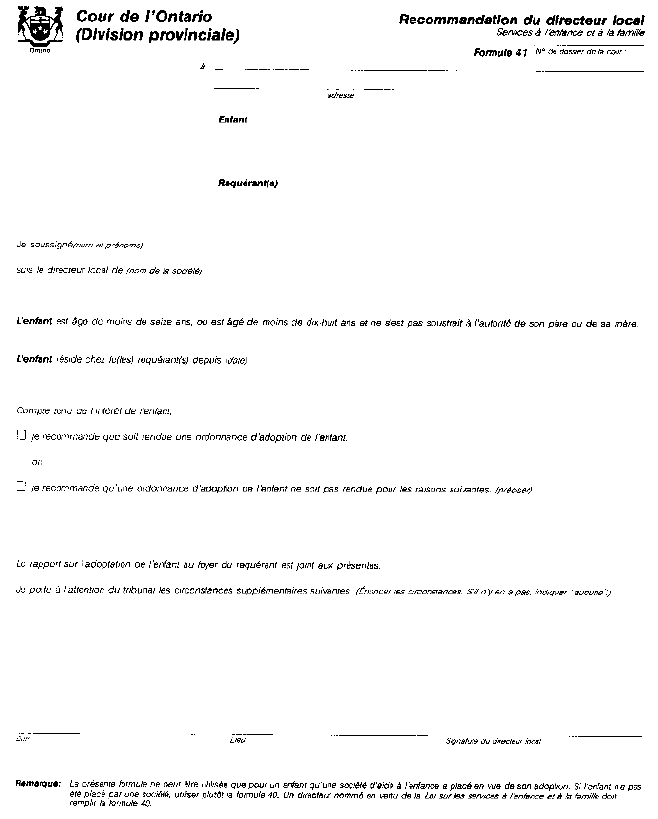
R.R.O. 1990, Reg. 199, Form 39.
FORM 40
Courts of Justice Act
RECOMMENDATION OF DIRECTOR
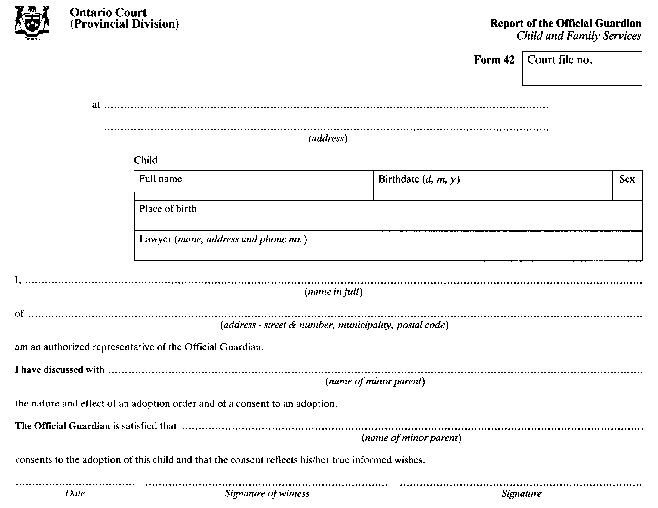
FORMULE 40
Loi sur les tribunaux judiciaires
RECOMMANDATION DU DIRECTEUR
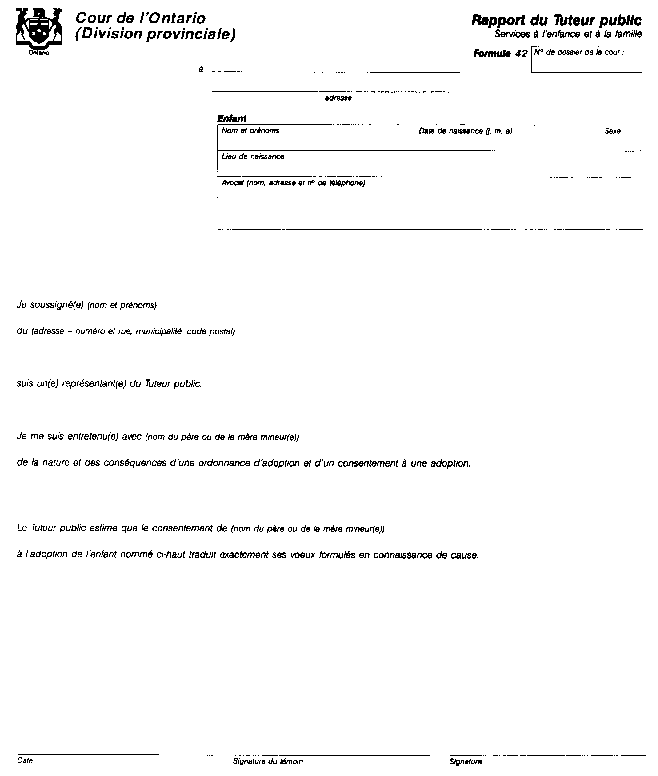
R.R.O. 1990, Reg. 199, Form 40.
FORM 41
Courts of Justice Act
RECOMMENDATION OF LOCAL DIRECTOR
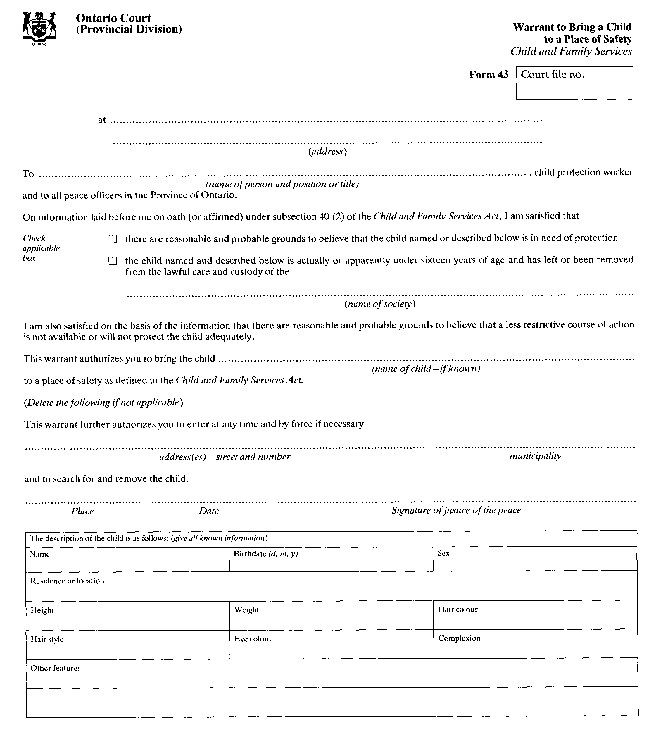
FORMULE 41
Loi sur les tribunaux judiciaires
RECOMMANDATION DU DIRECTEUR LOCAL
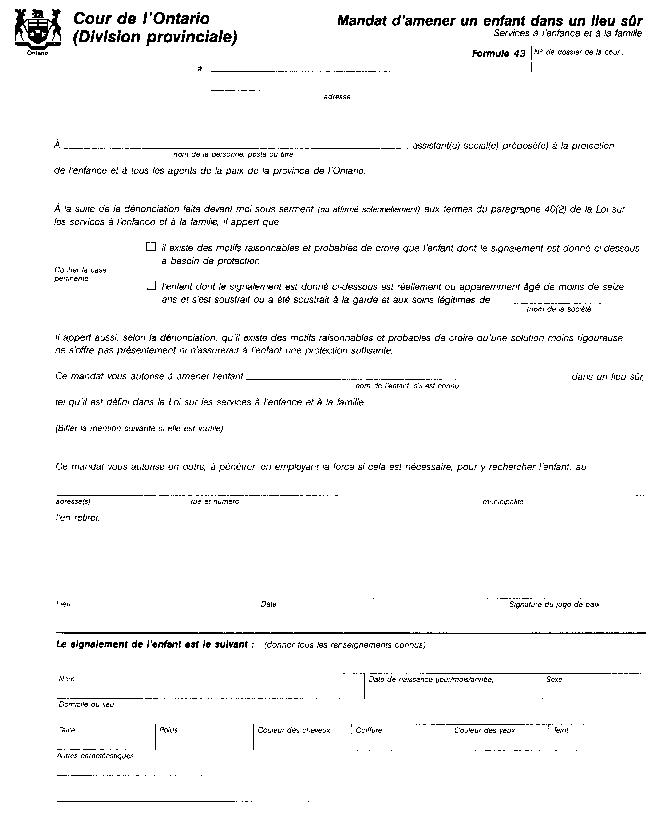
R.R.O. 1990, Reg. 199, Form 41.
FORM 42
Courts of Justice Act
REPORT OF THE OFFICIAL GUARDIAN
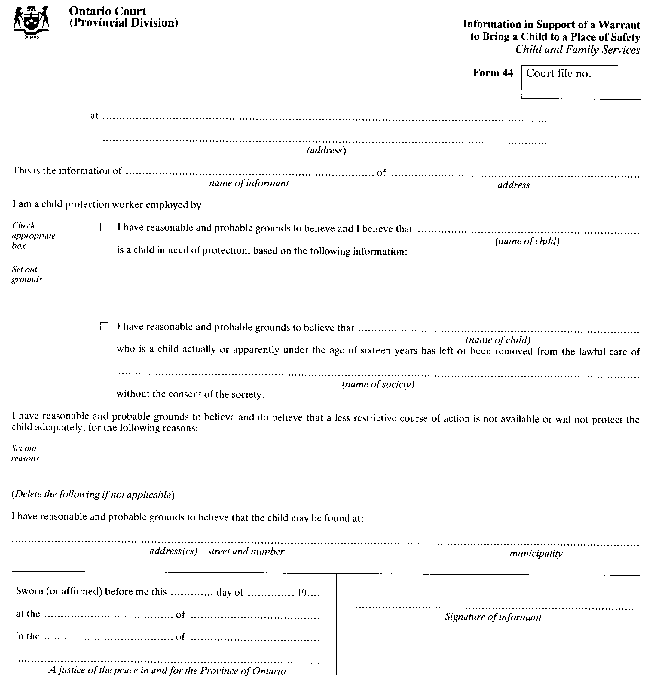
FORMULE 42
Loi sur les tribunaux judiciaires
RAPPORT DU TUTEUR PUBLIC
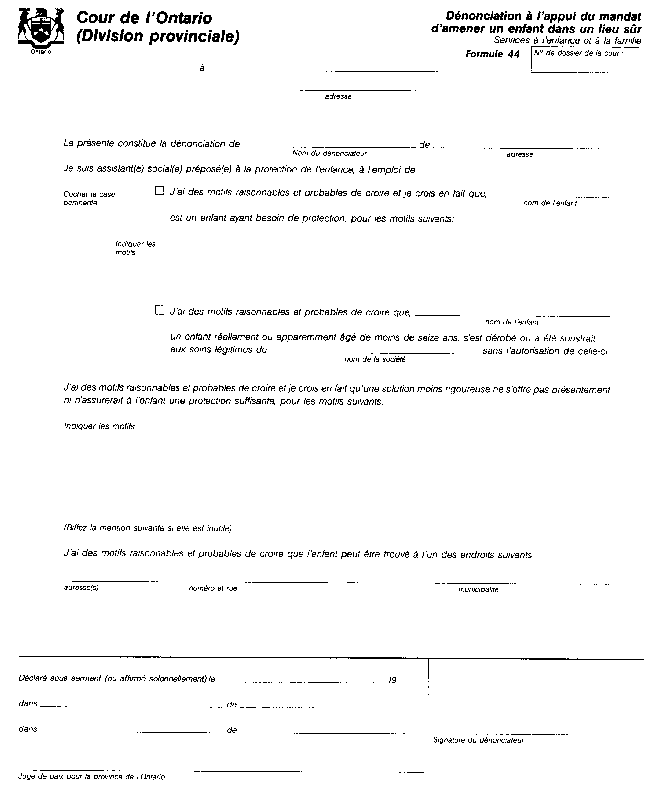
R.R.O. 1990, Reg. 199, Form 42.
FORM 43
Courts of Justice Act
WARRANT TO BRING A CHILD
TO A PLACE OF SAFETY
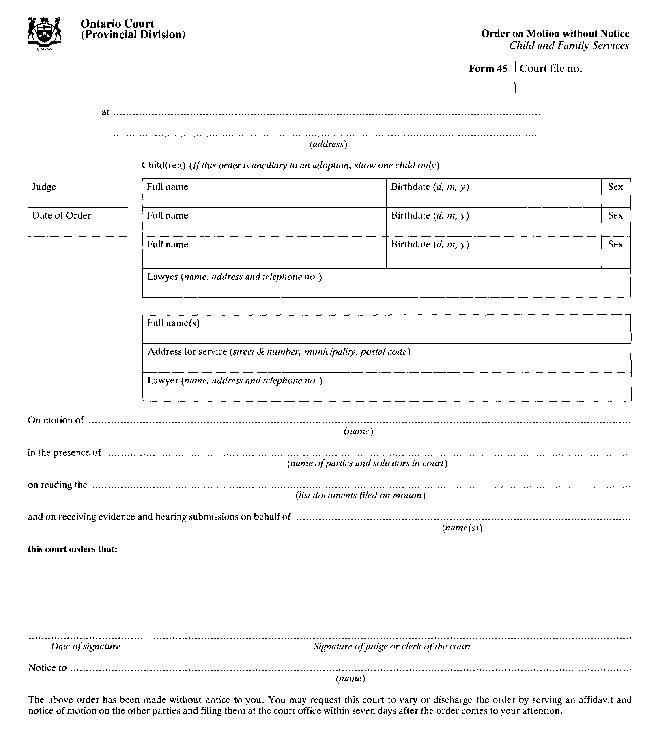
FORMULE 43
Loi sur les tribunaux judiciaires
MANDAT D’AMENER UN ENFANT DANS UN LIEU SÛR
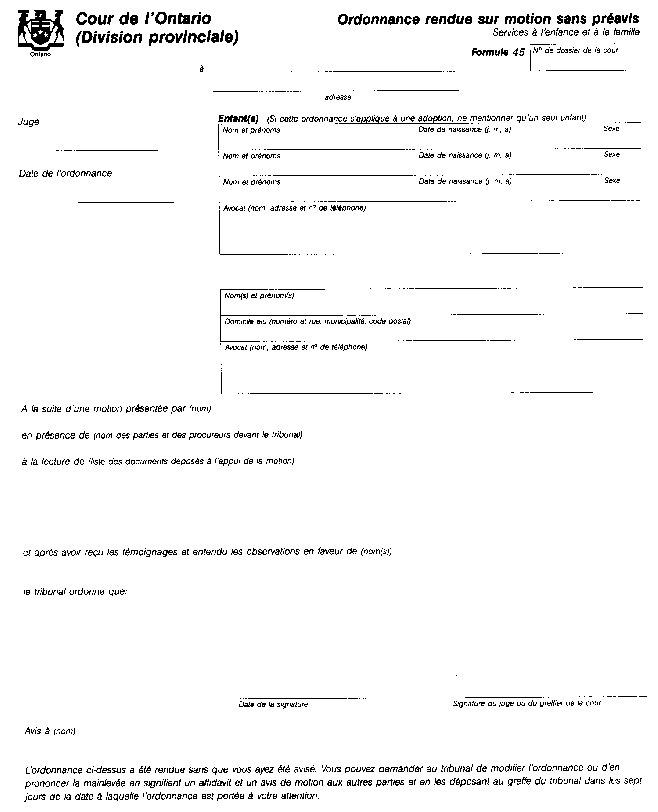
R.R.O. 1990, Reg. 199, Form 43.
FORM 44
Courts of Justice Act
INFORMATION IN SUPPORT OF A WARRANT
TO BRING A CHILD TO A PLACE OF SAFETY
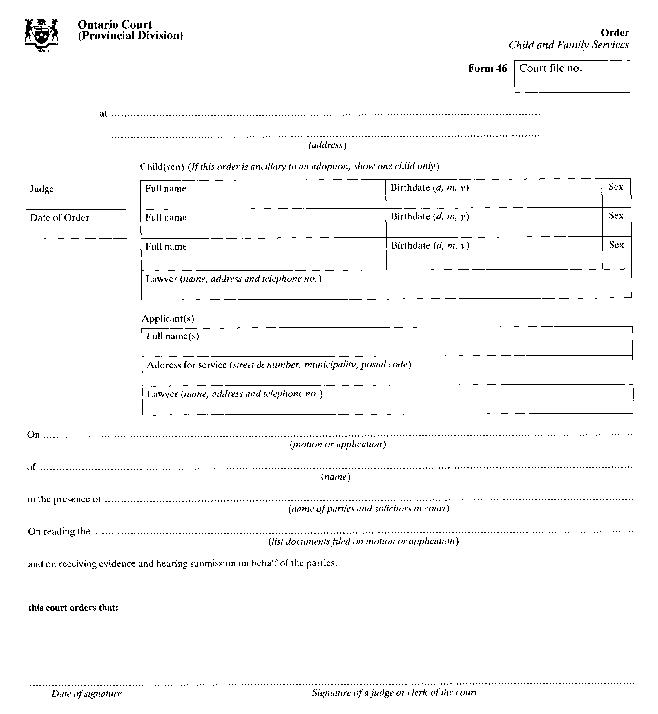
FORMULE 44
Loi sur les tribunaux judiciaires
DÉNONCIATION À L’APPUI DU MANDAT
D’AMENER UN ENFANT DANS UN LIEU SÛR
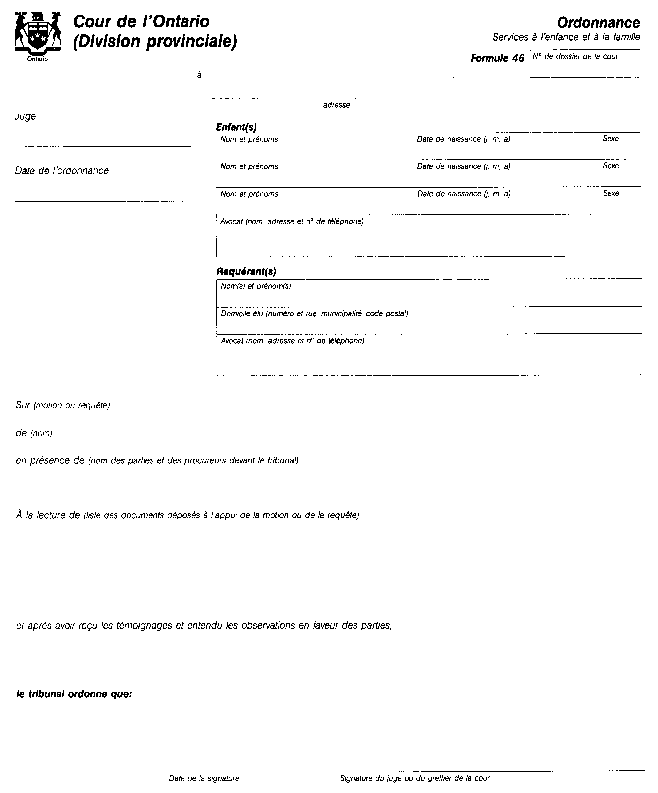
R.R.O. 1990, Reg. 199, Form 44.
FORM 45
Courts of Justice Act
ORDER ON MOTION WITHOUT NOTICE
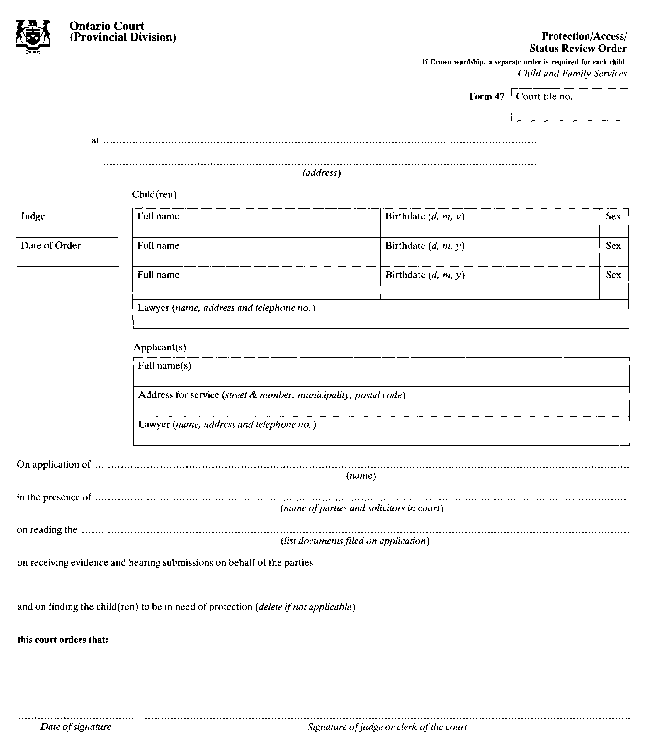
FORMULE 45
Loi sur les tribunaux judiciaires
ORDONNANCE RENDUE SUR MOTION SANS PRÉAVIS
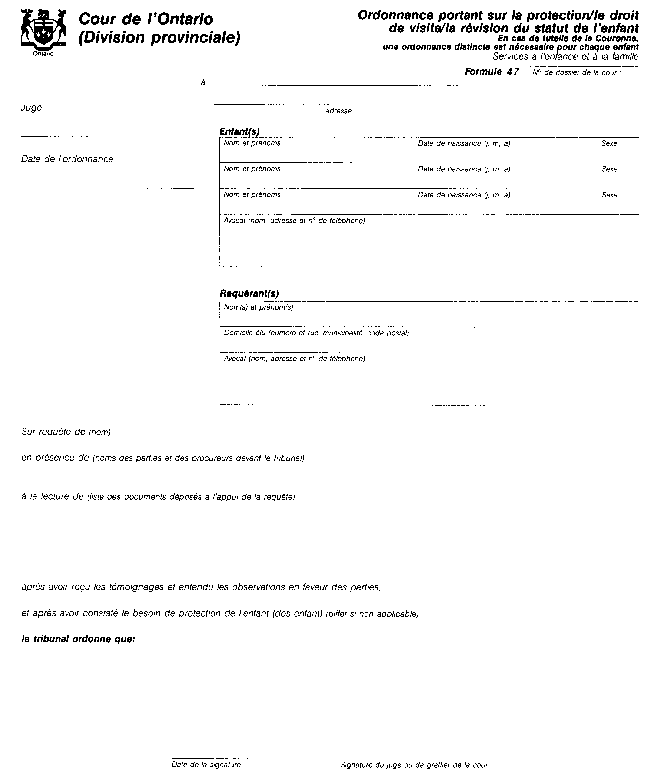
R.R.O. 1990, Reg. 199, Form 45.
FORM 46
Courts of Justice Act
ORDER
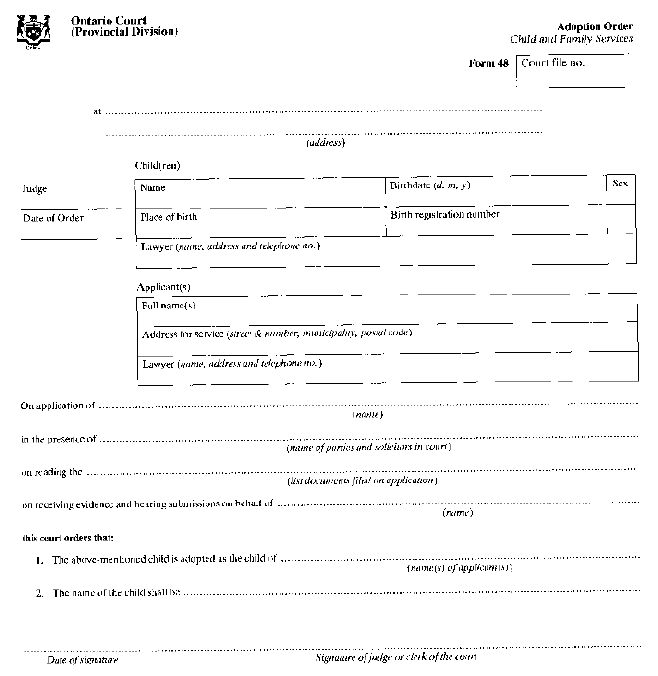
FORMULE 46
Loi sur les tribunaux judiciaires
ORDONNANCE
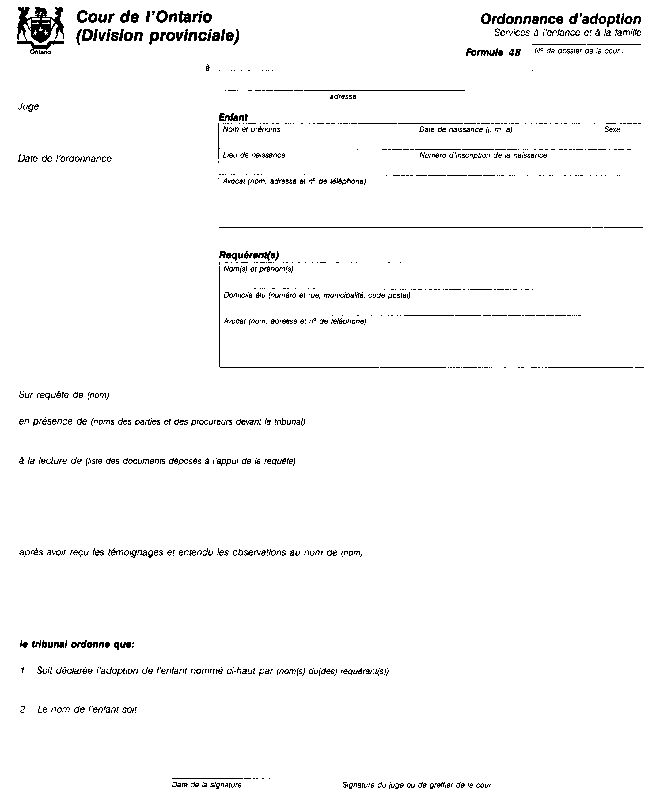
R.R.O. 1990, Reg. 199, Form 46.
FORM 47
Courts of Justice Act
PROTECTION/ACCESS/
STATUS REVIEW ORDER
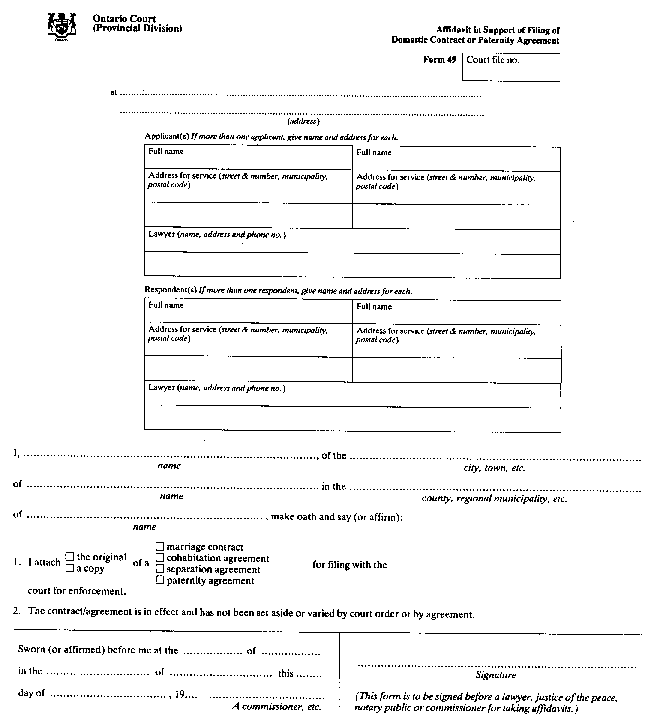
FORMULE 47
Loi sur les tribunaux judiciaires
ORDONNANCE PORTANT SUR LA PROTECTION/LE DROIT
DE VISITE/LA RÉVISION DU STATUT DE L’ENFANT
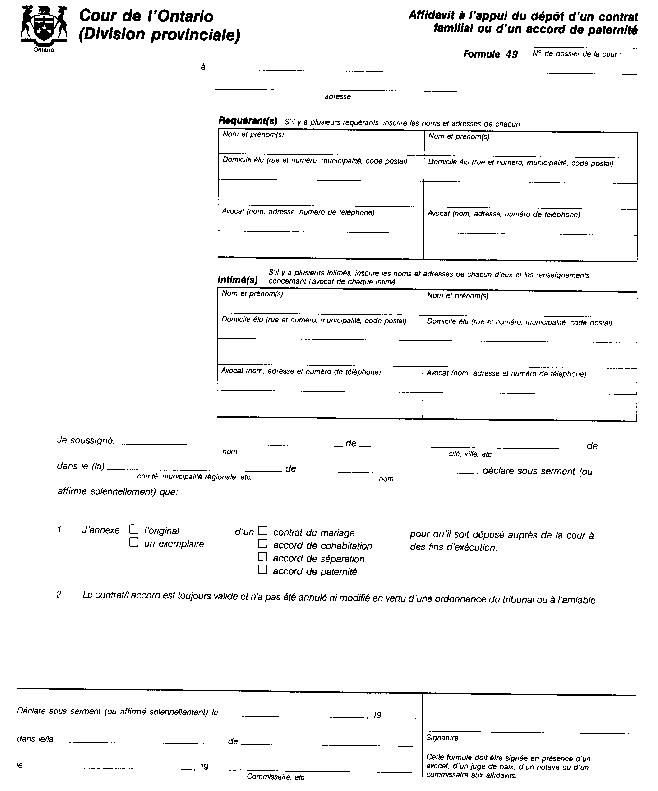
R.R.O. 1990, Reg. 199, Form 47.
FORM 48
Courts of Justice Act
ADOPTION ORDER
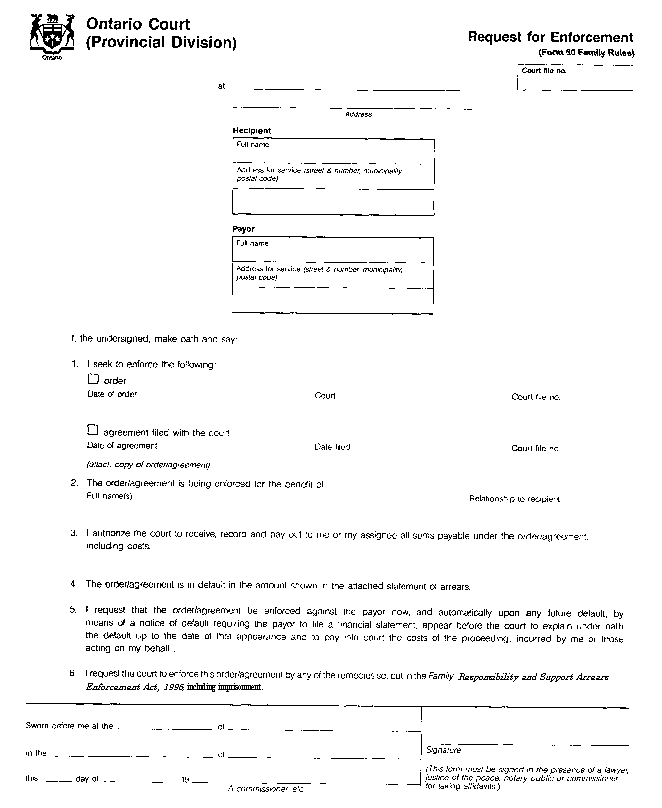
FORMULE 48
Loi sur les tribunaux judiciaires
ORDONNANCE D’ADOPTION
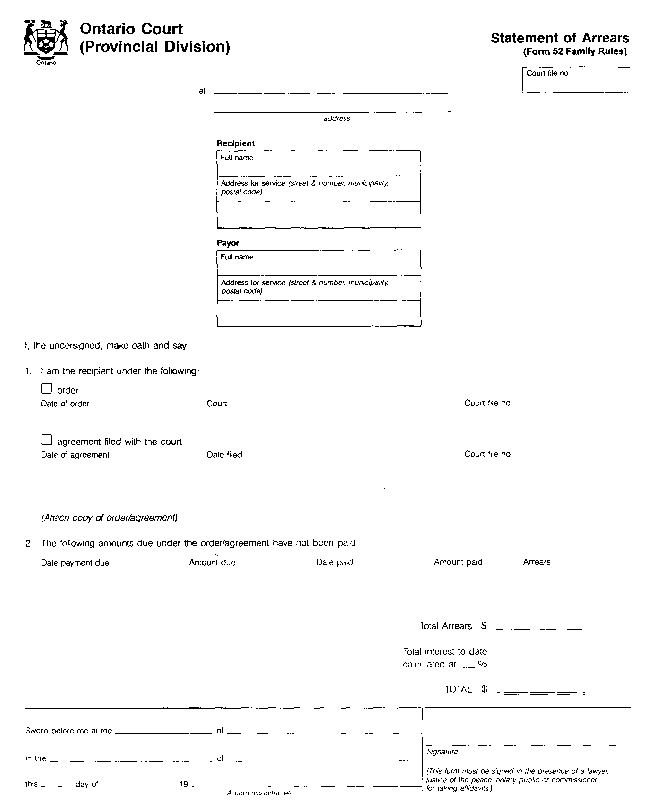
R.R.O. 1990, Reg. 199, Form 48.
FORM 49
Courts of Justice Act
AFFIDAVIT IN SUPPORT OF FILING OF
DOMESTIC CONTRACT OR PATERNITY AGREEMENT
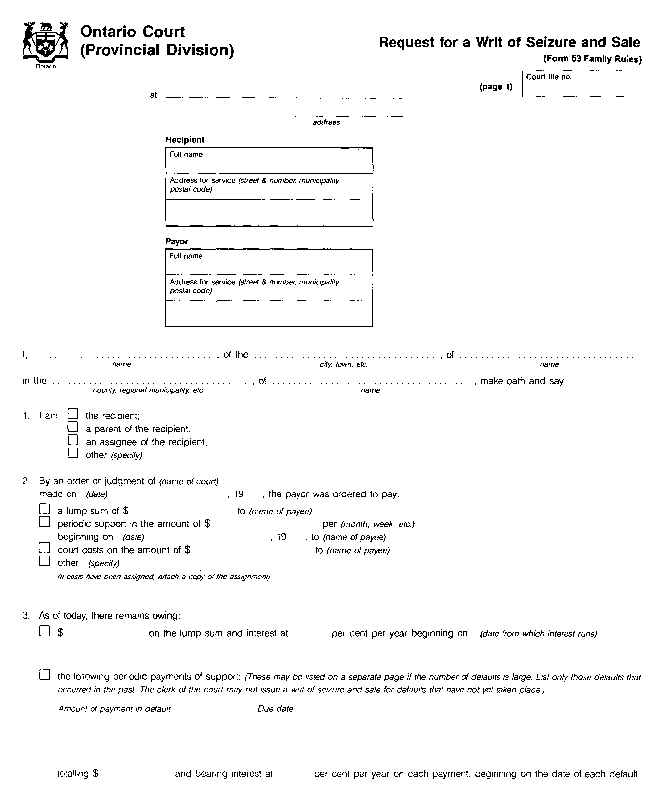
FORMULE 49
Loi sur les tribunaux judiciaires
AFFIDAVIT À L’APPUI DU DÉPÔT D’UN CONTRAT
FAMILIAL OU D’UN ACCORD DE PATERNITÉ
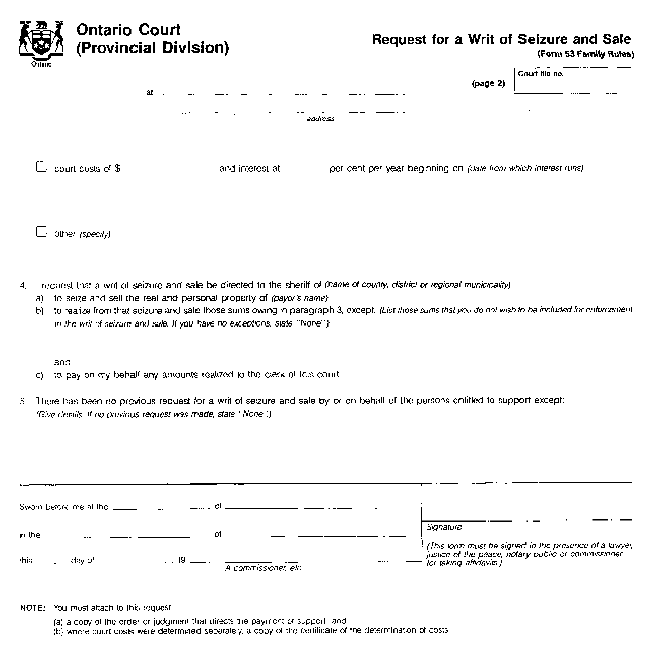
R.R.O. 1990, Reg. 199, Form 49.
FORM 50
Courts of Justice Act
REQUEST FOR ENFORCEMENT
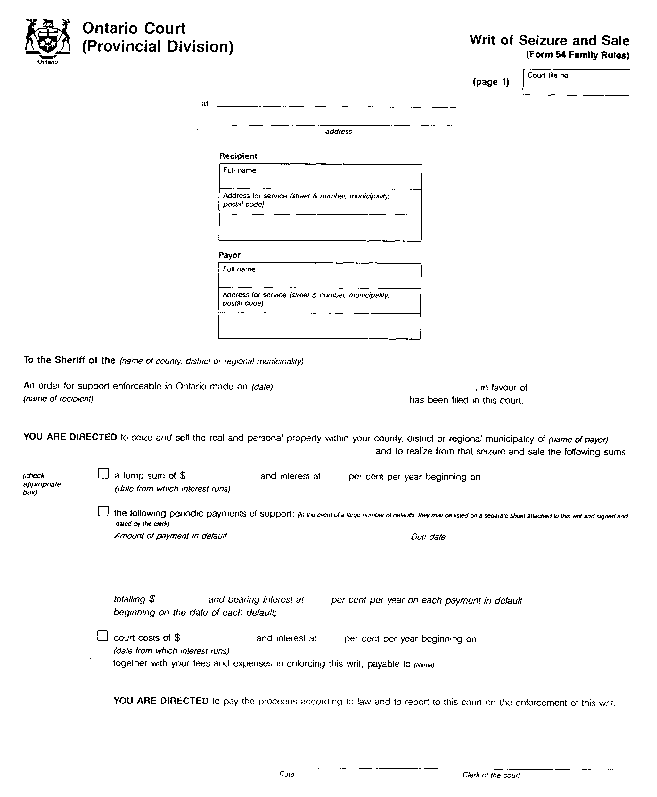
O. Reg. 71/92, s. 7; O. Reg. 293/98, s. 11.
FORM 51 REVOKED: O. REG. 71/92, S. 8.
FORM 52
Courts of Justice Act
STATEMENT OF ARREARS
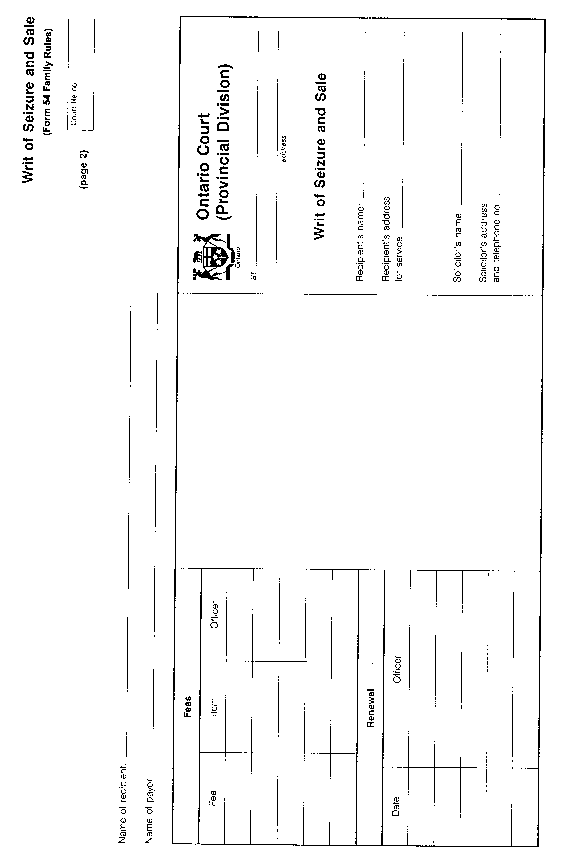
O. Reg. 71/92, s. 9.
FORM 53
Courts of Justice Act
REQUEST FOR A WRIT OF SEIZURE AND SALE
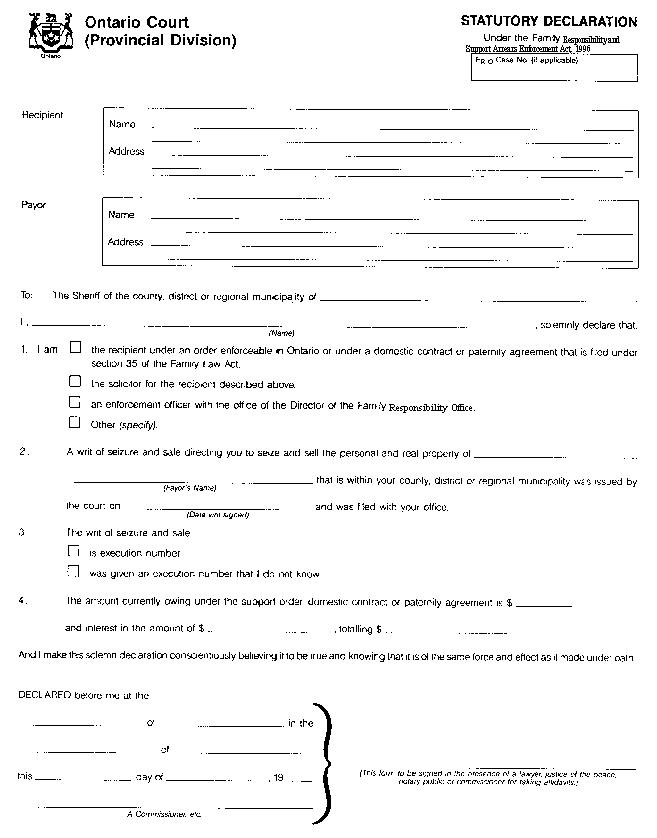
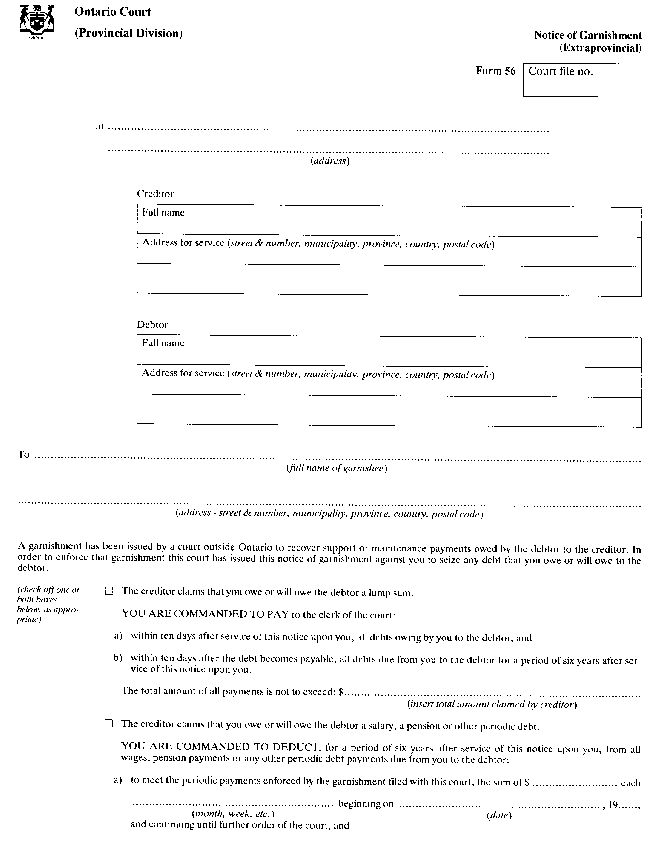
O. Reg. 71/92, s. 10.
FORM 54
Courts of Justice Act
WRIT OF SEIZURE AND SALE
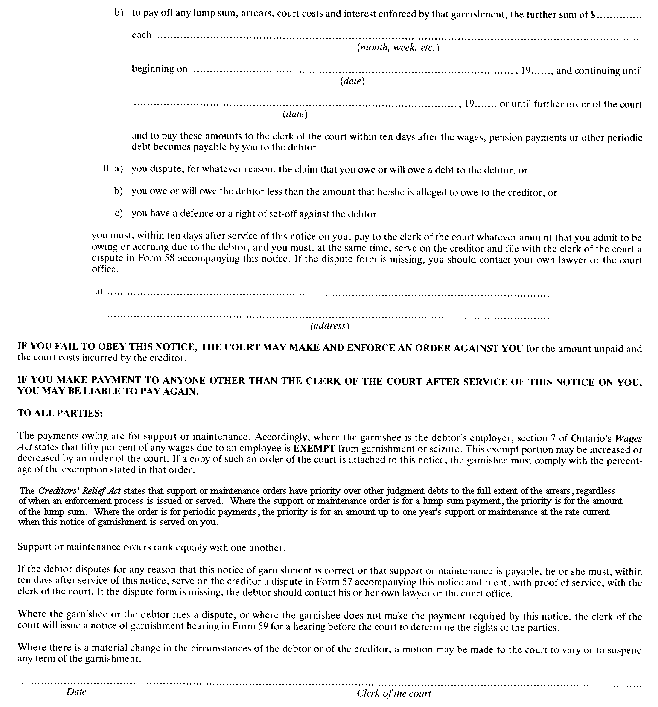
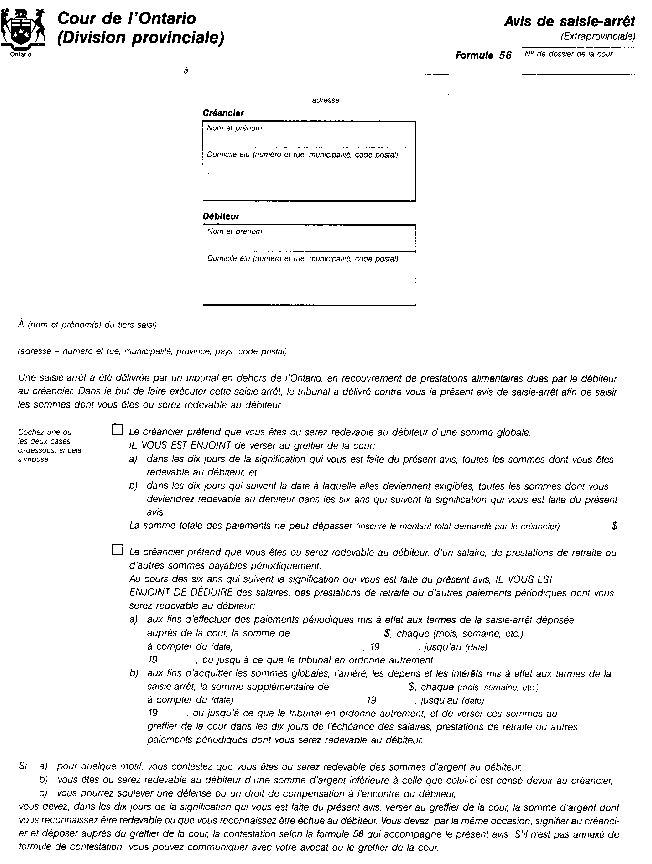
O. Reg. 71/92, s. 11.
FORM 55
Courts of Justice Act
STATUTORY DECLARATION
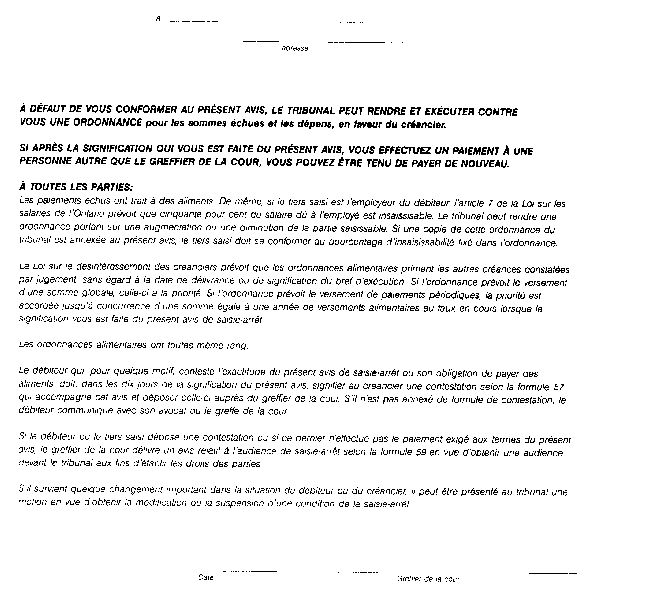
O. Reg. 71/92, s. 12; O. Reg. 293/98, s. 12.
FORM 56
Courts of Justice Act
NOTICE OF GARNISHMENT
(EXTRAPROVINCIAL)
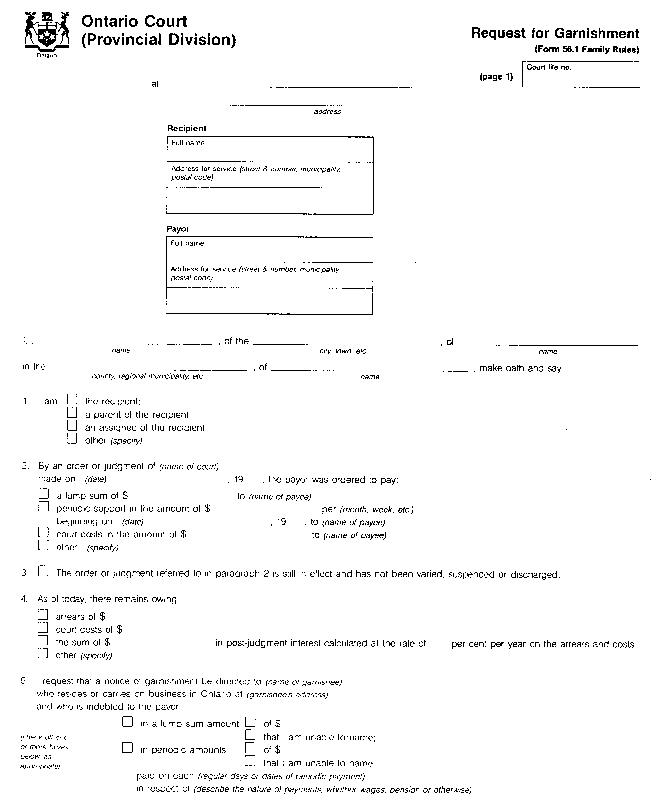
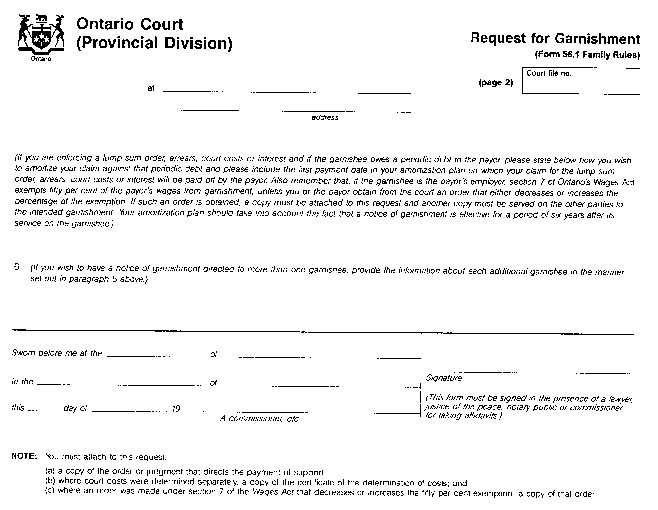
FORMULE 56
Loi sur les tribunaux judiciaires
AVIS DE SAISIE-ARRÊT
(EXTRAPROVINCIALE)
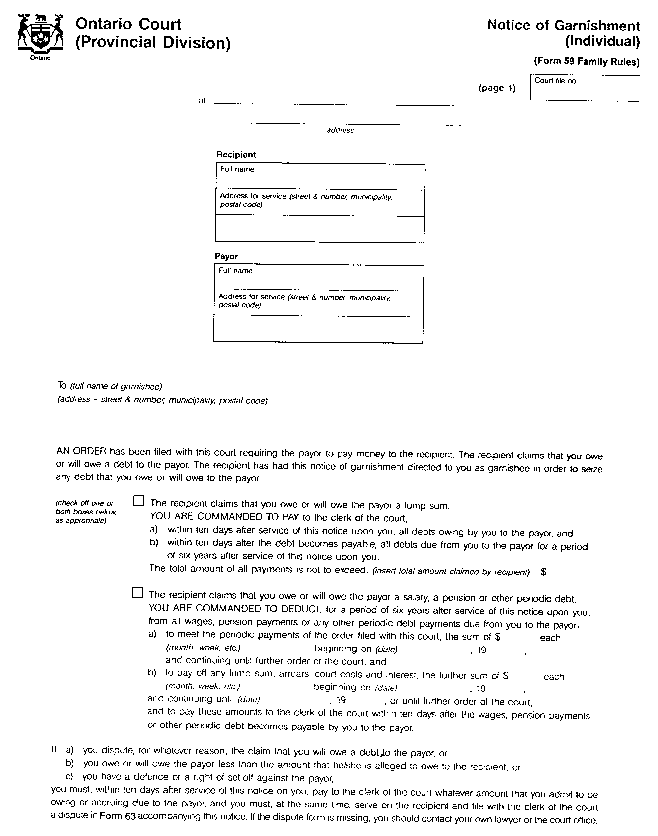
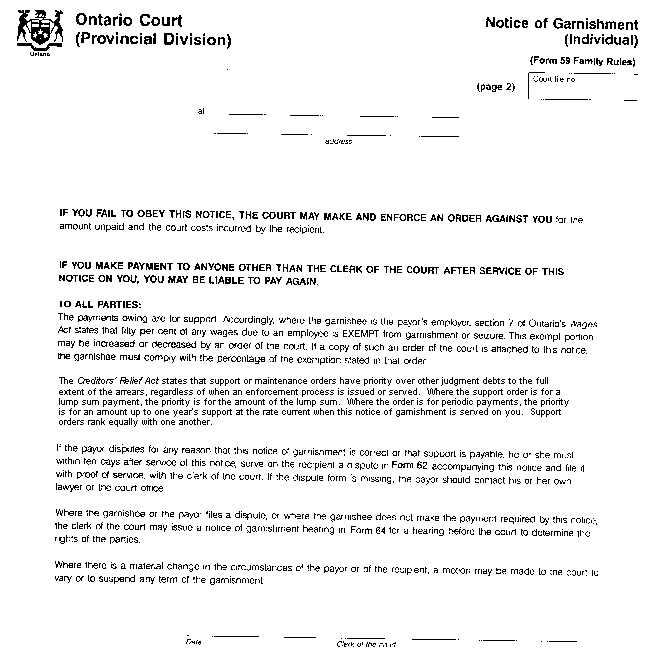
R.R.O. 1990, Reg. 199, Form 56; O. Reg. 293/98, s. 13.
FORM 56.1
Courts of Justice Act
REQUEST FOR GARNISHMENT
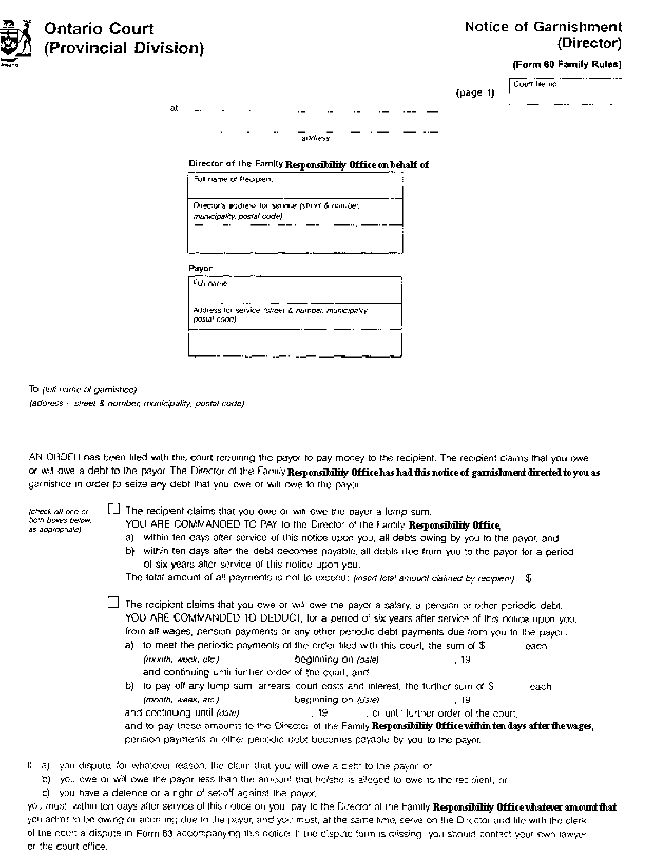
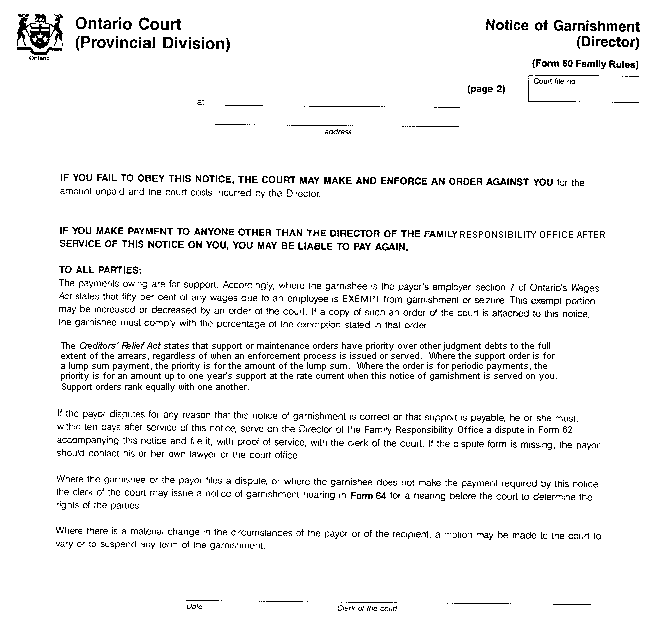
O. Reg. 71/92, s. 13.
FORMS 57, 58 REVOKED: O. REG. 71/92, S. 14.
FORM 59
Courts of Justice Act
NOTICE OF GARNISHMENT
(INDIVIDUAL)
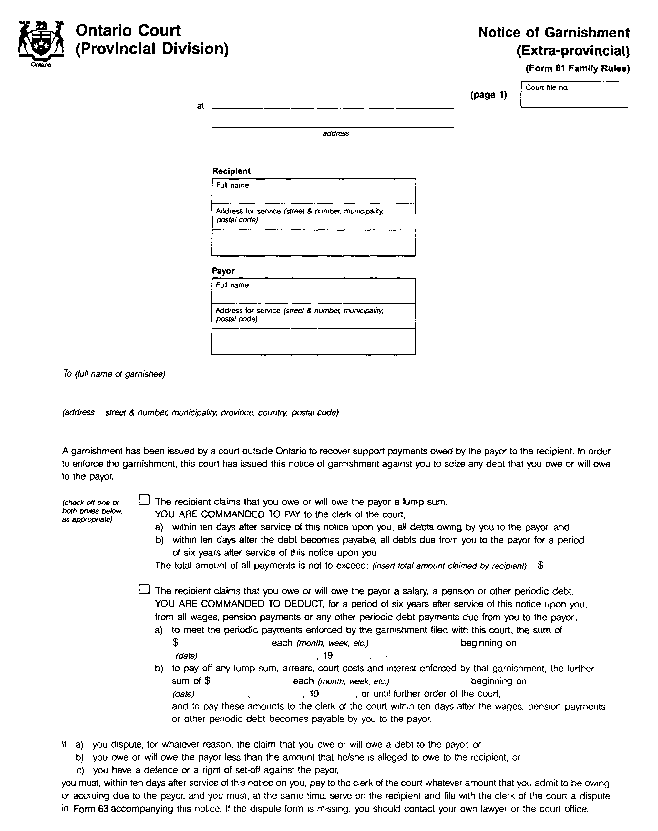
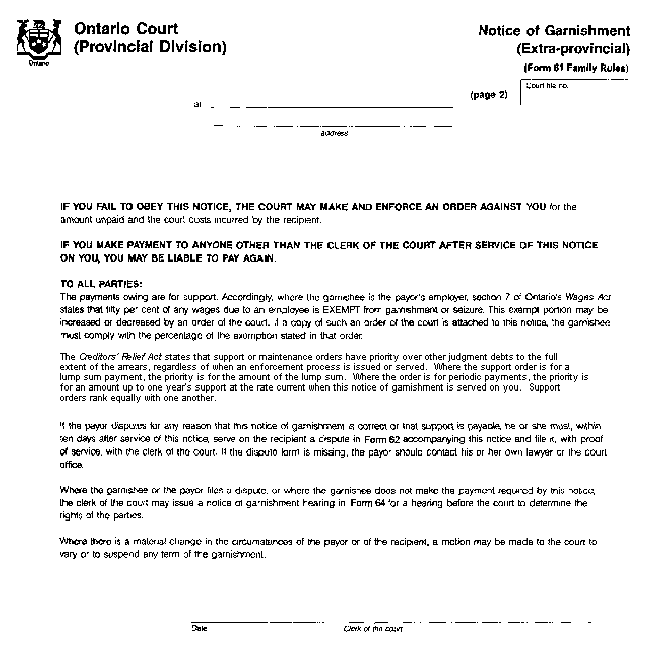
O. Reg. 71/92, s. 15; O. Reg. 293/98, s. 14.
FORM 60
Courts of Justice Act
NOTICE OF GARNISHMENT
(DIRECTOR)
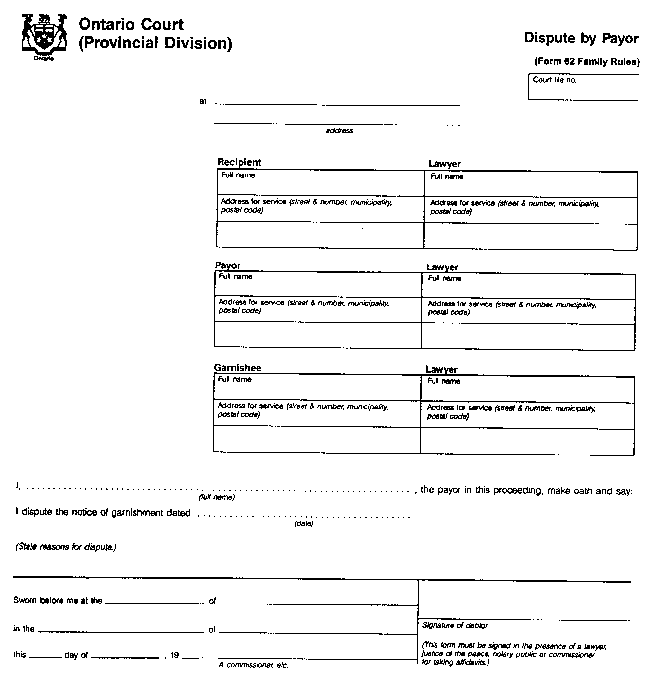
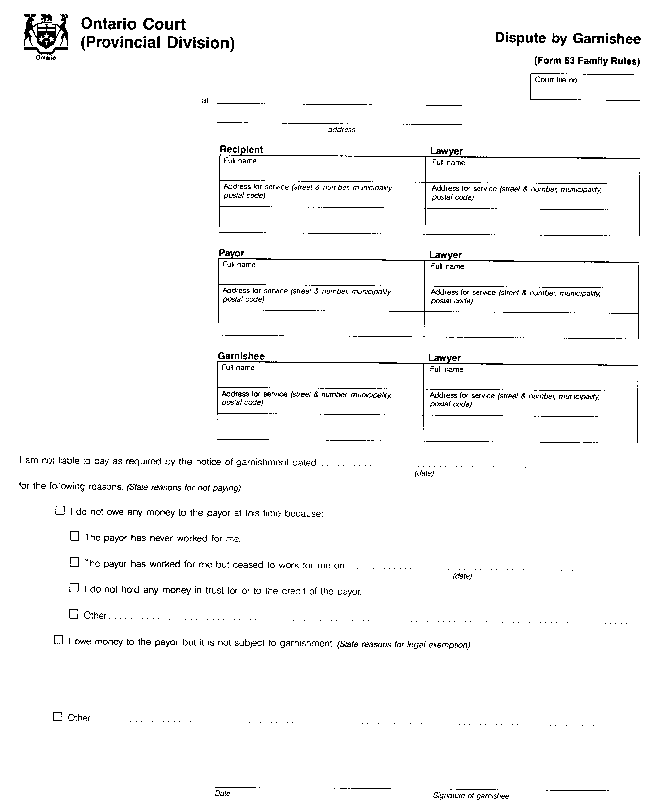
O. Reg. 71/92, s. 16; O. Reg. 293/98, s. 15.
FORM 61
Courts of Justice Act
NOTICE OF GARNISHMENT
(EXTRA-PROVINCIAL)
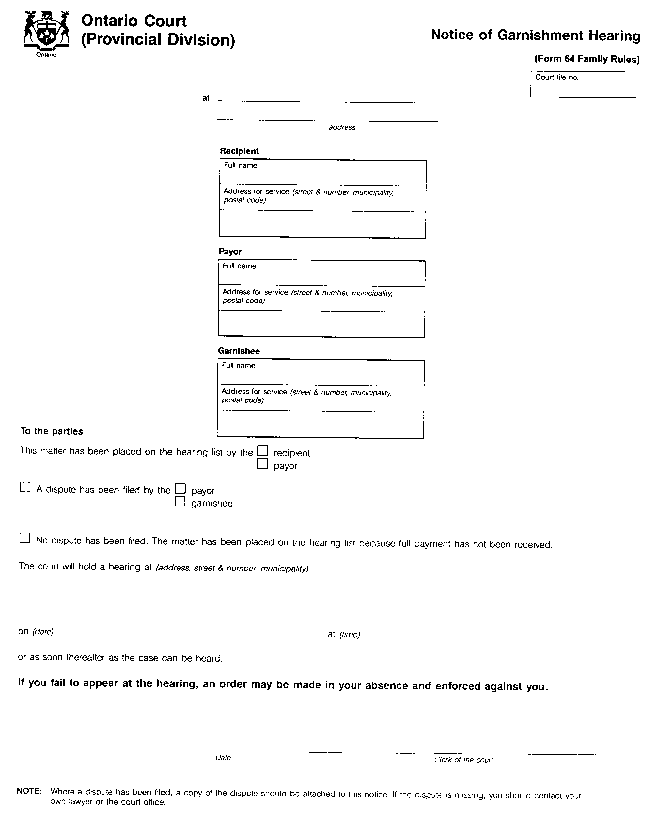
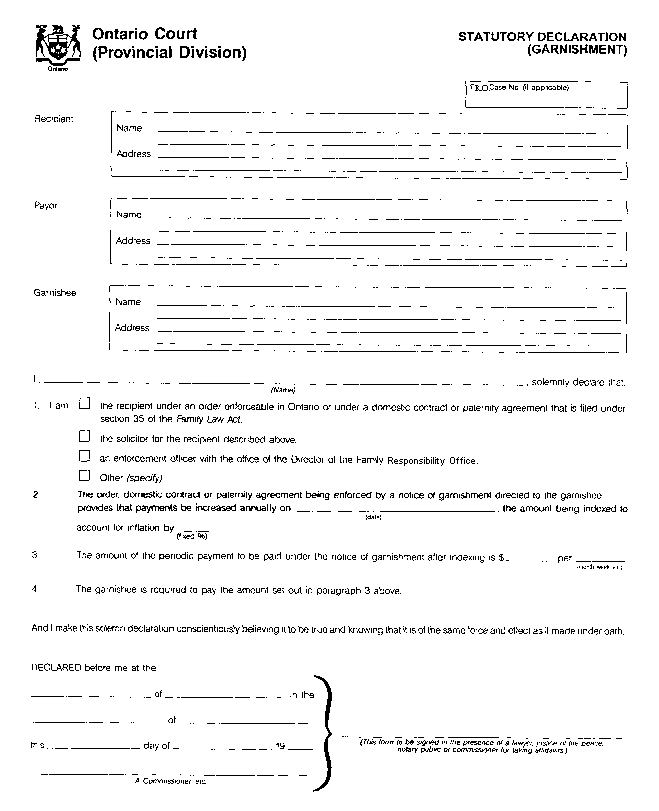
O. Reg. 71/92, s. 17; O. Reg. 293/98, s. 16.
FORM 62
Courts of Justice Act
DISPUTE BY PAYOR
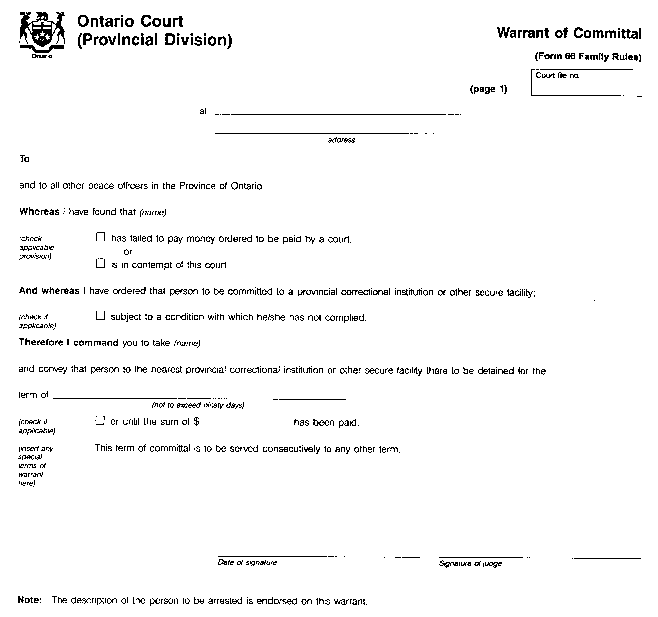
O. Reg. 71/92, s. 18.
FORM 63
Courts of Justice Act
DISPUTE BY GARNISHEE
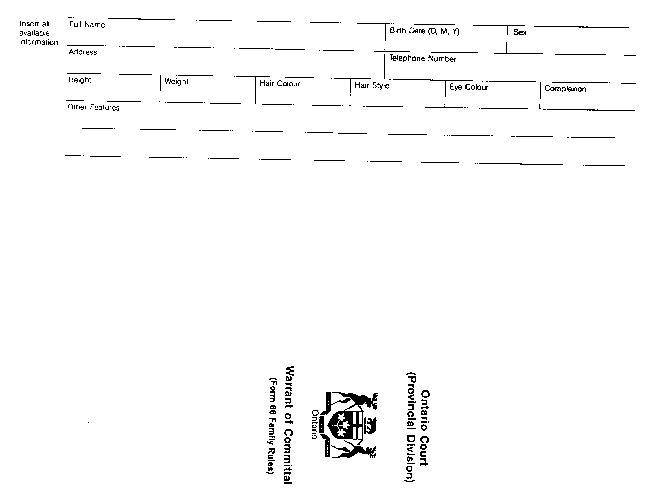
O. Reg. 71/92, s. 19.
FORM 64
Courts of Justice Act
NOTICE OF GARNISHMENT HEARING
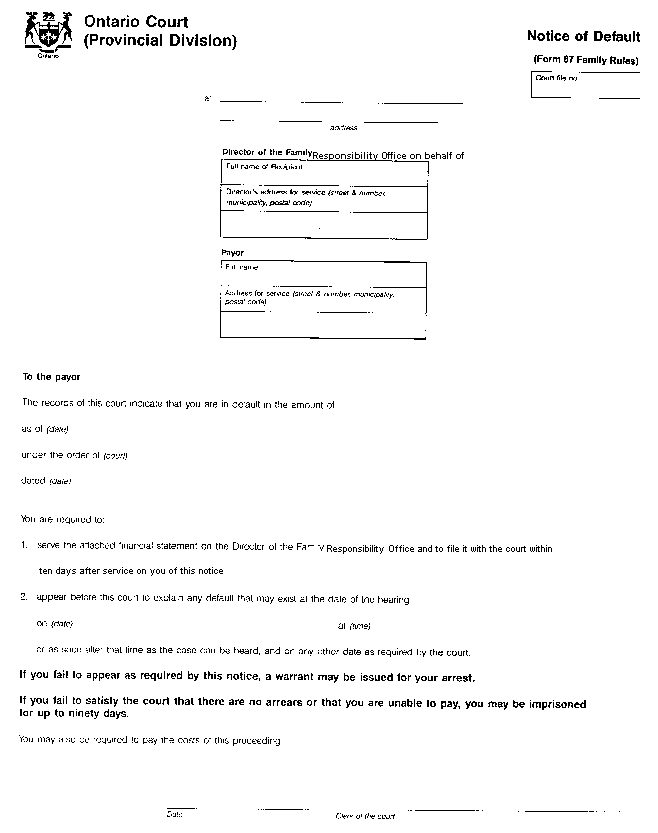
O. Reg. 71/92, s. 20.
FORM 65
Courts of Justice Act
STATUTORY DECLARATION
(GARNISHMENT)
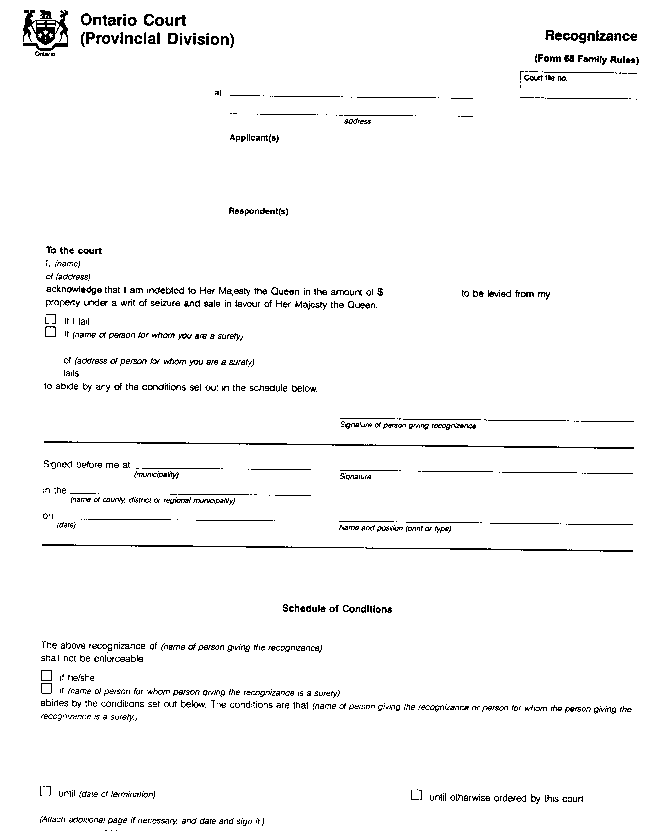
O. Reg. 71/92, s. 20; O. Reg. 293/98, s. 17.
FORM 66
Courts of Justice Act
WARRANT OF COMMITTAL
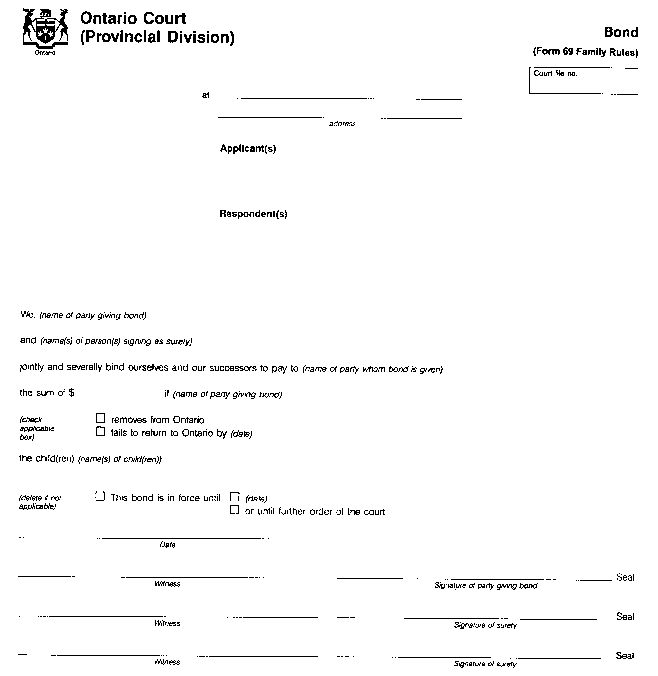
O. Reg. 71/92, s. 20.
FORM 67
Courts of Justice Act
NOTICE OF DEFAULT
O. Reg. 71/92, s. 20; O. Reg. 293/98, s. 18.
FORM 67.1
Courts of Justice Act
NOTICE OF DEFAULT
Ontario Court (Provincial Division) |
Notice of Default (Form 67.1 Family Rules) |
Court File Number
at address |
Recipient
Full name |
Address for service (street & number, municipality, postal code) |
Payor
Full name |
Address for service (street & number, municipality, postal code) |
To the payor
The records of this court indicate that you are in default in the amount of
as of
(date)
under the order of (court)
dated
(date)
You are required to:
1. file the attached financial statement with the court at within ten days after service on you of this notice
2. appear before this court to explain any default that may exist at the date of the hearing on
(date) |
at (time) |
|
|||
the case can be heard, and on any other date as required by the court. | |||||
If you fail to appear as required by this notice, a warrant may be issued for your arrest.
If you fail to satisfy the court that there are not arrears or that you are unable to pay, you may be imprisoned for up to ninety days.
You may also be required to pay the costs of this proceeding.
|
Clerk of the court |
FORMULE 67.1
Loi sur les tribunaux judiciaires
AVIS DE DÉFAUT
Cour de l’Ontario (Division provinciale) |
Avis de défaut (Formule 67.1 Règles en droit de la famille) |
No de dossier de la cour :
à adresse |
Récipiendaire
Nom et prénom(s) |
Domicile élu (numéro et rue, municipalité, code postal) |
Payeur
Nom et prénom(s) |
Domicile élu (numéro et rue, municipalité, code postal) |
À l’intention du payeur
Les dossiers de la cour indiquent un défaut de paiement égal à
au
(date)
en contravention de l’ordonnance de (nom de la cour)
datée du
(date)
Il vous est enjoint de :
1. déposer l’état financier ci-annexé auprès de la cour à
dans les dix jours de la signification qui vous est faire du présent avis.
2. vous présenter devant le tribunal pour expliquer les motifs du défaut à la date de votre comparution le
(date) |
at (heures) |
||||
ou après cette date, dès que la cause pourra être entendue. | |||||
Si vous faites défaut de comparaître, conformément au present avis, un mandat d’arrestation peut être décerné contre vous.
Si vous n’établissez pas à la satisfaction du tribunal qu’il n’y a pas d’arriéré ou que vous êtes dans l’impossibilité de payer, vous pouvez être incarcéré pour une période maximale de quatre-vingt-dix jours.
Vous pouvez aussi être requis d’acquitter les frais de l’instance.
|
Greffier de la cour |
O. Reg. 293/98, s. 19.
FORM 68
Courts of Justice Act
RECOGNIZANCE
O. Reg. 71/92, s. 20.
FORM 69
Courts of Justice Act
BOND
O. Reg. 71/92, s. 20.